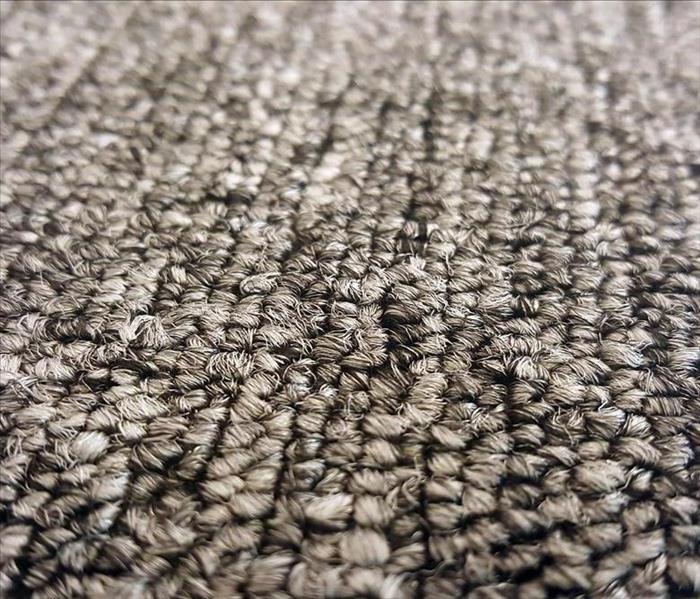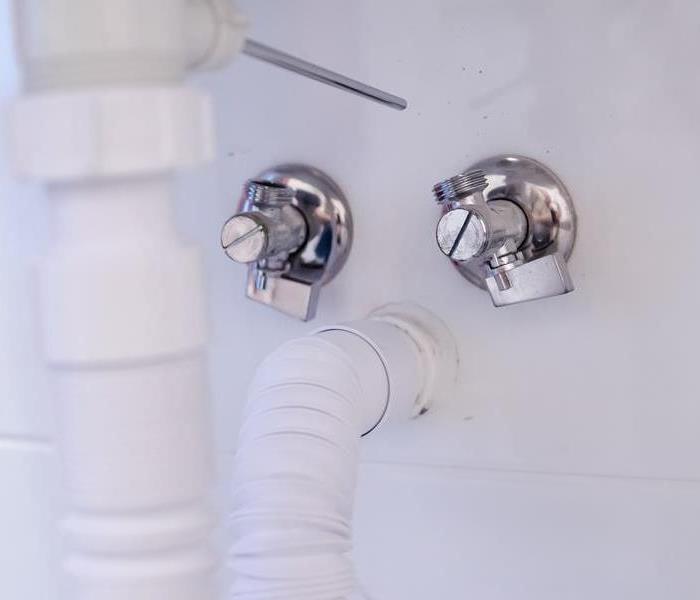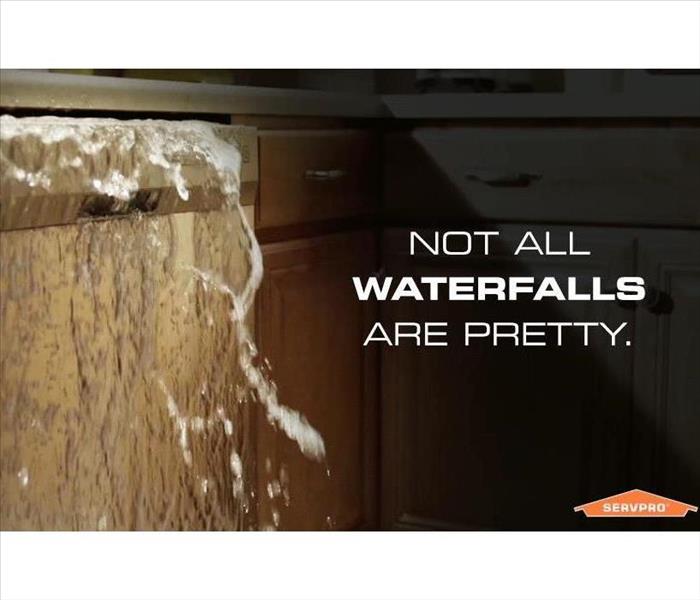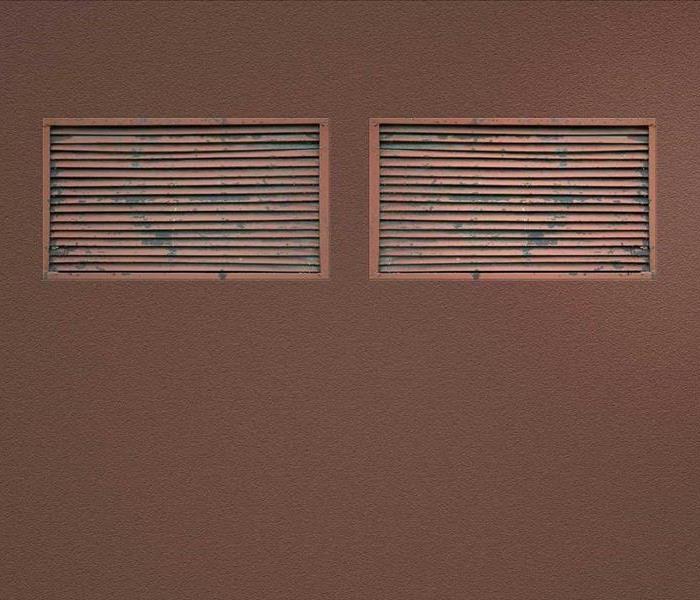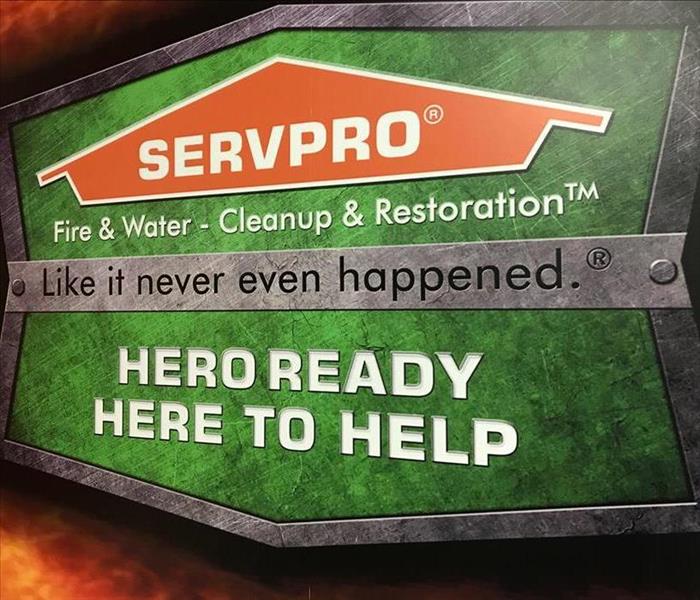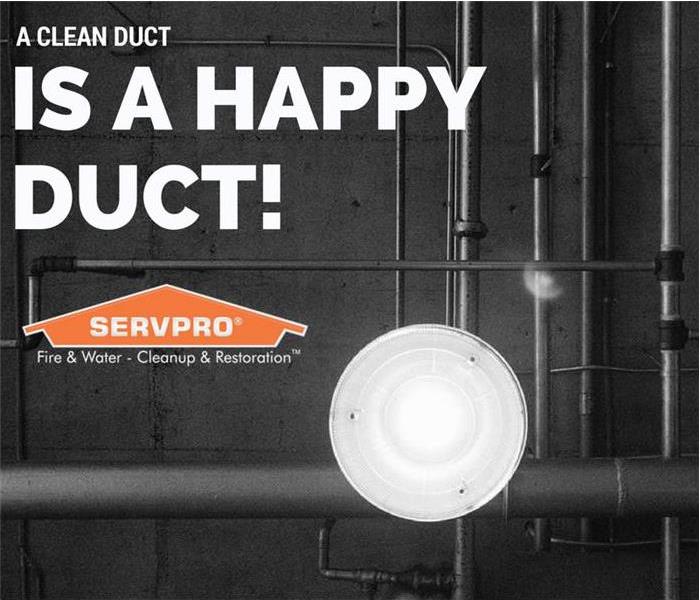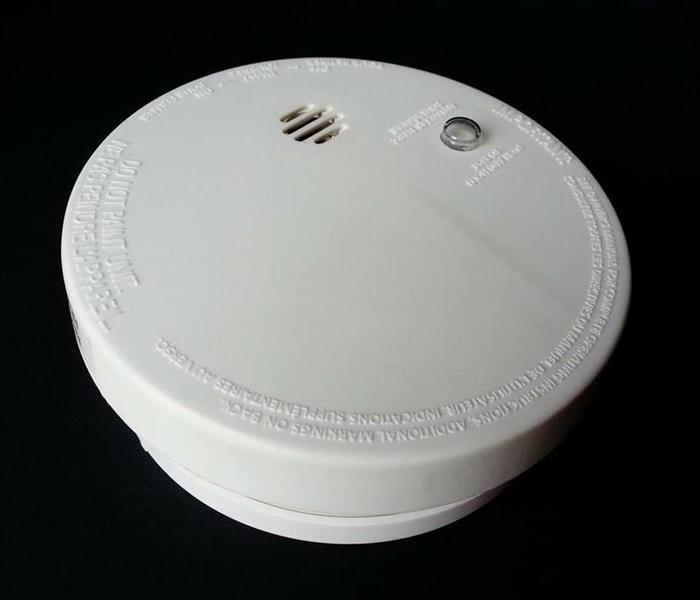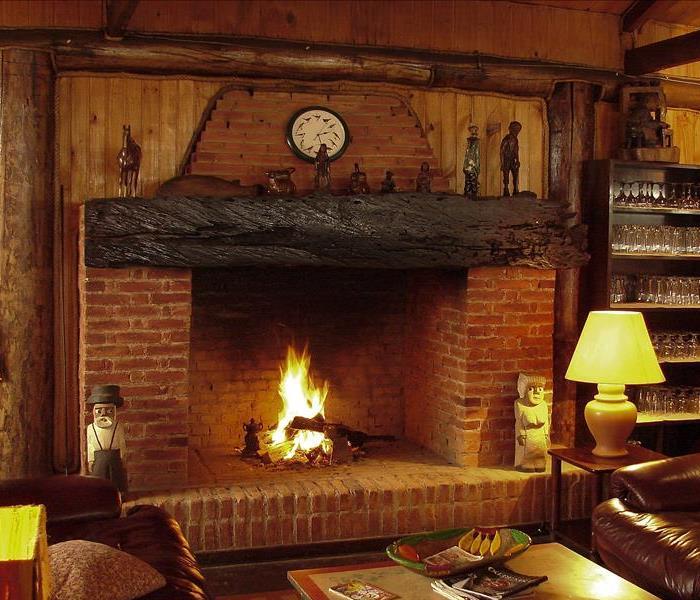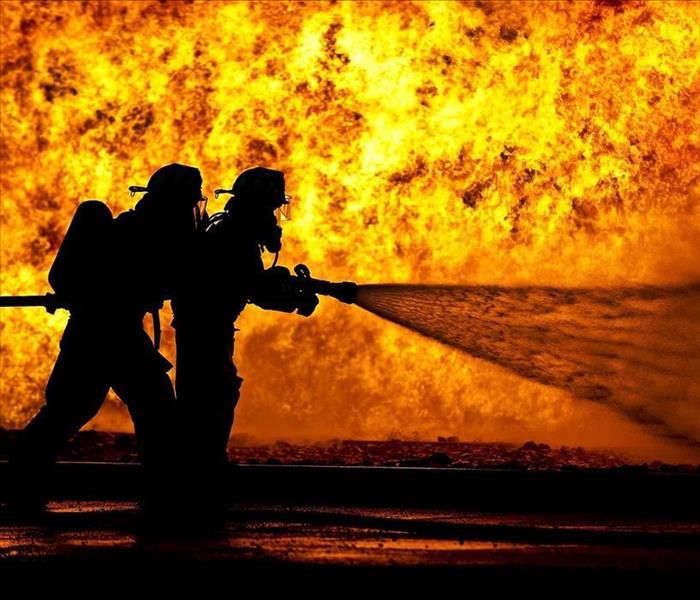Archived Blog Posts
Fire Damage Restoration in Greenville, NC: How to Choose the Right Service Provider
3/20/2023 (Permalink)
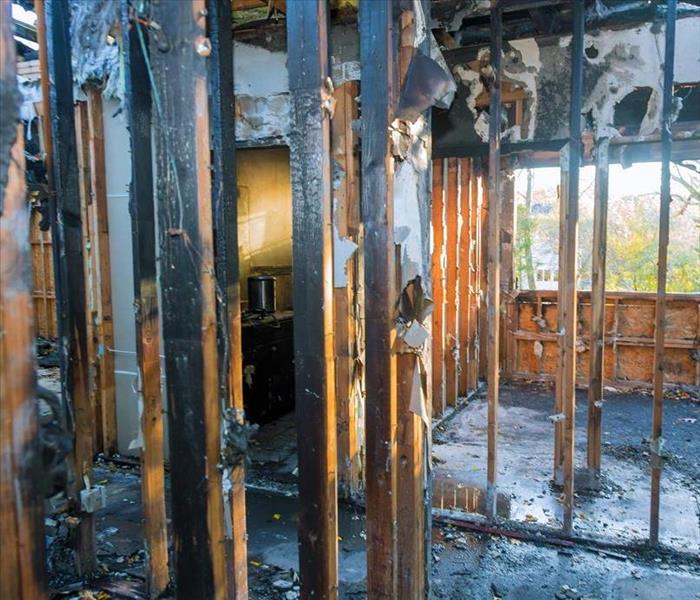 Fire damage in Greenville, NC can be devastating. Call the professionals at SERVPRO of Greenville to help!
Fire damage in Greenville, NC can be devastating. Call the professionals at SERVPRO of Greenville to help!
If your property has been damaged by fire, you need to act fast to prevent further damage and restore your property to its preloss condition. However, choosing the right fire damage restoration service provider can be challenging, especially if you're not familiar with the process. In this blog post, we'll share some tips on how to choose the right fire damage restoration service provider in Greenville, NC.
Look for local providers: When searching for fire damage restoration services in Greenville, make sure to prioritize local providers. Local providers are more familiar with the local area, local building codes and regulations, and can respond to emergencies more quickly than providers from other areas.
Check for certification: Make sure that the fire damage restoration service provider you choose is certified by the Institute of Inspection, Cleaning and Restoration Certification (IICRC). Certification ensures that the provider has the necessary training, equipment, and expertise to handle fire damage restoration.
Check for insurance: Make sure that the fire damage restoration service provider you choose has liability insurance and workers' compensation insurance. This protects you from liability in case of accidents or injuries that occur during the restoration process.
Look for experience: Choose a fire damage restoration service provider with a proven track record of successfully restoring properties damaged by fire.
Check for 24/7 availability: Fire damage can occur at any time, and you need a service provider who is available 24/7 to respond to emergencies quickly. Make sure that the fire damage restoration service provider you choose can respond when you need them.
If you're searching for fire damage restoration services in Greenville, NC, SERVPRO® of Greenville is Here to help. ® We specialize in fire damage restoration and have decades worth of experience helping property owners restore their properties to preloss condition. Contact us today to learn more about our services.
Water Damage Restoration: Tips for Commercial Property Owners in Greenville, NC
3/20/2023 (Permalink)
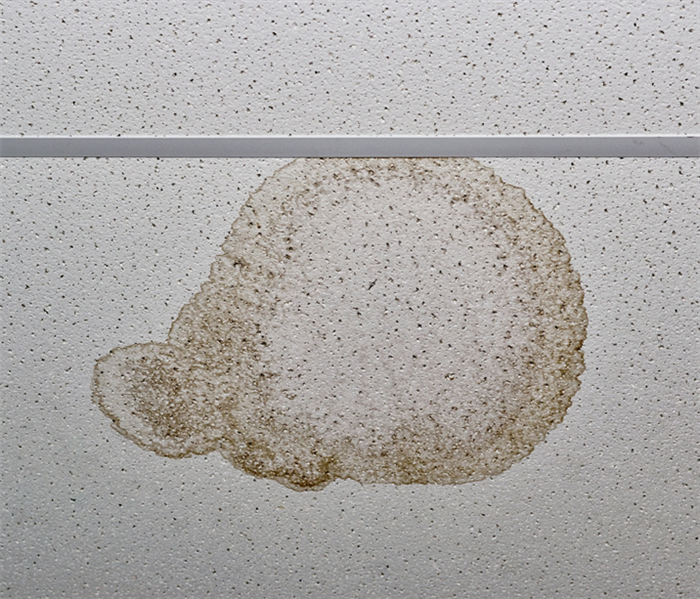 Water Damage Alert! Wet ceiling tiles are often a sign of a bigger problem. Contact SERVPRO of Greenville for fast, reliable water damage restoration!
Water Damage Alert! Wet ceiling tiles are often a sign of a bigger problem. Contact SERVPRO of Greenville for fast, reliable water damage restoration!
Water damage can occur at any time and can be devastating to commercial properties. From flooding to burst pipes, water damage can cause structural damage, damage to equipment, and lost productivity. In this blog post, SERVPRO® of Greenville, a leading provider of fire and water damage restoration services in Greenville, NC, will share some tips for commercial property owners to prevent and address water damage and ensure that their properties remain safe and operational.
Regularly inspect your property: Regular inspections can help you identify potential water damage risks and address them before they become a problem. Inspect your roof, plumbing system, and foundation regularly to identify leaks, cracks, and other issues that could lead to water damage.
Develop an emergency plan: An Emergency Readiness Profile (ERP) outlines the steps to take in case of water damage. This typically includes vital information such as water shut-off locations, and contact information for water damage restoration and cleanup services like SERVPRO of Greenville and make sure that all employees know what to do in case of an emergency.
Invest in preventive measures: Invest in preventive measures such as installing water alarms and automatic shut-off valves that can help you detect and prevent water damage before it becomes a major issue.
Hire a professional water damage restoration service provider: Water damage restoration is a complex and time-consuming process that requires specialized equipment and expertise. If your property experiences water damage, act fast to prevent further damage and address the issue. Hire a professional water damage restoration service provider such as SERVPRO of Greenville® to ensure that the damage is properly addressed and your property is restored to its preloss condition.
At SERVPRO® of Greenville, we specialize in water damage restoration, flood damage cleanup, and mold removal for residential and commercial properties. Our team of professionals has the equipment and expertise to handle any water damage emergency, and we're available 24/7 to respond to emergencies quickly. Give us a call to help make your commercial water or fire damage, "Like it never even happened." ®
Greenville Commercial Fire Considerations
2/23/2023 (Permalink)
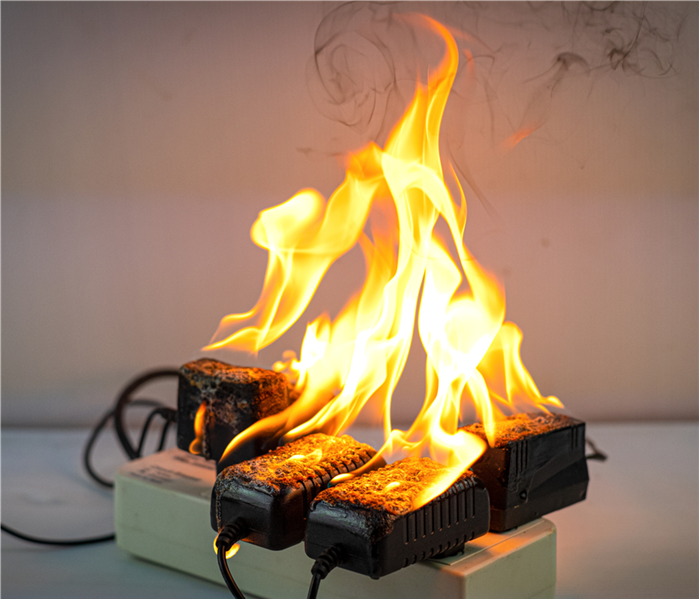 Regardless of what caused fire damage to your commercial property, SERVPRO of Greenville is nearby and ready to help!
Regardless of what caused fire damage to your commercial property, SERVPRO of Greenville is nearby and ready to help!
Commercial Fire Damage: What to Know and How to Handle It
When a commercial property suffers from fire damage, the impact can be significant and long-lasting. It can disrupt business operations, cause financial losses, and pose safety risks to employees and customers. That's why it's crucial to know what to do in case of a fire and how to handle the aftermath.
In this article, we'll discuss the basics of commercial fire damage, its effects, and the steps you should take to minimize the damage and ensure a swift recovery.
Types of Commercial Fire Damage
Commercial fire damage can vary depending on the cause, severity, and location of the fire. Some of the most common types of commercial fire damage include:
- Structural damage: Fire can weaken or destroy the building's structure, including walls, floors, and roofs. It can also damage electrical systems, plumbing, and HVAC systems.
- Smoke damage: Smoke can penetrate and stain walls, ceilings, and furniture, causing discoloration, odor, and respiratory issues. It can also damage electronic equipment and documents.
- Water damage: Water from sprinklers or firefighting efforts can cause water damage, including mold growth and structural damage.
- Content damage: Fire can damage or destroy equipment, inventory, and other contents of the building, resulting in financial losses.
Effects of Commercial Fire Damage
The effects of commercial fire damage can be significant and far-reaching. Some of the most common effects include:
- Business interruption: Fire damage can disrupt business operations, resulting in lost productivity and revenue.
- Safety risks: Fire damage can pose safety risks to employees, customers, and the general public, such as tripping hazards, electrical hazards, and toxic smoke.
- Property damage: Fire damage can cause physical damage to the building and its contents, resulting in expensive repairs or replacement costs.
How to Handle Commercial Fire Damage
Handling commercial fire damage requires a careful and coordinated approach to minimize the damage and ensure a prompt recovery. Here are some steps you should take:
- Call 911: The first step is to call 911 and report the fire. Evacuate the building and wait for the firefighters to arrive.
- Contact your insurance company: Contact your insurance company and inform them about the fire. They will send an adjuster to assess the damage and guide you through the claims process.
- Hire a professional restoration company: Professional restoration companies with experience in commercial fire damage restoration, such as SERVPRO® of Greenville, can assess the damage, create a restoration plan, and start the restoration process promptly.
- Notify stakeholders: Notify employees, customers, suppliers, and other stakeholders about the fire and its impact. Communicate regularly with them to keep them informed about the recovery process.
Commercial fire damage can be devastating, but with prompt and effective action, you can minimize the damage and ensure a swift recovery. Remember to prioritize safety, document the damage, and hire a professional restoration company such as SERVPRO of Greenville. By following these steps, you can get your business back on track and minimize the impact of the fire on your operations and finances.
SERVPRO of Greenville proudly services all of Pitt and Greene counties in eastern NC. Our restoration team is available 24/7 for commercial fire damage emergencies.
How Restoration Experts at SERVPRO® of Greenville Handle Water Damage
9/19/2022 (Permalink)
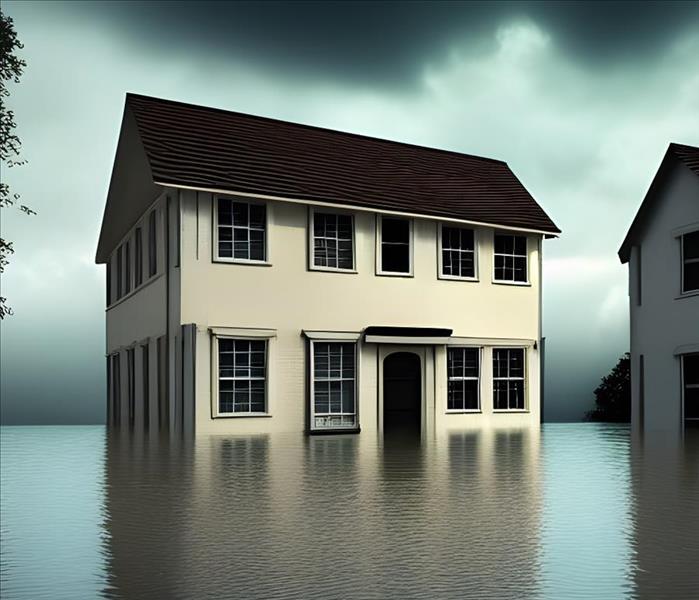 Water damage can be devastating, but restoring your home afterward shouldn't be. Call SERVPRO® of Greenville to take care of your home or business.
Water damage can be devastating, but restoring your home afterward shouldn't be. Call SERVPRO® of Greenville to take care of your home or business.
Water damage is different from other disasters because it is unpredictable. With natural disasters, you only have to deal with the unpredictability of outside forces. But with water damage, you never know when a flood could occur, when a pipe might burst inside your wall, or when a supply line running to your refrigerator could fail. Two sets of variables can double the frustration.
If you are one of the 14,000 unfortunate homeowners who will deal with water damage today, take a deep breath and click the help link at the bottom. Here's how SERVPRO can handle your water emergency:
Emergency Contact: Rest easy; you’ve already got an expert on the line. Just answer a few questions to help us understand what’s going on, and we’ll set a time to get on site.
Inspection and Water Damage Assessment: The next step is getting boots on your property and eyes on the damage. We’ll get a feel and put a plan together, and we’ll make you aware of any potential perils stemming from the damage.
Water Removal: Your SERVPRO team brings knowledge to the table and pumps to the scene, and we’ll use them both to get rid of the offensive water that’s got your life upside down. You’ll lose count of how many gallons we’re able to extract.
Damaged Material Removal: Restoration is our priority, but some things may not be able to be saved. We’ll carry those things off and leave the rest of the space in a better situation to get dry.
Cleaning, Sanitizing, and Deodorization: Water that invades your home can stain, sour and flat-out stink. We’ve got customized cleaners and techniques to get rid of all of it.
Drying: Our next big priority is getting the place dried out before mold decides on becoming an unwanted roommate. We’ll use specialized HEPA vacuums and other equipment to strip every surface of excess dampness.
Monitoring: What we start, we’ll manage. Every day you’ll be seeing and hearing from us on the status of the restoration, and if adjustments need to be made, we’ll be right there on top of things.
Repairs and Construction: Now for our last trick, we’ll make your home look Like It Never Even Happened®. We’ll go to whatever lengths are necessary to repair, restore or reconstruct your damaged areas so that you’ll barely even remember we came when we're finished.
Give us a call for all of your restoration and remediation needs at 252-329-7205.
Excess Moisture in The Air Can Damage Your Greenville, NC Home.
9/9/2022 (Permalink)
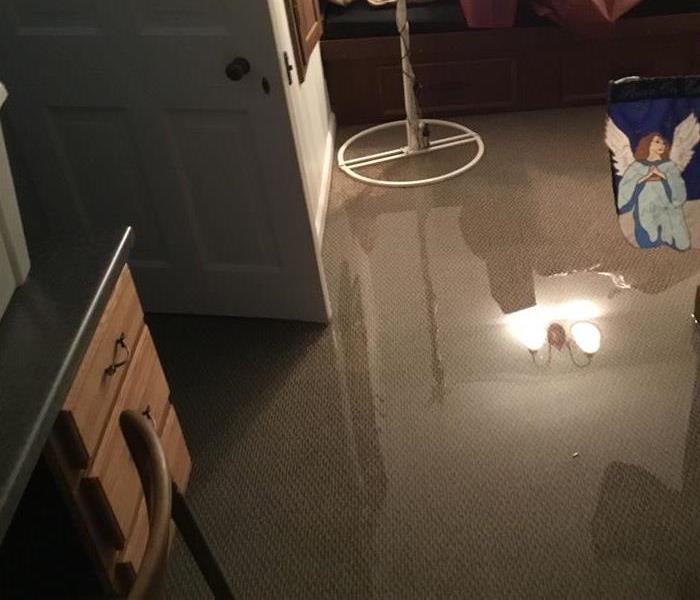 Toilets, dishwashers, and refrigerators are all fairly common sources of water damage. Be sure to inspect them regularly!
Toilets, dishwashers, and refrigerators are all fairly common sources of water damage. Be sure to inspect them regularly!
Even if your home has never been flooded, excess moisture may still be wearing down its materials and creating ever-costlier damage to your property. A significant proportion of SERVPRO's water removal requests are for more moderate, subtle examples of water and moisture wreaking havoc in a home. Cases like these are some of the most common water removal projects we take on:
Excess Humidity
When a home's atmosphere is too humid because of excess water intrusion, airborne water droplets can start to cause damage to metals, wood, certain finishes, fabrics, and other materials common in American homes. Long periods of exposure to humid conditions can encourage mold growth in fabrics and building materials. During standard water remediation techniques, we remove standing water first by pumping and extracting, then reduce the relative humidity in the air and the moisture content of materials by deploying air movers and dehumidifiers. This dehumidification process also improves overall indoor air quality (IAQ). SERVPRO offers various types of equipment such as low grain refrigerant (LGR) and silica gel-based (desiccant) dehumidifiers.
Appliance Malfunctions
Even the most stalwart appliances can malfunction on occasion, and objects that use large volumes of water in their normal operation are susceptible to flooding or dampening the area around them. Even if no standing water is created, small mishaps can still saturate porous materials and cause long-term damage if the cause of dampness is not addressed, and a proper water restoration procedure is conducted.
Leaks
Leaks and drips in other areas in your home can also develop into problems significant enough to warrant a full water removal effort. Even small leaks that are left unrepaired for an extended period can allow the water to seep deep into materials to create a soaked, mold-vulnerable area, often hidden behind walls or beneath flooring materials.
SERVPRO of Greenville provides water removal solutions for almost any water or flood problem you may have. For fast, 24/7 service, give us a call at 252-329-7205.
Protect Your Family: Five Steps For Fire Safety
8/19/2022 (Permalink)
 Keeping your family safe is a top priority. Let preventative steps like these assist you.
Keeping your family safe is a top priority. Let preventative steps like these assist you.
While you likely take steps to prevent fires in your Greenville home, sometimes things happen that are out of our control. In those instances, you need to already have a plan in place. Here are five things you can do to be ready should there be a fire in your home:
1. Maintain your smoke alarms properly. This includes making sure your smoke alarms are in the proper places, have fresh batteries, and are tested at least once a month to make sure they are ready to alert you in case of danger.
2. Ensure you have an exit plan. Develop an exit strategy with your family. Keep in mind that you should have at least two exit options so that if a fire is blocking one, there is another option for everyone to use. Make sure everyone in your household knows these exits like the backs of their hands.
3. Have emergency contacts. Picking an emergency contact is vital to ensure the safety of your entire family, especially if a family member were to get separated. Make sure that your kids especially memorize the phone number of a neighbor, or a family member who lives close to ensure that they have a safe place to go.
4. Practice. Practice makes perfect when it comes to fire safety. During a real fire, emotions or panic can make it difficult to think. You should run drills every four to six months, so that, in the event of a fire, everyone knows what to do like second nature, despite the emotions and panic.
5. Calling 911. Make sure everyone in the family knows to call 911 and can recite their address so the first responders can get there as soon as possible.
Of course, if there is a need for assistance after a fire occurs, leading experts such as those at SERVPRO of Greenville can help get your life back in order.
Stay Safe During Storms!
8/19/2022 (Permalink)
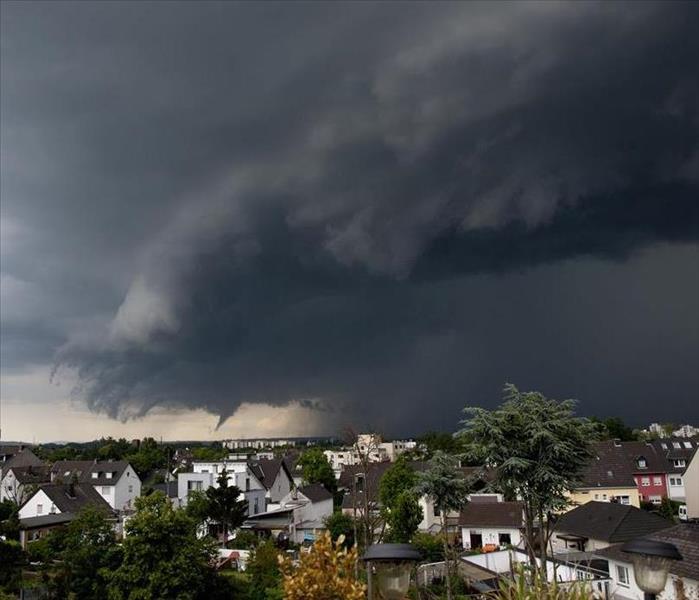 Storms are unavoidable, but taking a few steps of precaution can avoid most of the risks!
Storms are unavoidable, but taking a few steps of precaution can avoid most of the risks!
We've had quite a rainy and stormy summer, and with these storms comes the risk of personal and property damage. Keeping yourself and your loved ones safe during a storm is the top priority, so here are a few tips to keep in mind:
Get inside! Be it inside your home or the home of a trusted neighbor, staying outside during a storm exposes you to many risk factors. If you’re away, seek shelter at a local business, or a public restroom. Public restrooms in parks are typically built to be stormproof. Should there be no other options, shelter in your car to reduce risk and stay dry as you wait out the storm.
Stay away from windows. The safest place to be during a storm is a basement. Unfortunately, many houses in the south don’t have basements. As such, centralized bathrooms are a great alternative.
Try to stay away from appliances. Showering or talking on a wired phone is especially dangerous during a storm. Lightning can travel through plumbing fixtures or home wiring; to that end, try to avoid using your washer and dryer during a storm. Lightning strikes can cause those appliances to short and catch fire.
Once the storm has passed, be cautious when walking around, especially outside. Be alert for down powerlines and tree branches. If you smell gas, be sure to contact authorities immediately. Storms can be scary to witness but following these steps can help to put your mind at ease during the next one. If you find that a storm has caused damage, call SERVPRO of Greenville today and let the experts take care of it!
How Water Remediation Professionals Test For Moisture
8/15/2022 (Permalink)
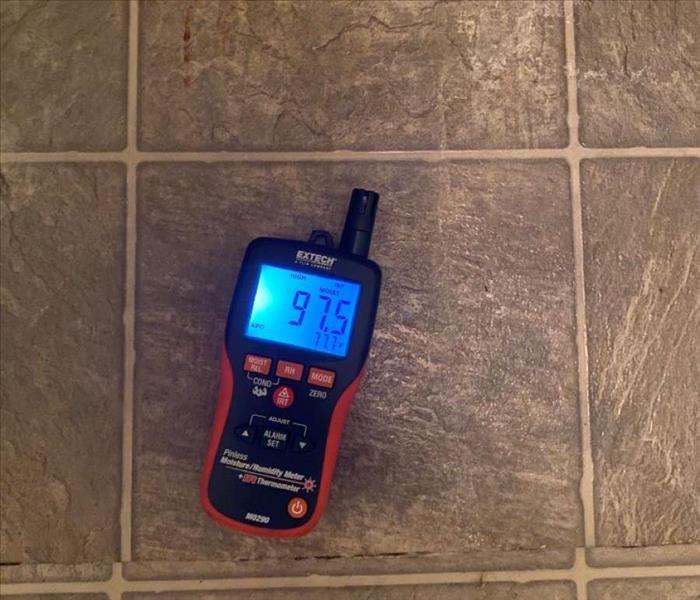 SERVPRO has the expertise and equipment and specialized sensors to mitigate water damage of any size.
SERVPRO has the expertise and equipment and specialized sensors to mitigate water damage of any size.
A leaking refrigerator/freezer in your home can happen for several reasons. If the defrost drain freezes, the water overflows the drain trough and drips down to the bottom compartment, eventually leaking onto the floor. The water tank assembly can also begin leaking. These leaks can be challenging to find, but a leaking tank requires replacement. Also, if you have a water dispenser and ice maker, the inlet valve can become loose or cracked, allowing water to leak.
SERVPRO can restore water-damaged Greenville homes. We have all the right tools for this, and our staff has been specially trained and certified.
When your home has suffered water damage, our goal is to return all the affected materials to their normal moisture content levels. We use moisture meters to find the actual moisture content of different materials to help us determine if your structure is dry. Penetrating moisture meters have probes to test inside wall cavities and underneath the flooring. Penetrating meters also test separate layers. Non-penetrating meters have sensors that do readings when placed on the surface of materials.
SERVPRO technicians must use the moisture meters properly. We ensure that the meter we are using is set to the surface we are testing. A moisture meter set for drywall, for example, does not accurately read moisture content in wood materials. The relative scale is used to determine readings for non-wood materials and the wood scale to determine readings for wood. If possible, we can establish a baseline of moisture content from material from an unaffected area of the structure.
We also use thermo-hygrometers to measure both the relative humidity and temperature. We let the meter adapt to air conditions in the room before taking the reading, then in conjunction with a psychrometric calculator or chart to figure out the specific humidity. Readings of air for four areas are used, including the areas unaffected, the areas affected by moisture outside the home, and the exhaust being processed through the dehumidifier into the affected area.
SERVPRO of Greenville has the tools to ensure that your home is thoroughly dry again after cleaning up the water damage. Contact us at (252)-329-7205.
SERVPRO Technicians Are Certified And Ready To Help
6/16/2022 (Permalink)
 Our technicians study hard to master the training fundamentals set by the IICRC.
Our technicians study hard to master the training fundamentals set by the IICRC.
SERVPRO of Bath is IICRC certified in a variety of categories. One of the most important is water restoration.
IICRC stands for the “Institute of Inspection Cleaning and Restoration Certification.” They are the institution that sets the standards for the entire cleaning and restoration industry.
Our technicians study IICRC standards and practices in a variety of crucial fields: water restoration, mold remediation, carpet cleaning, and fire restoration, just to name a few.
What is a WRT?
WRT stands for water damage restoration technician.
The IICRC states "the Water Damage Restoration Technician course is designed to teach restoration personnel that performs remediation work to give them a better concept for water damage, its effects, and techniques for drying of structures."
In other words, those proficient enough to pass IICRC standards have been given the knowledge and tactics necessary to handle commercial and residential properties.
Once this certification is met, many aim for the ASD certification. ASD stands for applied structural drying. Before you can take the ASD course, you must be WRT certified. It can function as a sort of “next level” to the WRT certification and ensures health and safety measures will be taken for all exposed to the work environment.
Being WRT certified means our technician, project manager, or crew chief is certified to take care of your water damage, no matter if it's in your living room or your retail store!
If you suffer a commercial or residential disaster and need to clean up call us and we will clean with care and can be your single source for all your clean-up needs.
SERVPRO of Bath is a proud provider of service to our community. We're “Here to Help” 24/7 at (252) 923-0213.
Choose The Right Tools For The Job
6/13/2022 (Permalink)
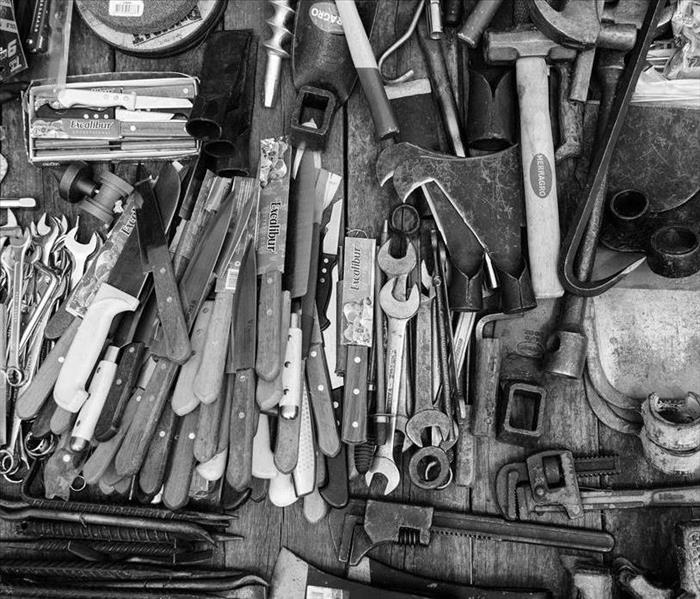 Having the right tools means nothing without knowing which is correct for the job. That's where training and expertise can make all the difference!
Having the right tools means nothing without knowing which is correct for the job. That's where training and expertise can make all the difference!
Equipped to Handle Your Commercial Needs
SERVPRO of Greenville understands that using the proper equipment makes a measurable difference in reducing claims loss expenses and long-term frustrations. When time is of the essence, technology and equipment must be counted on to perform reliably and effectively. Our professionals will answer your call with fast action, exceptional equipment, and expert training. Having the right tools for the job is vital to timely and effective mitigation. Our water damage professionals’ thorough understanding of how to dry a structure and personal property could be the difference between a temporary inconvenience and a long-term hassle.
Psychrometrics
Psychrometry is the study of air and its properties. The properties of temperature, humidity, vapor pressure, and dew point are measured to evaluate air conditions within a structure. This enables a SERVPRO Professional to create the proper conditions for more efficient and effective drying.
Analyzing air conditions may seem somewhat less important after having a leak run across multiple rooms. However, water can damage materials in two ways: first, by absorption through direct contact with water; and second, by absorption of moisture from the air. Measuring the moisture content of the air is critical to the drying process.
Restoration professionals must establish an environment favorable for drying. The restoration professional must also understand how to manipulate temperature and humidity levels to produce optimum drying conditions, without causing secondary damages through improper drying processes. Call SERVPRO of Greenville to get trained experts to handle your commercial business mitigation and restoration needs.
Common Sources of Mold
6/10/2022 (Permalink)
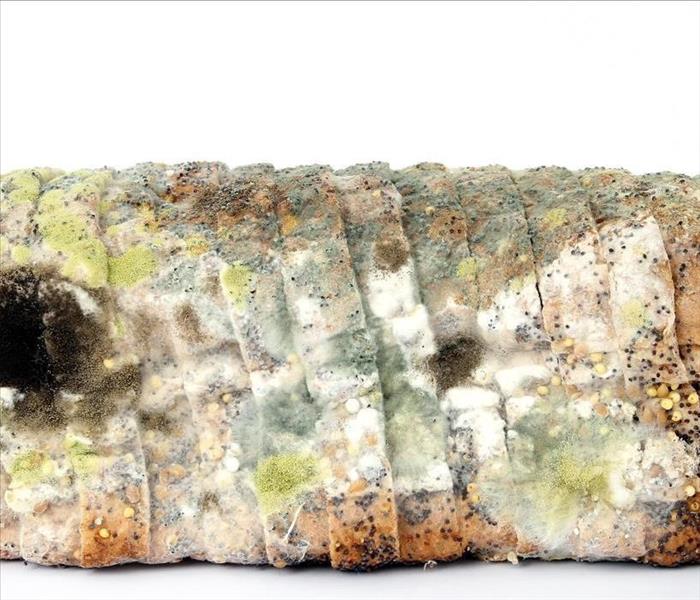 There are many types of mold, coming in a variety of colors and appearences.
There are many types of mold, coming in a variety of colors and appearences.
Five Places Where Mold Grows
One big aspect of mold prevention is early detection. Although it is impossible to completely eliminate the possibility of fungal intruders in Greenville, NC, uncovering growths that have recently begun to develop grants you an opportunity to stop infestations from worsening. Here are five locations within your office that should be checked regularly.
- HVAC Drain Pans
Air conditioning pans are located near your temperature control system’s cooling coils. The sweat that develops as air moves through the coils drips into the pan. When flow rates become too high, the collected condensation can overflow. This runoff sometimes soaks ductwork, making mold a possibility. - Ducts
Air moving through ductwork contains heavy moisture. When this buildup condenses, it gets absorbed into duct linings. Besides checking for growths, ensure that your system’s airflow rates are optimal as an additional form of mold prevention. - Ceilings
Because they tend to be porous, mold sometimes grows in ceiling tiles. Those adjacent to HVAC system vents are particularly vulnerable. Mold in ceilings can also result from roof leaks. When this happens, the eventual water damagegives good reason for hiring an expert roofing repair team. Such professionals are also typically capable of safely removing mold growth. - Carpeting
Carpets are susceptible to spills, floods, and leaks. Look underneath yours to determine whether dampness exists. A wet vacuum should be employed when water is discovered. Follow this step with a good steam cleaning. Fans and dehumidifiers may also be used to accelerate the process. - Wallboard
Flooding, groundwater and mechanical system leaks are common causes of damp wallboard. Get rid of compromised wallboard by cutting at least 20 inches above the water’s high point. Make certain that all wall and ceiling cavities are thoroughly dried before installing a fresh set. An important part of mold prevention is rapid discovery. Halt the progress of fungal invasions by regularly checking your building’s most common trouble spots.
Mold can be a stressful invader in your home or business. Call a reputable mold inspection specialist if you have any doubts or concerns.
Flood Insurance Claim Guide
5/26/2022 (Permalink)
 There are many components to a flood claim; follow this guide and don't get overwhelmed by the process!
There are many components to a flood claim; follow this guide and don't get overwhelmed by the process!
Floods can cause devastating damage to homes. One of the first steps to restoring your property after a flood is to consider filing a flood claim.
Flood Insurance Claim Guide
Filling a claim for flood damage is done in multiple steps:
- Contact the Insurance Company
The first thing to do is contact your insurance company. Most homeowners’ insurance does not cover flood damage, so your flood insurance might be with a different insurance company than your homeowner's insurance. If you aren't sure who your insurance carrier is, you can call the National Flood Insurance Program Call Center at 1-800-427-4661 to find out.
- Provide Information
Your insurance company will need several pieces of information. This may include your policy number, a phone number, and an email address where your insurance company can contact you. You’ll need the name of your mortgage company if you have one as well. If you don't know all this information, your insurance or claims agent may be able to look it up for you.
- Document Your Damage
It usually takes 24-48 hours for an insurance company to assign an adjuster. However, if flooding is widespread, it could take longer. While you are waiting, take photos and videos of any visible damage to your property, as well as flood lines on the outside and inside of structures. Photograph the make, model, and any serial numbers available for electronics and appliances. Remember, safety first; do not enter flooded areas or structures until they have been declared safe by a professional or emergency responder.
- Discard Flood Damaged Items That Are Unsafe
After you take photos and keep samples of materials such as pieces of carpet, flooring, drapes, or wallpaper, throw away flood-damaged items that are unsafe to keep. Such a list includes perishable foods, cushions, clothing, and pillows.
- Contact Repair Services
If the electrical, HVAC, or water systems of your home are damaged, contact repair services to line up potential solutions. Chances are good that if you are having issues, many others in your area are as well. Be sure to talk to your insurance company about your flood claim before you sign any contracts. This is also a good time to schedule a flood remediation company in Washington, NC, to begin drying and cleaning your damaged home.
- Meet the Adjuster
When the insurance adjuster arrives, ask to see the adjuster's Flood Control Number card and other official identification. This protects you against scammers who may be posing as insurance adjusters. Review the adjuster's written report and estimate for any errors. A legitimate insurance adjuster will not ask you to pay your deductible, charge you a fee or ask for money for any other reason.
- Payment and Repairs
Once the insurance company receives the adjuster's report and estimate, it will review the report, along with any documentation you have provided, to establish the value of your claim. If you disagree with the value the insurance company determines, you may need to submit additional supporting documentation to prove your claim. Once a settlement is reached, the insurance company will issue you a check and you can use the money to make repairs.
The flood claim process can be lengthy, particularly if there are many people in your area with damaged property. The faster you get the process started, the sooner you can expect to receive payment.
Understanding the Fire Mitigation Process
5/26/2022 (Permalink)
 Like all good processes, many things must come together to make the most of a situation.
Like all good processes, many things must come together to make the most of a situation.
What to Expect After a Fire
1. Assessment
The first thing specialists must do is get a clear picture of the extent of the damage. They walk through your home, making note of fire, water, and smoke damage that needs to be mitigated. At the end of this visit, they compile an itemized list of tasks and can try to formulate a general cost and timeline for the work needed.
2. Removal
Before technicians can repair salvageable items, they must remove everything that needs to be thrown out. Even if something can be saved, it still needs to be removed so that they can work on repairs. Personal belongings must be removed and either set aside for cleaning or discarded.
3. Cleaning
After all destroyed materials have been removed, a thorough cleaning is in order. A big part of fire restoration is cleaning not only the soot and smoke left by the fire but also the water damage that happened from the fire being put out. Every surface must be disinfected before new materials can be brought in.
4. Restoration
Once damage cleaning is done, technicians can build on the existing structure to restore your property. New drywall can be added and painted to match the rest of the area. New tile and flooring can be installed. Finally, items that were able to be restored can be moved back into the space.
A home fire may cause a lot of damage, but most homes can be repaired to preloss conditions. The fire restoration process starts with assessment and mitigation. Then, technicians take the steps necessary to return your home to all of its former glory.
Understanding Commercial Fire Claims
5/26/2022 (Permalink)
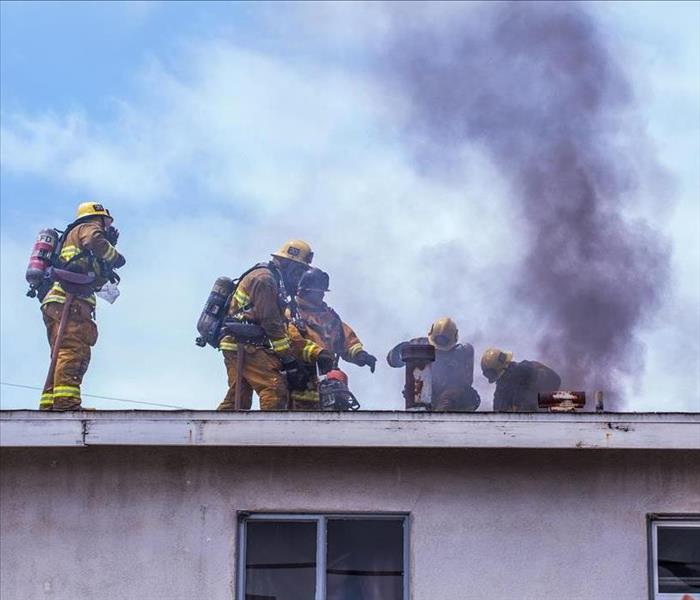 Just like how firefighters have a plan and process to handle a blaze, you too should use caution and prepare.
Just like how firefighters have a plan and process to handle a blaze, you too should use caution and prepare.
Fire Claim Process
While a blaze burning through your facility and your inventory is devastating enough, the cleanup after a fire can leave your property and your business boarded up for months. Therefore, it is essential to start the fire claim process immediately so that you can minimize the extent of the business interruption and get back to work quickly.
- Call Your Insurer
While the first calls you make are to emergency services and family, the third call you should make after a fire is to your insurer. You want to make this call immediately after a fire to ensure that the claims process is initiated at the earliest possible moment. The longer you wait to make a claim, the longer it will take to get your business back up and running.
- Mitigate Further Damage and Loss
After you initiate the fire claim, you may want to consider having your facility boarded up, mitigating further damage and loss. If you already have a plan in place with a restoration expert, then call them and get the process started.
- Keep Receipts
As you begin the cleanup, be sure to track all your expenses by saving and tallying the receipts for any expenditures. When the adjuster arrives, they will want a full record of the damages incurred and the mitigation efforts made to reduce further property loss and damage.
- Make a Record of Loss
Additionally, you should walk your property, photographing all damages to show your insurance adjuster. This record of loss will be used when evaluating your claim. You should also include any relevant receipts for the damaged property so your insurer can create an accurate valuation of the overall loss.
A fire claim may seem like a confusing process, but as with every bureaucratic process, there are appropriate steps to take. After a fire, just make sure to call your insurer, mitigate further damage, keep receipts, and make a record of loss.
When Storms or Flooding Strikes, SERVPRO is Ready!
5/23/2022 (Permalink)
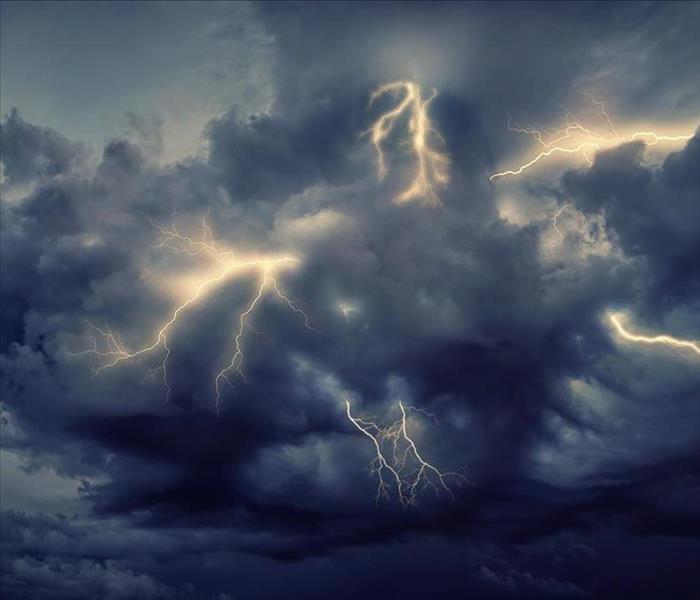 Storms can be scary, but the restoration process after one damages your property shouldn't be!
Storms can be scary, but the restoration process after one damages your property shouldn't be!
SERVPRO of Greenville is a specialized leader in storm and flood damage restoration. Our crews are highly trained and certified, and we are equipped with the most cutting-edge technology to restore your property to its pre-storm condition as quickly as possible.
Response Time Matters
As a locally owned and operated franchise, we know our communities and are able to respond appropriately. With the right resources—which is extremely important— fast response will lessen the damage, limit further damage, and reduce restoration costs.
The Right Tool For The Job
Eastern North Carolina is storm-prone, and we are at a higher risk of intense or damaging storms than many other areas. We understand just how intense things can get and have the unique ability to scale our resources to handle a large storm or flooding disaster. We can access equipment and personnel from a network of 2,000+ SERVPRO Franchises across the country and elite Disaster Recovery Teams that are strategically located throughout the United States.
4 Reasons To Seek 24 Hours Emergency Restoration Help
4/25/2022 (Permalink)
 24 Hours Emergency Restoration Help is the best Choice to Protect your Property.
24 Hours Emergency Restoration Help is the best Choice to Protect your Property.
If you're a commercial owner in Greenville, NC, you don't want to lose any time after a disaster. Every minute matters to mitigate the risk of secondary damage and restore your operations to full functionality. Whether you suffer from fire or water devastation, the expert remediation teams at SERVPRO offer 24 hour assistance, so you don't have to wait to begin taking charge.
Their crews remain ready and able to service sites when you call. In addition, owners know when they reach this group to expect action and assessment right away. The following are three reasons to call SERVPRO specialists for help.
Why is 24-hour service important?
1. You Need To Secure the Grounds Within a 24 Hour Time Frame
When a building suffers from fire or water damage, the structure develops vulnerabilities. Owners have to worry about the facility's integrity and exposure. SERVPRO experts get to the premises, determining whether the land is secure from animals, weather and trespassers. During a walkthrough, these specialists should survey for holes or weak locations. Once identified, the workers should fortify these areas with plywood, board up any broken windows and tarp gaps on the roof.
These actions allow owners to fight off potential threats. Animals are less likely to get inside, make a home and harm the building. Rain and snow stay outside. Finally, minimize the chance of break-ins, vandalism and curious wanderers.
2. You Need To Document Immediate Efforts
The insurance company scrutinizes claims that lack a fast response. They look for reasonable faith efforts from their clients, questioning delays in action. SERVPRO understands owners' needs, responding within one hour and getting to the site within 4. When you reach out to an organization right away, the insurer sees someone looking to protect assets and working to reduce the overhead cost. This decision could work in favor of gaining claim approval.
3. You Must Minimize the Effects of Water Damage
Fire and water wreak havoc on building infrastructure. You need both examined promptly with a company that is always open. Fire hoses drenched the roof, walls and floor to eliminate the flames. These actions left the interior saturated from top to bottom.
Water moves quickly into objects, absorbing into porous items. It's hard to remove and becomes a harbinger of mold spores. The property requires drying and tear-outs to eliminate the possibility of fungus development, and because these microbes reproduce within a day or two, owners cannot afford to wait. Expect a verbal discussion with SERVPRO team leaders within the first 8 hours of contact. They're ready to act and inform because owners don't have time to pause.
4. You Should Salvage and Photograph Property
With early intervention, remediation staff determines how much the area received impact. SERVPRO workers barricade off that location, minimizing contamination to other rooms. Their rapid and meticulous approach protects your other assets. In addition, employees can photograph the initial devastation, noting the loss of equipment or physical trouble.
Don't hesitate. Don't wait. You have a 24 hour window to act. Have SERVPRO's professional remediation services at your place, ready to document, secure and clean your premises. Exceptional help and fast assistance minimize the aftereffects and complications of your restoration.
What Is the Process for a Fire Claim?
4/14/2022 (Permalink)
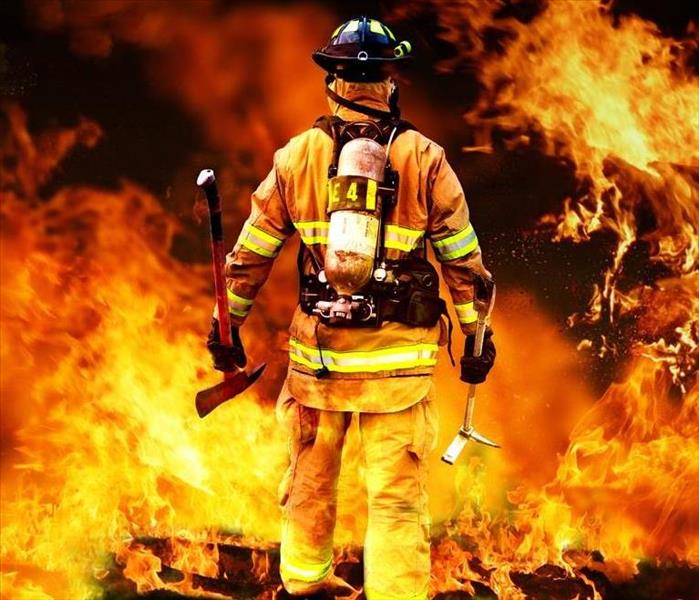 Follow These Tips and Learn More about the Process for a Fire Claim.
Follow These Tips and Learn More about the Process for a Fire Claim.
Fires can cause devastating damage to your property and completely shut down your business operations. To get your business operating as quickly as possible, it is important to file a fire claim and get an estimate for your damages as soon as you can.
The Commercial Fire Claim Process
There are several steps involved with getting your fire claim processed.
- Call Your Insurance Company
One of the first things to do, after making sure everyone is safe, is to call your insurance company to report the fire damage. A claims professional will probably ask you some questions about the damage and when, where and how the fire started.
The employee may also provide you with some instructions about what to do and request any needed paperwork or other documentation.
- Document Your Loss
Take photos or videos of your damaged property. Gather up receipts, tax records or other documentation that proves the value of your damaged or destroyed property. Make a list of everything that is damaged so you can make sure nothing gets left off the claim.
- Secure Your Property
Unfortunately, fire-damaged buildings can be targets for looters, thieves and vandals. If possible, board up holes in windows and walls to prevent easy entry into your building. If the damage is too extensive, consider putting up a security fence to keep unauthorized people off your property.
- Make Temporary Repairs
Broken windows or openings in other parts of the building can create an opening for rain and wind to enter, causing further damage to your property. Use tarps or plywood to make temporary repairs. If you have extensive damage, consider contacting a remediation company in Greenville, NC, for tarp and board-up service.
- Review Your Policy
Review your insurance policy. Pay particular attention to the maximum coverage amount for different items, the deductible and co-insurance and your business interruption insurance.
- Get an Estimate
If your damage is relatively minor, your insurance company may accept documentation from a local contractor. However, most of the time the company will send out an adjuster to examine your property. Try to be available to show the adjuster around your property.
If you want a second opinion, you can contact a contractor or hire a public adjuster.
- Clean Up the Property
Once everything has been documented, you may need to clear out damaged contents and debris before the repair process can begin. Check with your insurance to make sure you are covered before you start hiring contractors.
- Repair Your Property
Your insurance company may recommend contractors who can repair your property; however, you are not obligated to use them. Make sure you show the insurance company's damage appraisal to whoever you hire. If additional damage is found or your contractor can't complete the job for what the insurance company has paid, you must check with the insurance company to make sure any additional charges are covered.
Getting through the fire claim process is more complicated than just getting an estimate for your damages. The sooner you contact your insurance company, the faster you can start making repairs.
Critical Maintenance for Your Water Heater
4/11/2022 (Permalink)
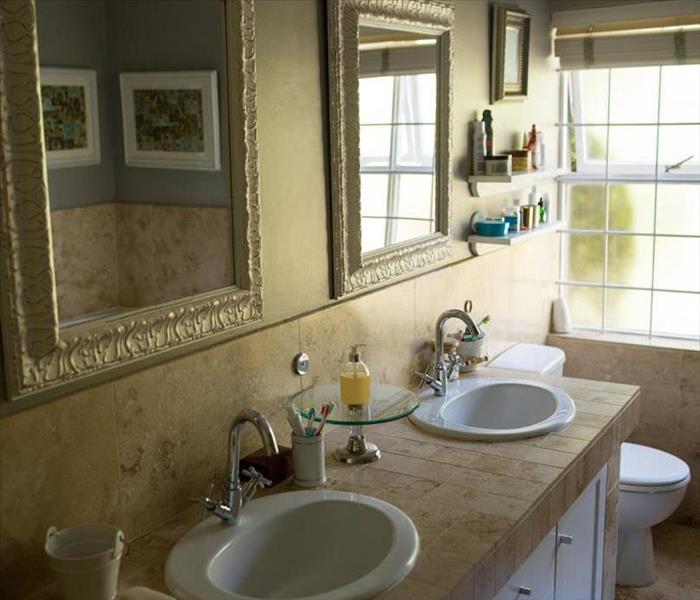 Know more about your Water Heater and Avoid Water Damage in your property.
Know more about your Water Heater and Avoid Water Damage in your property.
There are a lot of things to love about your water heater. For the most part, it is a no-fuss, no problem kind of appliance, giving your home in Greenville, NC, a reliable supply of hot water whenever needed. You can use this heated water for washing dishes and clothes, bathing and showering and shaving. Once the appliance is installed, it typically operates for years without a lot of maintenance.
However, to get the most out of your unit there is at least one important thing you can do on an annual basis. A water heater flush only takes a little time and has several important benefits:
- Gets rid of accumulated sediment in the bottom of the unit
- Prevents costly repairs and service calls to the home
- Avoids the premature failure of this essential home appliance.
- Reduces the chance you will need a professional water damage repair service
The Main Steps for Flushing Out a Water Heater
To begin with, assemble the necessary tools for the job, which you should have around your home. These include a garden hose, a screwdriver, work gloves and an area to drain the water. The next step is to turn off the heater. For gas heaters, this means extinguishing the pilot light and for an electric model, it means turning off the electric power to the unit, usually at the circuit breaker.
Next, find the drain valve at the bottom of the appliance and connect the hose to it. Then run the house out to a suitable area such as a grassy area in your backyard. Open the drain valve and let the water flow through the hose. Remember that the water coming out of the unit could be hot so be careful not to scald any exposed skin.
After the water has drained for a couple of minutes, go into the kitchen and turn on the hot water faucet. This helps the water flow more fully and allows for a more thorough cleaning of the inside of the heater. After about five minutes, turn off the water valve at the heater's base and watch until no more water is coming out of the heater. You can turn the valve on and off a couple of times for a good flush.
From there it is just a matter of removing the garden hose, closing the valve and turning on the energy source. The tank will again fill up with water and you will once again have the needed hot water for everyone in your household.
The Removal of Corrosive Sediment
If you never perform a hot water flush, either by yourself or by a plumber, sediments will settle into the bottom of your tank. In time, they can weaken the metal at the bottom of the tank enough that water will suddenly flow out to the interior of your house. This could result in gallons of water streaming over the carpet or other floorings.
Your water heater is part of what makes your home a castle. A little preventative maintenance helps this appliance have a longer life.
5 Facts About Mold on Food
3/24/2022 (Permalink)
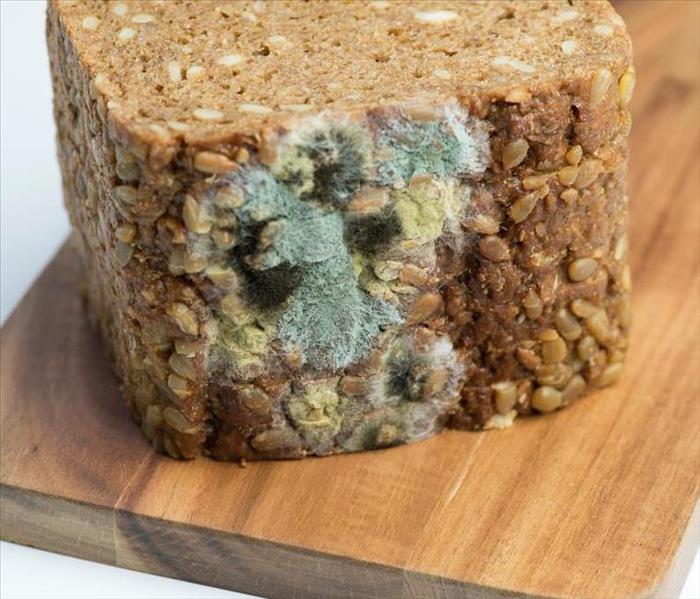 Learn More About Mold on Food by Following our Tips.
Learn More About Mold on Food by Following our Tips.
Have you ever purchased a loaf of bread in Greenville, NC only to go to eat it a couple of days later and realize that it's moldy? You're not only frustrated at the waste, but you're surprised at how quickly your bread went bad. Why does bread mold form so quickly? Here are five facts about mold on food that you might not know.
When it comes to Mold, consider these tips1. Mold Is a Fungus
Many different types of mold live outside and inside. Mold is a fungus which means that it doesn't get its food from sunlight like grass and trees. Instead, the fungus needs nutrients from food and a source of water to grow. Bread, for example, is a great source of both food and water for mold which is why fungus growth occurs so rapidly.
2. Mold Spores Are Everywhere
Because mold spores are a part of the natural environment, they can be found everywhere. Mold performs the important job of breaking down organic materials such as fallen leaves in autumn. Anytime you open a door or a window, mold spores come into your home. Mold spores only become a problem if they find the right environments in which to grow. Because they are everywhere, it's easy for mold to latch onto food items and replicate.
3. Mold Can Grow Almost Anywhere
Most molds like warm and damp environments. Often, people store bread in a cupboard in their kitchen which is a warm, dry place and bread has a lot of moisture. To prevent bread mold, you can store your loaf in the refrigerator. Just know that mold can still grow in cold environments, it just happens more slowly. To keep your bread good as long as possible, store it in the freezer and only take out as many slices as you'll eat for one meal.
4. Mold Can Smell Bad
If you've ever opened your refrigerator and smelled a dank, musty smell, it's safe to say that there's probably fridge mold of some sort growing in forgotten leftovers or on an old piece of fruit. Many people are surprised to learn that mold itself does not smell bad. As mold spores reproduce, they put off gasses which are the source of the smell. If you can smell mold, it's time to clean out the refrigerator.
5. Mold Can Be Remediated
Mold is everywhere and is a part of the natural environment. Therefore, it cannot be eliminated from a home. However, if you have a problem with excessive mold, it's important to call a mold remediation specialist to address the problem and avoid potential damage to your home. It's easy to throw away moldy food, but if you notice mold growing on a wall or windowsill, a professional should assess the area to determine the extent of the problem.
Mold spores are present everywhere. As a fungus, mold needs a reliable source of food and water to grow. Because it has both nutrients and moisture, a loaf of bread is susceptible to growing bread mold quickly. When you know the science behind mold, you can more easily take the necessary steps to prevent its growth in your home and on your food.
What To Expect From the Content Cleaning Process, Including Dry-Cleaning and Other Techniques
3/16/2022 (Permalink)
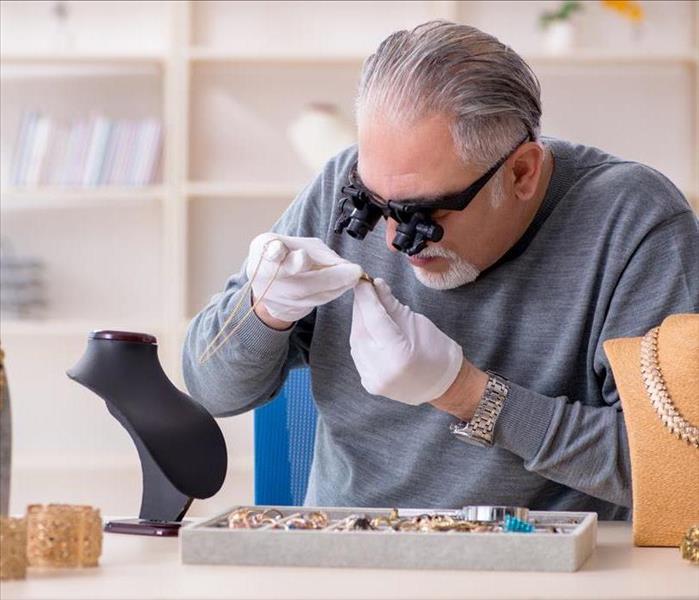 Know more about the Content Cleaning Process, and avoid Fire Damage in your Greenville, NC home.
Know more about the Content Cleaning Process, and avoid Fire Damage in your Greenville, NC home.
The destruction that follows after a fire in your home can disrupt your life for months. However, cleanup and recovery professionals in Greenville, NC, can speed up the recovery process and help you set your sights on a hopeful future. While repairs and reconstruction are underway on your home, professionals will also be busy taking care of the content cleaning, using methods such as dry-cleaning and other techniques:
- Spray and wipe cleansers
- Foam, immersion, and abrasive cleaning
- Specialized preservation services
If you aren't directly involved with the cleaning and recovery, it may be difficult to see progress. When you know what to expect, however, it's easier to wait for completed services.
The Content Cleaning Process From Dry-Cleaning to Heirloom Restoration
Assessing the extent of damage is one of the most important steps professionals can take. It is during this step that cleaning and restoration professionals determine which methods are best for the contents of your building. The various items in your home require unique cleaning attention.
A lot of your clothing, sheets, laundry, and other fabric belongings can be run through a high-capacity washing system or sent through a dry-cleaning facility. Other fabrics, such as upholstery and expensive carpets, require a gentle touch and expert handling. Appliances and other electronics require a different type of expert response, and valuable books and paperwork need yet another expert.
If you have jewelry, artwork, and heirlooms, you may be comforted knowing that the technicians handling your belongings have thoroughly inspected your items and planned for the appropriate care.
Separate Belongings by Cleaning Technique
Once the assessment is complete and the content cleaning plan is in place, the next step is sorting and storing the belongings. You may expect the sorting part of this step, but you may have questions about the storage of some of your items. Content storage is a vital part of properly caring for fragile or sensitive items.
For example, cherished journals from ancestors or paperwork that holds great sentimental value for you will be placed in frozen storage before document restoration experts begin their work.
It's important that the quality of the books and papers is protected before methods, such as vacuum thermal drying and dehumidification are used. Computers and similar devices may also be stored in specialized areas to reduce damage from humidity or soot buildup.
Clean Items With Appropriate Techniques
The cleaning part of this process may not happen immediately because of the important steps before it, but once this step is reached, it may move forward quickly. Upholstered items may be treated with foam cleaners and abrasive techniques could be used on belongings with tough stains. Steps will be taken to ensure that smoke odors are removed and that your belongings are free of soot and chemicals.
Return Cleaned and Restored Contents to Home Owner
Throughout the content cleaning step, the technicians will keep careful records of your inventory. This is to ensure that you don't lose any more of your belongings than have already been lost.
The recovery from a home fire is a rough road, but with cleaning techniques from dry-cleaning your curtains to the expert treatment of valuable artwork, professionals can help you have a smoother experience.
Flood Prevention Strategies for Building Owners
3/10/2022 (Permalink)
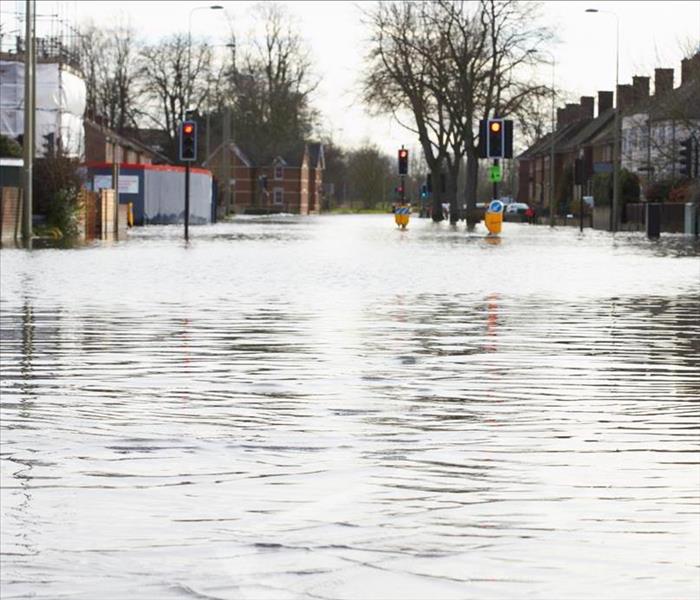 If you are Building Owner, Follow These Flood Prevention Strategies and Protect your Property.
If you are Building Owner, Follow These Flood Prevention Strategies and Protect your Property.
You probably have an extensive ongoing maintenance plan for your building in Greenville, NC. You winterize the property before the first freeze, make sure the plumbing is working properly and repair equipment quickly when it malfunctions.
Commercial property is a big investment, so it makes sense to protect it as well as you can. There are several flood prevention strategies that every building owner should use.
Incorporate Flood Prevention Measures in Landscaping
Protecting your building starts from the outside. Your regular maintenance plan likely includes several tactics to keep floodwaters at bay:
- Clean gutters and downspouts
- Upgrade landscape slope to direct water away from the foundation
- Keep trees and bushes trimmed to prevent unnecessary debris
Various landscaping options you use can also help. Plant groundcover or use mulch to slow the flow of water and encourage absorption. Concrete barriers not only provide a pleasant visual separation between garden beds and the lawn but also act as dams to control the flow of precipitation. Ask your landscaper for other options that help prevent unsightly and damaging floods.
Improve Water Flow Around Your Property
One of the easiest flood prevention strategies you can employ is to improve water flow. Floods only happen because heavy rains and their subsequent runoff have no place to go. Use barrier methods such as sandbags or inflatable blockades to stop water from getting into your building when you know a storm is on its way.
You can also create natural pathways with well-designed trenches or water wells. If you have the space to store rainwater safely, you may even be able to incorporate it into your irrigation system to save money on the utility bill later.
Purchase Flood Insurance
Even with every precaution in place, the fiercest storms are likely to result in some damage to your building. Your basic property policy is not likely to cover the cost of professional flood cleaning services for damage from a storm, though. You need to have a separate flood policy in place, particularly if your building is located in a flood plain. This helps you pay for restoration after a storm so that your business can operate normally again.
Talk to Your City Officials
No matter what measures you take to protect your own property, an overtaxed municipal system is still likely to cause problems for you. A flooded sewer can back up into your pipes and may cause damage inside the building, especially in structures built before 1980, as they don't typically have the safeguards used in newer construction processes. If you are concerned about the effect on your property, petition city officials to look for better ways to prevent floods. They may be able to create overflow areas, improve sewer drainage or install more efficient water filtration measures that benefit everyone.
Taking care of your commercial building takes forethought and preparation. Incorporating flood prevention strategies into your regular maintenance plan, particularly as storm season approaches, is a smart idea. While having a flood policy to back you up in case of disaster is crucial, protecting your building from damage in the first place is even better.
Always Here for Greenville, NC Residents
3/8/2022 (Permalink)
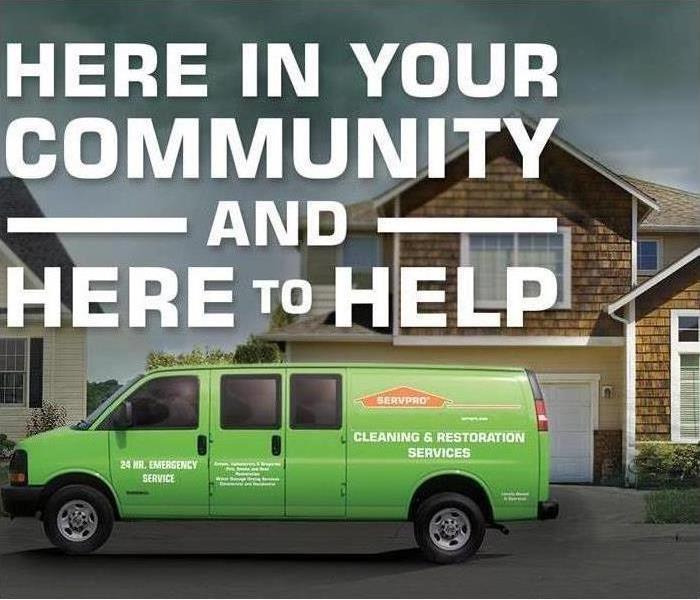 If you live in Greenville, NC, you have Professionals here to Help you in case of Emergency.
If you live in Greenville, NC, you have Professionals here to Help you in case of Emergency.
Our Restoration Professionals of Greenville, NC are available 24 hours a day for fire and water emergencies. If you have suffered from water damage, our crews can get to you fast to take care of the situation. This fast response is important, since just a few hours can make a huge difference.
Always here for you
Dealing with an emergency can be a stressful, frustrating, and emotional experience. We here at SERVPRO understand this, and are here for you throughout the process. If you need experts that are compassionate as well as capable, call us at: (252) 329-7205.
Prepared to help
If you do call us for an emergency, we will ask you a few things to gauge the situation and to prepare our responding personnel with the correct equipment. We may ask questions such as:
- Your name and contact information
- The address we are needed at
- If you have applicable insurance coverage, and through what company
- The estimated time of emergency (remember, time is crucial!)
- The cause of the emergency, if known
- What steps have been taken already
- Is there power available for our crews to use
If you or someone you know finds themselves needing professional cleanup & restoration services, the compassionate experts you can trust at SERVPRO® of Pitt/Greene counties are Here To Help® 24/7 at 252-329-7205.
#LikeItNeverEvenHappened #HereToHelp
Do You Have Renters Insurance?
2/25/2022 (Permalink)
 Keep Calm and Buy Renters Insurance
Keep Calm and Buy Renters Insurance
Did you know that 95 percent of h have a homeowner’s insurance policy, but only 37 percent of renters have renters insurance? In most cases, property managers have insurance on the structure, but not the items inside the structure. So, when a tenant gets renters insurance their policy protects them in several different ways.
Personal Belongings. A basic policy will reimburse you if your property is damaged, lost, or stolen.
Fire/Wind Damage. Costs associated with fire and damage caused by high winds are covered by a renter’s policy.
Liability Protection. Renters insurance provides liability protection that covers you against lawsuits for bodily injury or property damage done by you or your family members.
Additional Living Expenses. If something were to happen to your apartment and it became unlivable. Renters insurance will pay or help pay for other living arrangements.
Coverage may vary depending on who you have the policy with, but the average r insurance policy is only $144 per year or $12 per month! So, if you don’t have renters insurance you should look into a policy today. You never know what could happen. We hope you never have to experience damage to your apartment! Luckily, we work with your insurance for a stress-free claims process.
Checklist of Items To Throw Away After a Fire
2/24/2022 (Permalink)
 Learn More about which Items To Throw Away After a Fire. If you have more questions, just contact us.
Learn More about which Items To Throw Away After a Fire. If you have more questions, just contact us.
If there is a fire in your home in Greenville, NC, many of your belongings may be able to be cleaned and saved. Draperies and other fabric can be cleaned and sometimes furniture can be salvaged. Fire restoration experts may even be able to get your electronics that don't come into direct contact with the flames back in working order. There are certain items, however, that you should always throw away after a fire, even if they look OK.
What should I Throw Away after a Fire?
Throw Away Food
A home fire can ruin the food in your kitchen, fridge and pantry, even if the fire was in a different room. These items may have smoke or soot damage, and that's not something you want your family to ingest. Additionally, high heat can spoil the food even if the outer packaging is intact. Go through your pantry first and toss vulnerable items:
- Bulging cans
- Open packages
- Anything with visible soot or extinguisher residue
- Burned or melted containers
You should definitely get rid of any food items that are on the counter or out in the open. Don't assume that a closed refrigerator door offers enough protection against the fire, especially if the power was off for several hours. It's better to throw out food that may be spoiled than to take the risk of eating it.
Toss Out Cosmetics
Your skin is your biggest organ, and its purpose is to protect you from toxins. What you put on your body is just as important as what you eat. Therefore, it makes good sense to use similar guidelines when going through toiletries and cosmetics after a fire. Throw away anything that has been subjected to high temperatures. Such an environment can alter the chemical makeup of cosmetics, causing them to spoil. Anything in a burned package should be thrown out as well.
Don't stop at your makeup bag. Go through any cleansers, moisturizers and skin treatments you find. Toothpaste and mouthwash may also be compromised. Check the items in your shower, particularly if you know that the room was subject to a significant increase in temperature. Once again, it's better to err on the side of caution when deciding which cosmetics to toss.
Get Rid of Medication
Your medicine cabinet requires special attention, especially if it is located near the area of your home that sustains the most fire damage. Throw out any pills or tablets that you find. Topical creams and ointments should be tossed as well.
You may be able to salvage some bandages in your first aid kit, as long as they don't smell like smoke and show no signs of damage. If your inspection reveals any issues, however, throw them away. Make a list of everything you have to get rid of so that you can include it on the insurance claim.
It may be disheartening to have to throw away so many items after a fire. However, it's better to replace everything than risk the consequences of contaminated food, cosmetics or medication. If you don't know what to do with a particular item, the mitigation team can help you decide.
Storm Restoration Frequently Asked Questions
2/23/2022 (Permalink)
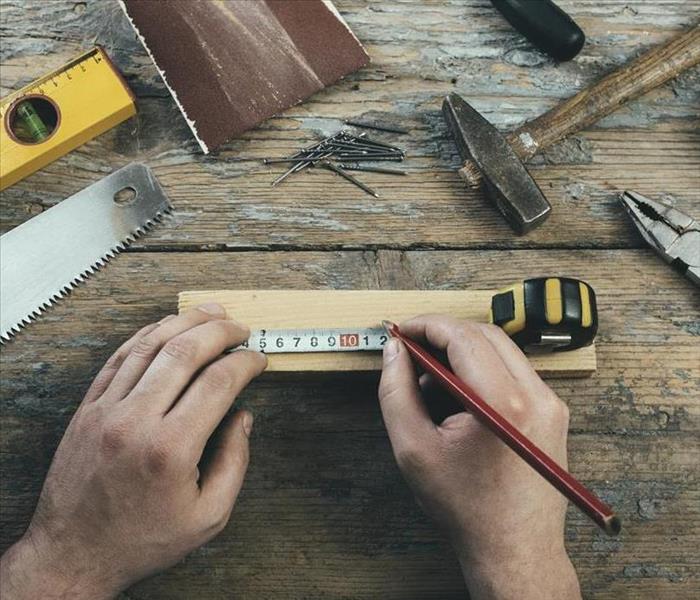 Be ready for Process of Storm Restoration by following these Frequently Asked Questions.
Be ready for Process of Storm Restoration by following these Frequently Asked Questions.
Are you confused by terms such as "tear out" or "restoration?" If so, you are not alone. Fortunately, most homeowners don't deal with flood damage regularly. These are some of the most commonly asked questions about the restoration process.
Storm Restoration FAQ
If you are dealing with water damage and you aren't quite sure what is going on with the restoration, the answers to these questions may help.
1. What Should Be My Priority When I Can Start Restoring My Home?
Your top priority is getting your home and contents dried out. The longer your home stays wet, the more damage you will have from rot, corrosion and mold. Aim to dry out your home within 24 to 48 hours. Trying to dry a flooded home by yourself is a big job, so you may want to contact a flood restoration company in Greenville, NC, to assist you.
2. Does Bleach Kill Mold?
Mold is a common problem in homes that have been flooded. Bleach can kill some types of mold, but it doesn't prevent regrowth and it may miss mold spores that are under the surface.
If you have small areas of mold, attempting to clean them yourself may work, but for large mold problems, you may want to call a mold remediation company.
3. How Can I Prevent Mold?
The main defense against mold is to clean and dry as much of your property as quickly as you can. You may also need to discard materials that can not be effectively cleaned and dried. Many restorations begin with a tear out that removes drywall, carpet and insulation up to the flood line. These materials can not be restored and removing them makes it easier to access other areas that need to be cleaned and dried.
Removing wet materials from your home also reduces the moisture level, which can help lower the risk of mold. Wet contents that can not be cleaned should be thrown out. Contents that can be restored should be moved outside to dry.
Increasing ventilation in the home by opening doors and windows and running fans may also help.
4. Do I Need To Have My Termite Treatment Done Again?
Soil treatments are usually not water-soluble and should still be in place unless the soil where they were applied has washed away or been covered by mud or silt. If you are using termite bait stations, the saturated material inside the stations must be replaced. While your walls are accessible, it may be a good time to inspect them for hidden termite damage and moisture control issues.
It may also be an ideal time to apply a penetrating borate treatment to structural wood to protect against termites and decay.
5. Do I Need To Replace Exterior Sheathing?
Sheathing is the material attached to the exterior side of wall studs. Different types of sheathing respond to flooding differently. Plywood usually recovers from flood damage well. Most other materials are not flood resistant.
Hopefully, once you get your home restored you will never need to use the phrase "tear out," again. However, if you do, you are now armed with the knowledge you need.
How To Recognize When To Call Professionals for Pipe Burst Cleanup
2/19/2022 (Permalink)
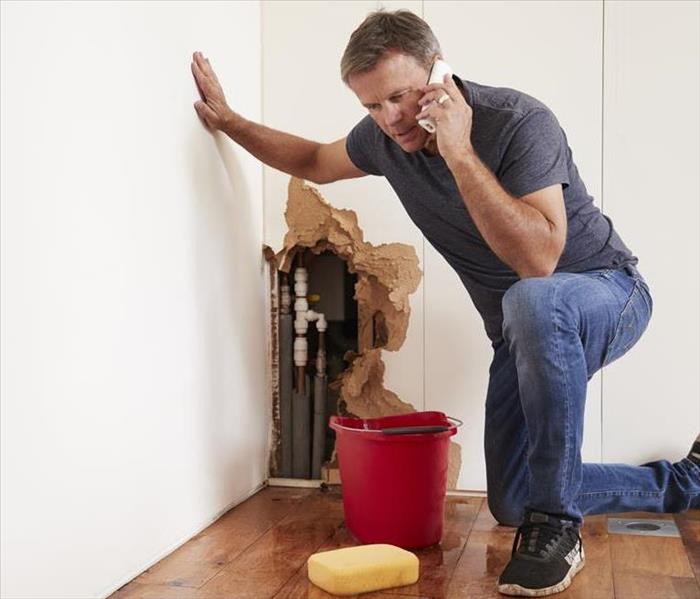 If you experience a Pipe Burst in your Greenville, NC property, Call Professionals for a better advice.
If you experience a Pipe Burst in your Greenville, NC property, Call Professionals for a better advice.
You know that acting immediately is crucial to recovering from flooding, but the cost and effort of that pipe burst cleanup can be prohibitive. Even with great insurance coverage, you may be tempted to try handling the cleanup and recovery on your own.
The truth is, if there's minimal water and no contamination, you may have the resources to tackle the problem. However, you must recognize when calling an experienced water damage or sewer cleanup company is the best course of action.
It's Time to Call Pipe Burst Cleanup Professionals
Safety should be your top priority whenever your property is affected by water damage. Even a tiny bit of water that comes into contact with electricity can lead to significant danger. Your first steps should include getting people out of harm's way, shutting off the water supply, and turning off the electricity. There are several other safety concerns during flooding:
- Gray or black water (Category 2 or 3) may carry hazardous contaminants. Keep people away from contact with the water.
- Sitting water may weaken structural elements, and this could lead to injuries, such as when someone puts their foot through the floor.
- Waterlogged contents can be very heavy. Avoid injuries from trying to lift and carry items that have absorbed a lot of water.
It only takes a day or two for mold and bacteria to set up home in a moist environment. A professional response is faster and more thorough than most DIY cleanup efforts.
Any concerns you have, in addition to these questions of safety, should prompt you to contact a recovery team in your area.
You Can't Find the Source of Trouble
Some water emergencies are fairly obvious, or at least, it's easy to identify where you need to turn off the water. However, if there's a broken pipe deep within the walls, and the damage has spread so that you can't pinpoint the location, a professional response can save time and prevent a lot of extra damage. With advanced technology, water damage cleanup technicians can quickly locate and resolve the trouble.
Water Damage Is Widespread
It may be possible to catch an overflowing toilet quickly enough to respond to a clog and get the floodwater cleared away, but this isn't always the case. If damage has spread from one room to another or from one story of your Greenville, NC, building to those below, you need to contact a restoration company. You should also consider contacting professionals if water has soaked into the flooring or weakened areas of the ceiling or other structural elements of the building.
You Have a Short Time Frame
Many businesses can't afford an extended break from daily operations. If this is true for your business, and it's important to get back to work as quickly as possible, the resources and expertise of water damage recovery professionals are key. There are surely many property repairs you can DIY. However, some situations, such as pipe burst cleanup efforts, require a professional touch. Make sure you understand the difference between DIY cleanup and the need for expert recovery services in Greenville, NC.
Preventing Further Flooding Damage With a Flood Cut
1/25/2022 (Permalink)
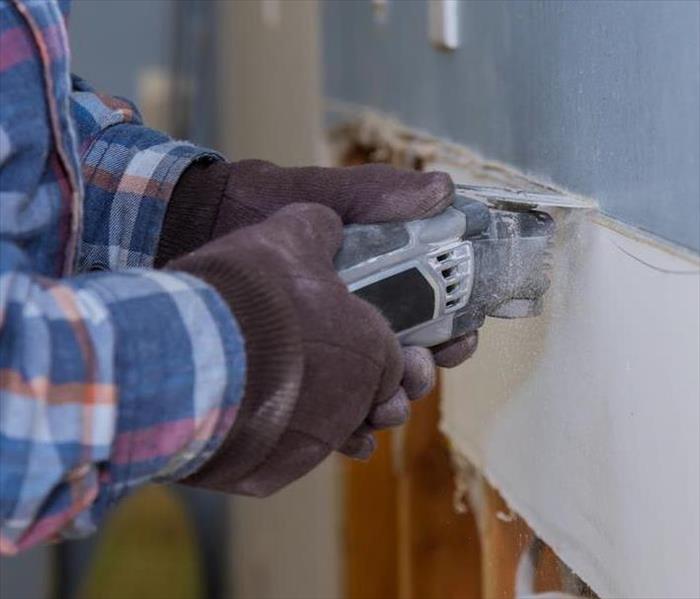 Bear in mind these important tips if you experience Flooding Damage with a Flood Cut in your Greenville, NC house.
Bear in mind these important tips if you experience Flooding Damage with a Flood Cut in your Greenville, NC house.
When flooding affects your Greenville, NC home, it may be necessary for professionals to perform a flood cut. When this happens, water cleanup and restoration technicians remove about 12 to 18 inches of drywall above the flood line. There are several reasons to take this step:
- The damage is extensive.
- Water removal has been slow.
- Your home has been exposed to sewage.
Important information to consider if you experience Flooding Damage with a Flood Cut
Although it may seem frustrating at the time, a flood cut can prevent further damage from happening.
Why a Flood Cut Is Part of Recovery After Flooding
It isn't always necessary to make a flood cut. If it's easy to see the extent of damage and there hasn't been a lot of trouble, the cleanup process could be straightforward. This is especially true if there isn't any danger of contaminants in the water. However, it is often necessary to make the cut to determine how much damage has occurred.
The Cut Allows Professionals To Measure the Spread of Damage
Flood damage is hard to limit because water quickly begins seeping into structural materials of the home and into the furnishings and belongings throughout the home. As the water begins to recede, it may be obvious that drywall has absorbed a lot of water. Unfortunately, this type of extensive exposure can often mean that damage has occurred where you can't see it. Mold growth behind the drywall is a real concern. The flood cut allows professionals to accurately measure how widespread and severe the damage is.
Water Damage Quickly Spreads Through Porous Building Materials
During heavy storms, it may be days before it's possible to get your home cleaned up and dried out. This provides plenty of time for humidity levels to build in areas of the home that weren't initially affected. In this case, there may not be any choice but to tear out some drywall. The flood cut is the first step in this process and gives professionals an idea how much repair and restoration is required.
Raw Sewage, Chemicals, and Other Contaminants May Be Present in Drywall and Insulation
Floodwaters often carry contamination as sewer systems are backed up or succumb to cracks and leaks from building pressure. A flood cut must be performed in these situations to remove all drywall, insulation, and other porous materials. Once water damage cleanup professionals have removed contaminated materials, they will test your home to be sure that there's no trace of bacterial and viral pollutants remaining.
Older Homes Are Often Problematic
How old is your home? If there's any chance that lead paint or asbestos were used in building your home, it is important that the tear out process is completed by trained professionals. Disturbing lead-based paint or insulation with asbestos without the proper techniques and protective gear can lead to increased risk.
When you really just want to get your home cleaned and dried, watching someone tear out large amounts of drywall can be frustrating. However, this step provides professionals a chance to determine how much damage there is while also preventing new damage from taking place. It is a great way to spot mold and contamination from sewage. It is also an important way to be sure that recovery from flooding is happening safely.
Ways To Prepare for a Spring Thaw
1/13/2022 (Permalink)
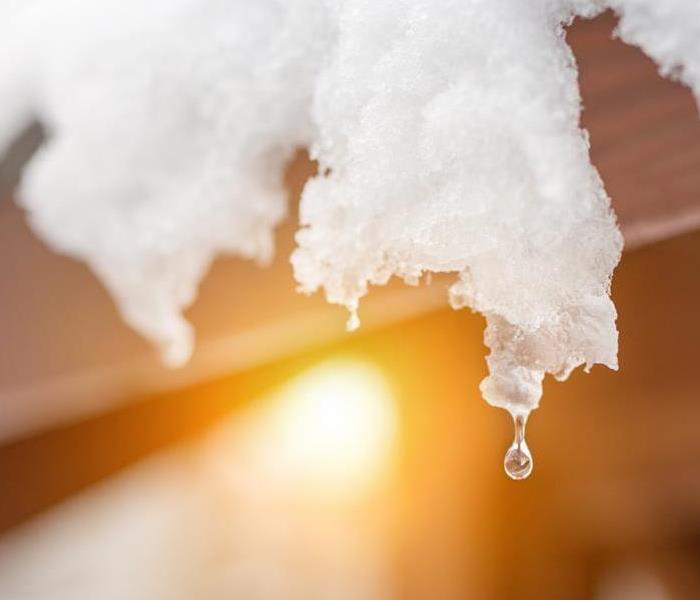 Keep these tips in mind as you prepare for the Spring Thaw in Greenville, NC. If any doubt arises, please contact us.
Keep these tips in mind as you prepare for the Spring Thaw in Greenville, NC. If any doubt arises, please contact us.
When the frigid temperatures in Greenville, NC begin getting warmer, the snow and ice that has been on the ground will eventually melt. The water has to go somewhere, and you don't want it to invade your commercial building. Flooding is a real possibility of meltwater developing when a great deal of snow and ice thaw relatively quickly.
You should take various actions outdoors that can help prevent water from intruding into the building. However, you will also need to prepare the inside of your facility for the possibility of a spring flood.
When you're preparing for a spring thaw, one of the most crucial actions you can take is inspecting your sump pump to ensure it is working correctly. A good sump pump can mean the difference between incurring minor or even no water damage and sustaining a significant loss if you have a water intrusion. Even a relatively small amount of water that isn't immediately removed will require the assistance of a flood damage restoration company.
Perform Outdoor Maintenance
As you prepare for the spring thaw, you should be mindful of several aspects, especially if your landscape is more elevated than your building. Taking care of the outdoors will help prevent problems indoors.
1. Check the Slope of the Ground
The grading of the land around your building can significantly impact the amount of water that accumulates around the structure. The ground should slope so that water will flow away from the lowest floor of the building.
2. Remove Snow and Ice from the Foundation
Snow that is packed against the building can saturate the ground around the foundation. This accumulation can eventually result in flooding. Moisture can seep through even the tiniest cracks in the foundation. Try to shovel the snow and ice as far from the building as possible (at least three feet away) to ensure it's far enough out as it melts.
3. Inspect for Cracks in the Foundation
After removing the snow next to the building, inspect the foundation for cracks. If you notice any, play it safe by contacting foundation waterproofing professionals.
4. Clean Gutters and Downspouts
Ensuring all of the building's gutters and downspouts are clear is a significant part of keeping water out of the inside of the structure. Also, make sure the downspouts are directed away from the building properly. Even if you don't have the leaves and debris as much as the other times of the year, snow and ice can refreeze in them and cause a buildup. This could cause a deluge of water to accumulate around your building when it melts.
Whether flooding results from melting snow and ice or a bursting frozen pipe, it can cause a significant loss. It's vital to know how to prepare for a spring thaw. It's also beneficial to learn the signs that water has begun invading or determine if there is a significant risk beforehand. Plan on following these tips well before the warmer weather arrives so you can be ready for a potential issue. In the meantime, review your building insurance to ensure it covers everything you need.
Can Contents Be Save After a Fire?
1/6/2022 (Permalink)
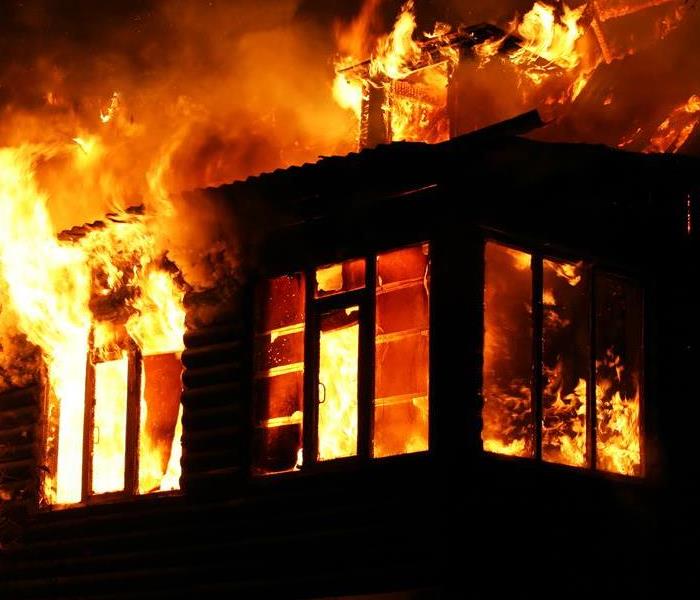 Follow these tips to find out what items to keep after a Residential Fire.
Follow these tips to find out what items to keep after a Residential Fire.
One of the most difficult decisions for homeowners who have experienced a house fire is deciding whether to repair or replace contents. Some items can be restored by dry-cleaning or other methods, while others need to be replaced.
Which Contents Can Be Restored With Content Cleaning?
Most homes can be restored after a fire unless there is structural damage. However, it isn't practical to restore some contents.
Consider these tips to know what items to keep after a Fire
Which items can be saved and which should you toss out?
1. Clothing, Upholstered Furniture and Other Fabric Items
Fabric items that have been burnt may not be able to be saved, though it may be possible to recover some upholstered items that only have damage to the fabric covering. Items that have smoke damage, but have not been damaged by flames may be able to be cleaned by dry-cleaning or other methods. Dry these items as quickly as possible to prevent mold growth. Consider using content storage while your home is being repaired.
2. Electronics
If the internal electronic components have not been damaged by heat or water, electronics can often be saved. However, the cost to repair water-damaged electronics is usually higher than replacing the items.
3. Wood Furniture
If your wood furniture is wet due to the water used to fight the fire, dry it quickly to avoid warping. Smoke and soot damage can usually be cleaned. If the wood is charred from the flames, you may need to replace the item.
4. Non-Perishable Food
Food in open containers or stored in cloth, cardboard or thin plastic bags should be discarded. Items in sealed cans may be OK, but if those items were exposed to high temperatures the contents may spoil or develop an unpleasant taste. In general, it is better to throw out any food items that you can't be sure did not come in contact with high heat or chemicals.
5. Perishable Food
Refrigerated or frozen food may be safe to eat if it was maintained at a safe temperature and your refrigerator or freezer was not damaged by the fire. A refrigerator without power can keep food safe for about four hours. Throw out perishable food if you find any signs of smoke or soot damage in the refrigerator, the power went out for six or more hours, the food smells off or frozen food is no longer hard and cold.
6. Cosmetics and Medicine
If you find any signs of smoke, soot or other damage, throw these items out. If the items were stored in an area that was not damaged by flames, high heat, smoke or chemicals they may be safe.
7. Documents and Photos
Items made from paper are among the most vulnerable to fire damage. However, important documents and photos may be restorable in some cases. Contact a fire remediation company in Greenville, NC, if you have valuable documents and photos you want to try to restore.
When making decisions about whether to keep contents or throw them out, it is important to consider whether it is possible to clean items through dry-cleaning or another method. You should also consider the cost of restoring items versus the cost of replacing them.
Lightning Safety
12/24/2021 (Permalink)
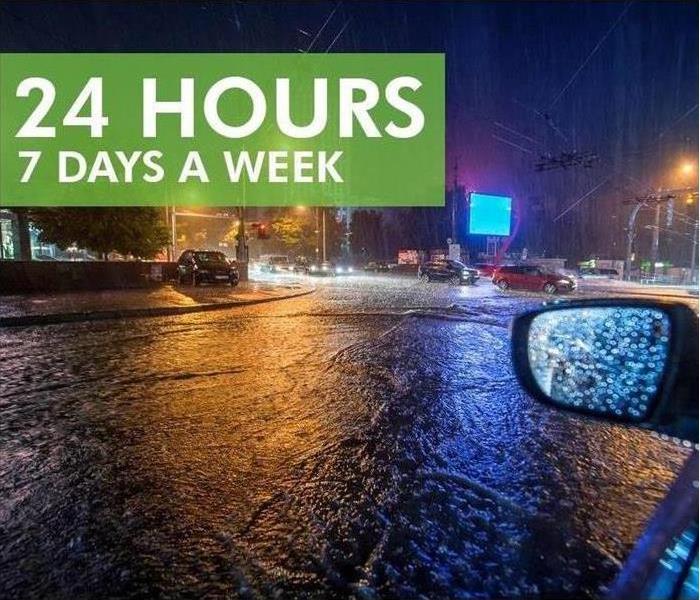 We are always available if the weather damages your home or business.
We are always available if the weather damages your home or business.
The chances of getting struck by lightning are only around 1 in 500,000, yet it still manages to claim one of the highest fatality rates among weather-related incidents.
Tips for Lightning Safety.
To reduce your chances of being struck by lightning, here are some helpful tips:
Know The Weather
Make a backup plan to bring yourself and others indoors in case of inclement weather. Closely monitor weather stations before engaging in outdoor activities and plan accordingly.
Get to Safety
Understanding what makes for a safe shelter can be crucial—things like homes, offices, supermarkets, shopping malls, and hard-topped vehicles with all windows up are generally considered as such. Be sure to note potential shelter locations should the weather take a turn for the worst. Remember the phrase "When thunder roars, go indoors."
What to Avoid
If possible, stay as far from windows, doors, and porches as possible. Also, avoid concrete walls and floors—the metal wires, bars, and conduits often found in concrete can create a path for lightning to follow.
Stay Dry
Thunderstorms are no time to enjoy a bath or to take a shower, wash dishes, or have any other contact with water. Like with concrete and its metal pathways, lightning can travel through plumbing and fixtures.
Turn Off Electronics
Avoid any electronics plugged into your Greenville, NChome wirings, such as computers, game systems, washer and dryers, microwaves, ovens, dishwashers, or anything that can be used as a conduit for lightning traveling through an outlet. Using a surge protector or outright unplugging all of your electronics can save them from becoming damaged as well.
One Database, Many Professionals: Filing Insurance Claim Paperwork
11/29/2021 (Permalink)
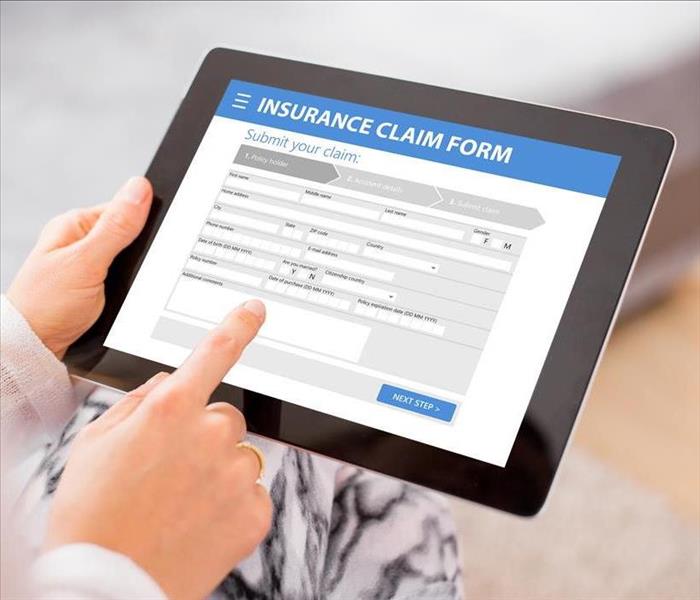 If your Greenville, NC property is damaged, complete the insurance claim form as soon as possible.
If your Greenville, NC property is damaged, complete the insurance claim form as soon as possible.
Whether you're an insurance agent or a homeowner, there are important benefits to completing the insurance claim as quickly as is reasonably possible. SERVPRO cleaning and restoration leaders understand this and work to simplify the necessary paperwork through an electronic claims inventory system:
- Database of electronic files
- Remote access from any location
- Regular progress updates
- Central location of shared information
When this system is put into action, the progress of every claim and the associated cleanup and repairs move forward smoothly.
Why File an Insurance Claim.
Tools To Simplify, Speed Up, and Improve the Insurance Claim
It isn't hard to recognize the advantages of working with an electronic claims system. As an insurance agent or homeowner in Greenville, NC, any tool that increases access to information, heightens the accuracy of the information and makes it easier to share facts and findings is beneficial. Take a closer look at how the SERVPRO electronic claims system helps you:
A Digital Solution That Saves Time
In the past, gathering records and documentation meant traveling to many locations, waiting for paperwork to arrive through the mail, or hoping that faxed information came through clearly. When these files needed to be shared and accessed by many parties, the possibility of mistakes increased and so did the time spent waiting. Today, with electronic files, the information for your insurance claim is entered into an online system and ready to be accessed almost immediately. The same digital file is available to every professional involved in the claim, so there are fewer possibilities for mistakes and misunderstandings.
Simpler Solutions at Lower Costs
A lot of money is spent storing paperwork, providing security for those files, and keeping information safe from humidity and other possible threats. An electronic database takes up less room than rows and rows of filing cabinets. The need for security is reduced because there's less space to protect. The same is true for the steps taken to protect the building from extreme weather, trespassing and vandalism, and normal wear and tear. Even custodial costs are decreased when there aren't any dusty basements to worry about.
This isn't the only way that costs are reduced. Electronic files are stored where individuals can access them from desktops, laptops, smartphones, and other devices. Insurance companies, adjusters, homeowners, and other involved parties don't have to spend as much money purchasing paper, envelopes, stamps, and other physical supplies.
Information Storage Created by Restoration Professionals
If you've used multiple software systems, you've probably recognized that some are easy to use, and others are difficult to navigate. The SERVPRO electronic database and claims system was created by professionals who fully understand the cleaning and restoration industry. The various pages, files, and components of the system are well-suited to ease of use by industry professionals. The system isn't plagued by unwieldy or confusing twists and turns.
Preventative Problem-Solving in One Database
When restoration professionals, insurance adjusters, and agents all have access to an electronic claims service, it is easier to complete each insurance claim. The many benefits created by this database of information limit the opportunities for mistakes cut the filing time significantly, and reduce unnecessary costs.
Prepare for a Visit From Your Home Insurance Adjuster After a Disaster
11/22/2021 (Permalink)
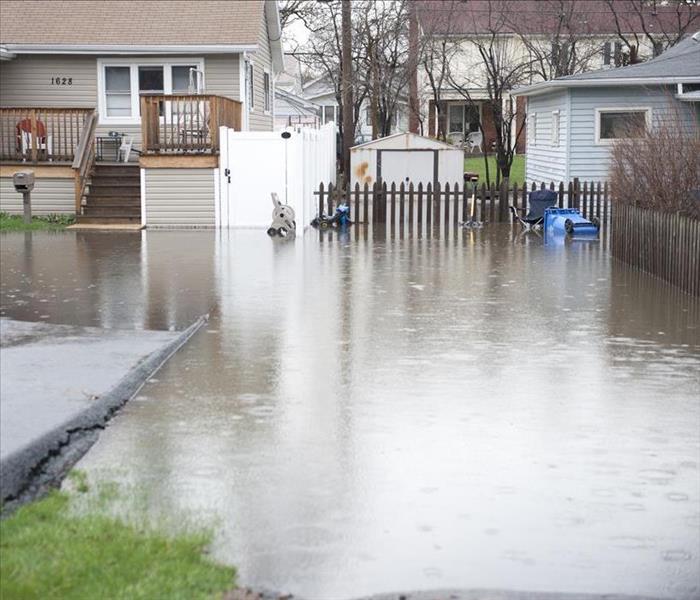 If your Greenville, NC, property is damaged, prepare a visit from your home insurance adjuster.
If your Greenville, NC, property is damaged, prepare a visit from your home insurance adjuster.
If your home sustains a disaster of any kind, a home insurance adjuster will have to visit your Greenville, NC, property. This experience can be anxiety-provoking, though. What should you expect? Will you receive the reimbursement you need from your claim? Your home adjuster will require some specific information about the damage so they can file the claim. There are several ways you can prepare for your insurance adjuster's visit to make the process operate as efficiently as possible for everyone involved.
Begin With These Steps
1. Contact the Insurance Company
First, you'll need to contact the insurance company and give them all the information about the disaster and the damage your home sustained. They'll schedule an appointment for the insurance adjuster to visit to assess the damage. They'll tell you exactly what to expect during the process, explain what is covered and what isn't, inform you of what the adjuster will need, and how you can mitigate damage in the meantime.
2. Photograph All Damage
After a disaster, things can change significantly from one moment to the next, so you should take pictures of all the damage as soon as possible. Capture detailed photographs of as much as you can safely obtain.
3. Make Temporary Repairs
Don't make any changes or repairs before the adjuster's visit unless absolutely necessary to avoid more damage (e.g., tarping a damaged roof to keep more rain and debris from getting in). The insurance company will want you to mitigate the damage if it's an emergency situation, but not anything that can wait without getting worse. Either way, take detailed photos before you do anything.
4. Review Your Homeowners Insurance
Review your homeowners insurance policy so you can be familiar with what is covered and what isn't. You can also prepare yourself with more questions for the home adjuster during the visit.
5. Become Familiar With the Claims Process
Take some time if you can to become more familiar with how the claims process works. The adjuster may offer you a settlement check on the day of the visit. If they determine that there is more damage than initially thought, you may get another check later.
6. Complete Claim Forms
If you can complete the insurance claim forms before the visit, it can be beneficial. Your insurance company may allow you to fill them out and submit them online.
7. Keep All Documents Associated With the Claim
Make sure you keep all the information associated with the disaster and the claim in one file so you can have them at hand when you need them. This file should include insurance company information, damage photos, contact information, repair estimates, bills, and receipts. You should also have detailed work information from storm damage remediation experts or similar professionals in this file.
When your home gets damaged, whether by a storm, fire, or another disaster, it's essential to get the insurance claim process underway immediately. This will allow you to obtain your settlement money quicker to begin repairs. Consider these tips to be better prepared for a visit from your home adjuster.
The Importance of Mold Prevention for Rental Properties
11/20/2021 (Permalink)
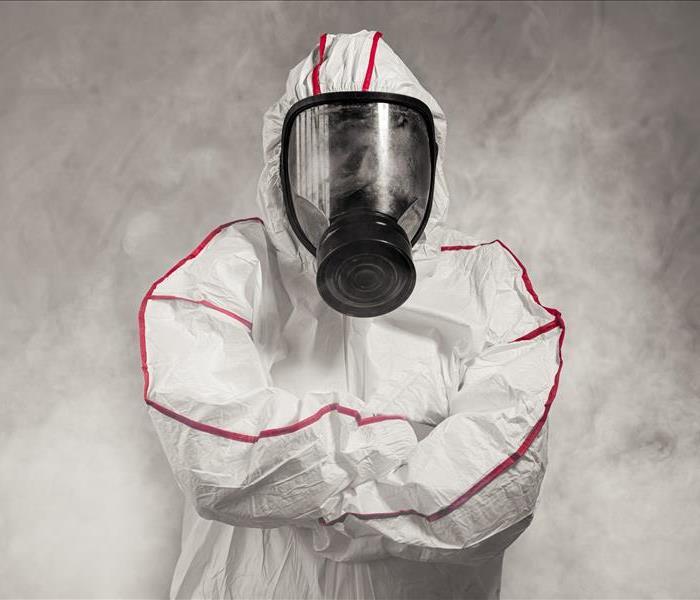 Contact a mold remediation professional if you detect mold growing in your Greenville, NC properties.
Contact a mold remediation professional if you detect mold growing in your Greenville, NC properties.
Owning rental property is a potentially lucrative but stressful venture. One of the main problems is limiting vacancies and protecting your properties from damage during such inevitable circumstances. Mold prevention should be among your primary concerns as it is an often costly and timely issue. There are several things a property owner can do to limit the risks of mold growth during vacancies, including:
- Turn off the main water supply
- Turn down the thermostat
- Keep heat on
While these items will help reduce the risks of mold development, they do not represent everything a property owner can do. You might want to contact a mold remediation professional in Greenville, NC for more information and insight.
Mold Prevention for Rental Property Owners and Managers
Mold is a problem for any rental property, and it is a concern for most property owners. With the constant tenant turnover expected with such investments, buildings can be subject to varying temperature and water usage issues. Therefore, a property owner needs to recognize the risks and adjust to protect the structure and its integral components.
Plumbing Issues Result in Most Mold Concerns
Water damage is among the most common reasons for mold development. However, while the perception might be that a significant leak or break is required for mold to develop, that is not the case. A slow and steady drip can provide enough moisture for mold to thrive.
Therefore, if you want to avoid issues between tenants, it is best to shut off the water supply and drain the system. If there is no water in the pipes, then the risk of breaks or leaks is minimized.
Do not just assume the plumbing is Ok for the next tenant. It is often best to hire a plumber to inspect the system before turning the water back on to ensure everything is in working order.
Heat Can Become a Problem
When there is no one on your property, it is best to keep the thermostat turned down. Mold loves humidity, and if the temp is high enough in the property, it can lead to increased humidity in the building.
However, you do not want to bottom out your thermostat either because that can result in frozen pipes and breaks, leading to mold. It is better to leave your empty building at a consistent temperature, not too hot or cold.
You can install a dehumidifier in the property to help stabilize the indoor environment. If using a dehumidifier, you want to ensure that the humidity level never gets above 50%, which is the maximum level for indoor spaces.
It is also beneficial to inspect the property between tenants to ensure exhaust and ceiling fans are working correctly. Take the time in between tenants to make any necessary repairs and inspections.
Mold prevention is crucial in rental properties, especially during vacancies or tenant transitions. The process does not have to be complicated. You mainly want to maintain a steady temperature, lower humidity levels, and control water supplies. A remediation specialist can help you determine the best preventative steps for your property.
Helping Greenville, NC Residents Overcome Sewage Backups
11/11/2021 (Permalink)
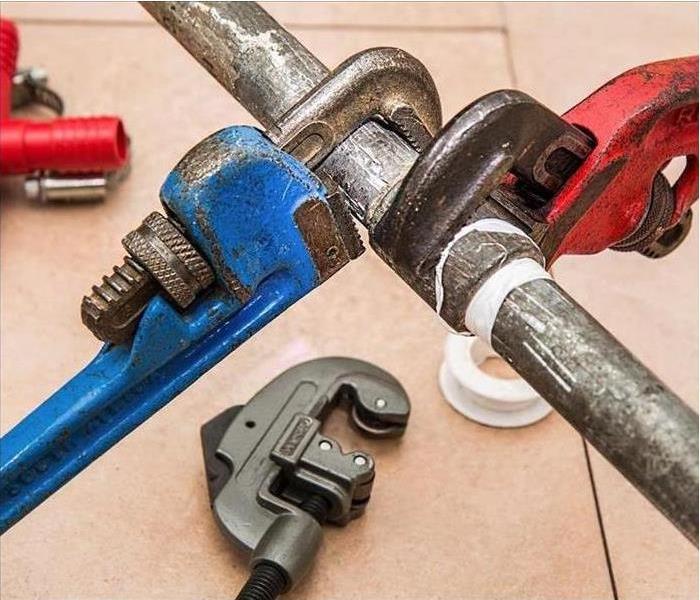 If you have sewage problems in your Greenville, NC home, call us to take care of your home.
If you have sewage problems in your Greenville, NC home, call us to take care of your home.
No Greenville, NC resident wants to find sewer backup in their home, especially if it's where you normally go to clean up and unwind after a long workday—your shower or bathtub. If you’ve been fortunate enough to have never had to deal with such a scene, you may not even realize it could happen. The problem typically lies within your home’s plumbing, often leaving homeowners scratching their heads with what to do. To help you through here are some helpful hints
How to Overcome Sewage Backups.
- Evaluate
Your toilet is often the first indication of a problem. It may begin flushing down a bit slower than usual, then with following flushes, it could even start bringing waste back into the bowl. If you do have a backup, be sure to turn the water valve next to your toilet off so it doesn’t accidentally get flushed again. Also, be sure to look at the contents of the backup for rocks, dirt, or plant mater as these can indicate a broken sewer line.
- Enlist a professional
If the problem remains after attempting to plunge away from the mess of a backup, it is likely that you need the advice and assistance of a professional plumber or water mitigation technician. If water is flooding out into your home, time is of the essence; every minute that passes allows for moisture and contaminants to be absorbed into cabinets, carpet, flooring, etc.
- Clean the affected areas
After the blockage has been cleared and your water is flowing unobstructed again, a specialist such as those available at SERVPRO of Pitt/Greene can begin removing any residue and debris that may still be present, as well as assess if any further steps are needed to bring your home back to preloss conditions.
- Sanitize
After the mess has been cleaned up, you’ll want to have any affected areas sanitized to kill any harmful bacteria and viruses. Our crews can take care of this for you, or direct you to the best available consumer cleaners if you would prefer to take care of it yourself.
Sewage is routed away from our homes for a reason and finding a backup can be devastating, damaging, and far less than pleasant. Let professionals take care of you and your home so you can rest easy knowing the mess is gone.
How to be prepared for a Hurricane
10/29/2021 (Permalink)
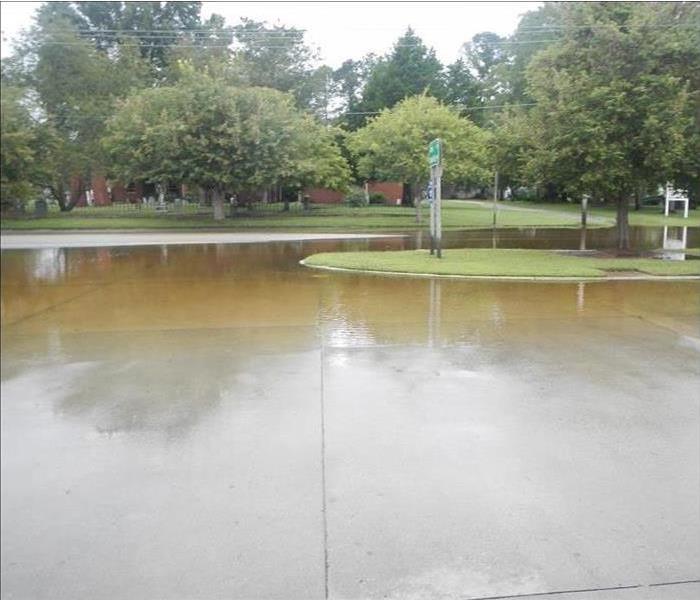 Streets of Greenville Flooded
Streets of Greenville Flooded
Our crews are highly trained and we use specialized equipment to restore your property to its pre-storm condition.
Why Call Us
Faster Response
Since SERVPRO is locally owned and operated, we are able to respond quicker with the right resources, which is extremely important. A fast response lessens the damage, limits further damage, and reduces the restoration cost.
We also have equipment and teams ready to go in case you have an emergency.
Resources to Handle Floods and Storms
When storms hit Greenville, NC, we can scale our resources to handle a large storm or flooding disaster. We can access equipment and personnel from a network of 1,650 Franchises across the country and elite Disaster Recovery Teams that are strategically located throughout the United States.
Be Prepared
Before the storm hits make sure you have a basic disaster kit ready. Having these supplies ahead of time will save you the frustration of going to the store right before the storm hits. Below are some recommended supplies for your kit:
- Water
- Battery-operated lanterns
- Flashlight
- Matches
- Can Opener
- Duct Tape
- Extra blankets
- Clean Clothes
- First Aid Kit
- Food (3 days worth)
- Garbage bags
- Dust Mask
Every homeowner can do things around your home now to save you time when you need it.
- Move furniture away from windows
- Remove outdoor items
- Fill gas tanks
- Board up windows
- Get extra cash
- Trim dead branches from trees
- Store important documents in waterproof containers
Have Storm or Flood Damage? Call Us Today
5 Storm Tips for Homeowners
10/28/2021 (Permalink)
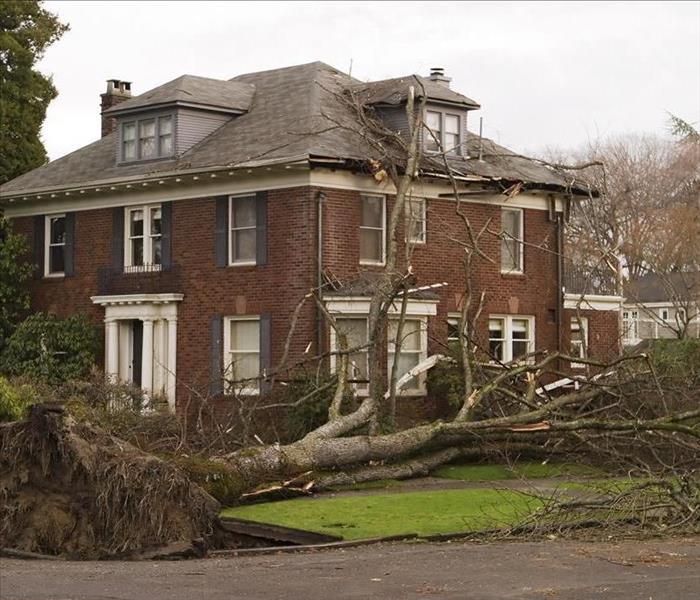 Storms can seriously damage your residence in Greenville, NC.
Storms can seriously damage your residence in Greenville, NC.
Changes in weather patterns have to lead to more frequent and more severe storms. Homeowners need to know what steps to take when their homes have been damaged by a storm. These storm tips can help.
5 Things To Do When You Have Storm Damage
Storms can create conditions, such as damaged roofs or wet materials, that can continue to damage property after the storm is over if steps are not taken to mitigate the damage. These are five things you should do if you have storm damage.
1. Take Safety Precautions
Storms may come with high winds, flooding, and other conditions that can cause injuries. Check on your household members to make sure no one has been injured. Be alert for hazards such as exposed nails, broken glass, standing water, and debris. Avoid downed power lines and do not enter standing water. Shut off the gas to your home if you smell a leak. Do not drive into standing water.
2. Take Photos of the Damage
Take photos of the interior and exterior damage to your home. Avoid entering any part of your home that may have structural damage. Photograph any evidence of roof lifting or missing shingles. Look for missing or damaged exterior siding and broken windows or doors. Check for broken or damaged appliances. Inspect your basement or crawlspace for flooding. Document moisture-damaged walls, flooring, furniture, and carpeting. Inspect electrical outlets and appliances for fire damage caused by downed power lines or shorts. Photograph any damaged contents.
3. Contact Your Insurance Company
Call your insurance company as soon as you are able. Storm damage is usually widespread and insurance companies will be busy. You don't want to end up at the back of the line because you waited to report your claim. Ask any questions you have about your policy. Your insurance professional may provide additional storm tips to mitigate damage to your home. The company will usually assign an adjuster to come to assess the damage to your home. If you need to make temporary repairs before this, keep your receipts. Ask your adjuster about utilizing a storm restoration company in Greenville, NC, to assist with cleanup.
4. Mitigate Your Damage
If you have broken windows or doors or holes in the roof or walls, cover them with tarp or plywood to prevent additional damage from wind and rain. If your home is not safe to live in while you wait for permanent repairs, consider moving into a hotel room or rental or staying with a friend or family member.
5. Organize Your Receipts
Retain and organize any receipts and other records you have related to your insurance claim. Depending on your policy, you may be able to get reimbursement for temporary repairs and loss of use of your home. If you are having difficulty meeting expenses, ask your insurance company if you can get partial payment of your settlement.
Dealing with the aftermath of a storm can be overwhelming for many homeowners. However, adding these storm tips to your storm preparation plan can make things easier.
Get Rid of Unwanted Smells With Professional Home Deodorization
10/23/2021 (Permalink)
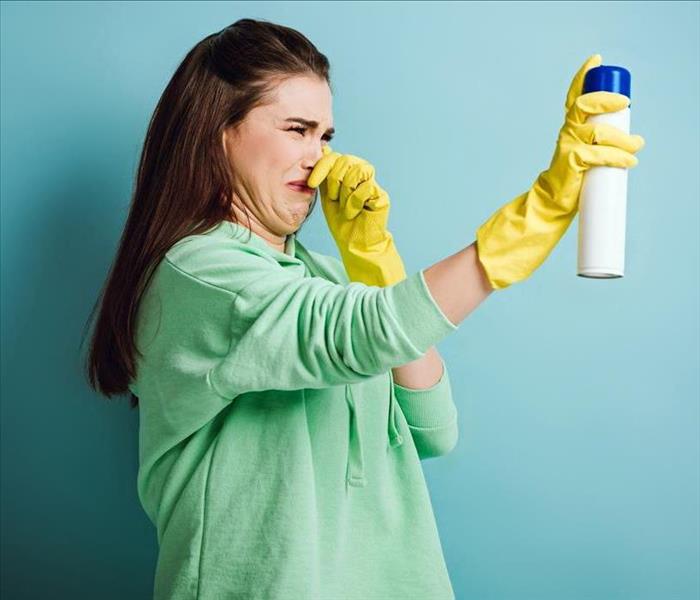 Deodorize and clean properly to get rid of the odor in your Greenville, NC, home.
Deodorize and clean properly to get rid of the odor in your Greenville, NC, home.
Many things can cause odors in your home, and even with a thorough cleaning, smells may lurk where you can't find them. Successful home deodorization involves three basic steps:
- Identify the sources
- Treat the smells
- Prevent new odors
Don't wait to tackle unwanted smells in your Greenville, NC, home. The sooner you take action, the less time the funk has of settling deep into mattresses, carpets, walls, and appliances.
Prepare for Successful Home Deodorization
If you don't know where smells originate, it's difficult to get rid of them. The following list of common sources of unpleasant odors could help you figure out where to get started:
- Bits of old food and trapped moisture in the dishwasher or the disposal
- Sticky spills and moldy leftovers in the refrigerator
- Carpets and padding that have absorbed dust, pet dander, and body odors
- Mattresses, sheets, and blankets that haven't been washed
- Closets full of funky clothes and shoes
- Bathrooms, laundry rooms, and mudrooms
- Laundry appliances
- Lingering cigarette smoke
Some disagreeable whiffs are a symptom of deeper trouble. For example, a musty smell could signal a clog or broken pipe in your water line. Rodents can leave your home smelling like a wet dog, and a smoky or electric smell could be a symptom of frayed wiring. Once you know where to find unwanted odors, you can take steps to successfully deodorize your home.
Plan Professional Treatment for the Source of the Problem
Identifying the source of unpleasant odors is just the first step in the home deodorization process. Sometimes, homeowners pick up candles and other air fresheners in attempts to mask smells. As noted above, however, unexplained odors often present real concerns about physical damage. Even if you have found the cause of strange and unpleasant odors, a professional response may be the best approach for treatment. There are several reasons to hire an odor cleanup and deodorization company:
Smelly mold requires specialized treatment.
- Using the wrong cleaner could cause further damage.
- Masking, rather than treating smells, allows original causes to get worse.
- Experts have the latest equipment and technology.
- Professionals have the equipment to remove allergens and bacteria.
- Comprehensive cleaning extends the life of carpets and padding.
It isn't easy to thoroughly clean everything that could cause a funk in your home, and professional treatments generally last longer than DIY efforts.
Develop New Habits of Preventative Cleaning
While professional treatment for odors in your carpets, appliances, and structural elements of your home is best, there are some preventative steps you can take to improve the atmosphere of your home. Naturally, many of these steps focus on cleaning tasks:
- Take out the garbage regularly
- Clean out your fridge
- Wipe down appliances, inside and out
- Open doors and windows for fresh air
- Install an air purifier
- Bathe and brush pets
- Run laundry frequently
Remember, an effective home deodorization process begins by knowing where smells are most likely to originate. Regularly schedule professional cleaners to freshen up carpets, deal with smells that are warning signs, and treat hard-to-combat smells, such as cigarette smoke. Finally, develop housekeeping habits that target some of the most common trouble spots throughout your home.
A Pipe Burst Has Flooded My Hardwood Floor! Now What?
10/12/2021 (Permalink)
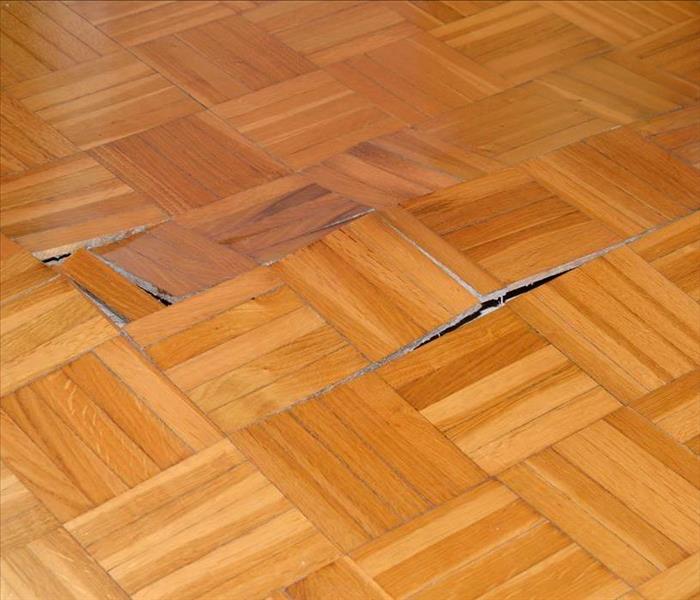 Hire water professionals to avoid mold damage after a pipe bursts in your Greenville, NC, commercial.
Hire water professionals to avoid mold damage after a pipe bursts in your Greenville, NC, commercial.
If your Greenville, NC, commercial building has hardwood floors, a burst pipe could be tragic. Depending on the amount of water, it may or may not be salvageable. There is hope, however. You can take some simple steps that will give you the best chance of saving most, if not all, your floor. Being proactive and learning them ahead of time may one day mean the difference between some light repairs and total tear-out.
Steps for Drying a Wood Floor
1. Extract the Standing Water
The most efficient way to remove the standing water is with a wet/dry vacuum. Use a squeegee to pull the water towards the vacuum hose to get it up quicker. If you don't have a wet/dry vacuum available, a mop or towels will do the job.
2. Clean and Disinfect the Floor
Wash the floor with a gentle soap and disinfectant solution mixed with warm water. Scrubbing the floor and baseboards with a stiff brush, cleaning as much dirt and organic material away as possible can help prevent mold growth. Mold spores are virtually everywhere. However, mold needs a food source to survive and grow. The mold spores already there will have less opportunity to grow into a full-blown mold infestation on a clean, sanitized floor.
3. Look Out for Mold
Hiring water damage restoration professionals is highly recommended after a pipe burst to inspect for and get rid of mold. They have the expertise and industrial equipment to ensure the mold is completely gone as quickly as possible and won't come back. However, if you opt to tackle this task yourself, use a mold killer such as trisodium phosphate and a stiff brush to scrub away mold or any suspect discoloration. Contrary to popular belief, you should NOT use bleach; it will only temporarily remove the mold. Finally, after cleaning it thoroughly, rinse the area with clean water (and a damp cloth; don't pour the water on the floor) and dry it immediately. Then, inspect the area for signs of mold and additional water damage.
4. Dry Everything Thoroughly, Yet Steadily
Now, it's essential to dry the floor thoroughly, but wood flooring must be dried steadily and not too fast; otherwise, it can crack. Mold can take hold quickly, beginning growing within 24 hours of water exposure. If the outdoor humidity is lower than the indoor humidity, you can open doors and windows to enable the fresh air to flow through the space. You can also run fans and dehumidifiers.
An influx of water from a pipe burst is never a good thing. When you have a wood floor, it can rise to a whole new level of severity. Hardwood floors are beautiful, but they also take more maintenance and care than other types of flooring. Although a hardwood floor will probably sustain some irreparable damage, there are ways to combat the severity loss if you quickly begin the wet floor cleanup process. After an influx of water, time is not on your side; every second counts in preventing additional loss. Knowing how to deal with this situation in advance can be a tremendous help should the situation arise.
What Are the Three Types of Contaminated Water?
10/5/2021 (Permalink)
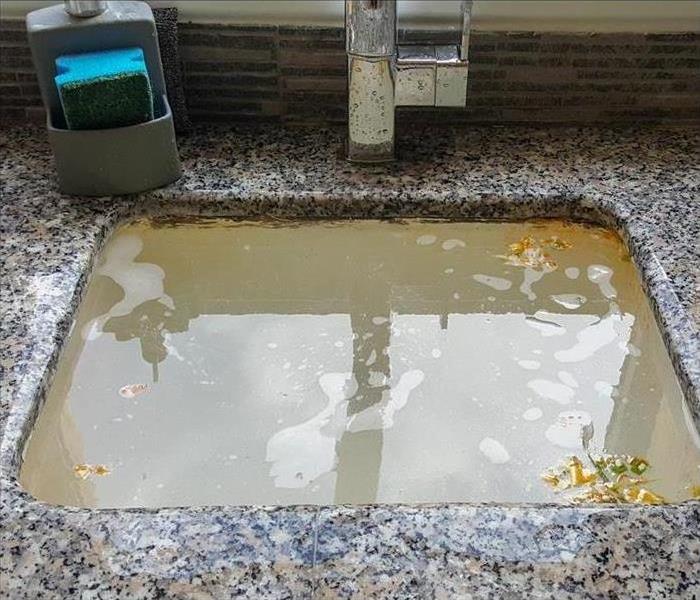 Contaminated water is unsafe.
Contaminated water is unsafe.
Water damage is classified by water remediation professionals according to whether the damage is from contaminated water or clean water. The source of the water determines which category the water damage is placed in. There are three categories of water damage.
3 Types of Contaminated Water
Category 1
Category 1, also known as clean water, is water damage from a clean source, such as a supply line, a broken pipe, or overflow from a clean bathtub, sink, or toilet. Water from these sources should not contain significant amounts of harmful bacteria or chemicals and can generally be safely removed by property owners.
Category 2
Category 2 contaminated water is called greywater. This type of water may contain some chemicals, bacteria, or nutrients that feed microorganisms but is not considered grossly unsanitary. Examples of this type of water include dirty water from a washing machine, bathtub, or sink or an overflow from a toilet that contains urine, but no feces. Protective gear, such as rubber gloves, should be used when handling this type of water and steps should be taken to sanitize surfaces that have come into contact with it.
Category 3
Category 3 water is called black water. This water contains a high level of bacteria, microorganisms, or harmful chemicals. This type of water should be handled by a professional water remediation company in Greenville, NC, because safety equipment and training are needed to safely handle it. Examples of this type of water include raw sewage, floodwater from rivers, streams, and oceans, stagnate water, groundwater and toilet overflows that contain feces or originate from beyond the toilet trap. Additionally, category 2 water that has been standing for more than 48 to 72 hours may be considered category 3 because of bacteria growth.
Contaminated water is generally unsafe for property owners to attempt to clean. To avoid safety hazards and potential additional damage, it is best to contact a professional to clean and sanitize water damage that could contain harmful substances.
How SERVPRO of Greenville Can Help Your Business Prepare For The Worst
10/5/2021 (Permalink)
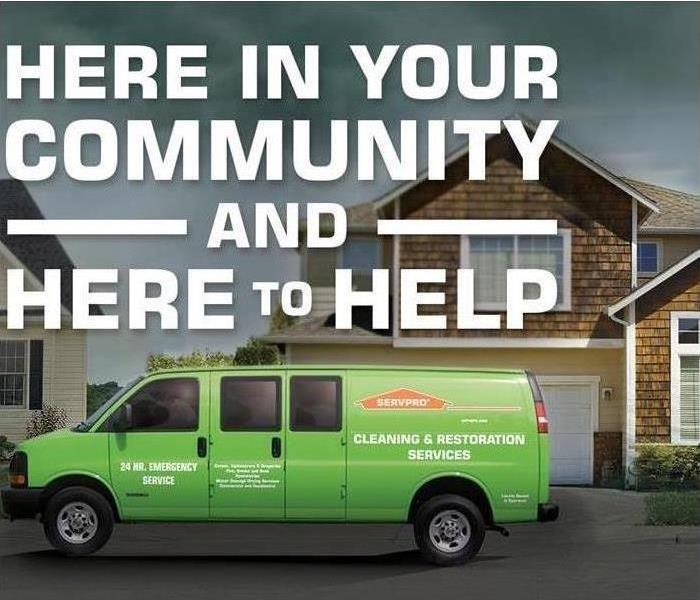 Be prepared for unexpected emergencies.
Be prepared for unexpected emergencies.
While most companies have measures in place to take care of their employees and business data in case of an emergency, many overlook the next steps in getting the facility ready to go again. SERVPRO of Greenville is available and ready to provide you with the tools and planning for such an event at the best possible time—before it even happens.
How to be prepared for emergencies.
There is a tremendous difference between being caught in an emergency unexpectedly and being in an emergency unprepared. We have the know-how to help you manage recovery efforts after disaster strikes. With our Emergency Readiness Profile—an ERP—you can rest easy knowing that no matter what happens, you know what to do. Call us today at (252) 329-7205 if you have any questions or would like one of our Marketing Representatives to come to prepare a SERVPRO ERP at no charge—that’s right, totally free.
We encourage our business customers to learn how to best protect their business from all types of emergency situations. We care about your business and longevity, offering a number of free resources, including:
- Disaster preparedness plan assistance
- Family and business communication plans
- Home and workplace emergency contact cards
- Emergency supply checklists
With just a little bit of time and minimal effort, SERVPRO of Greenville can help, prepare, and protect your employees and customers should an emergency occur. Don’t wait until it is too late—prepare now for what you can’t prevent.
How To Drain a Basement Flood?
9/29/2021 (Permalink)
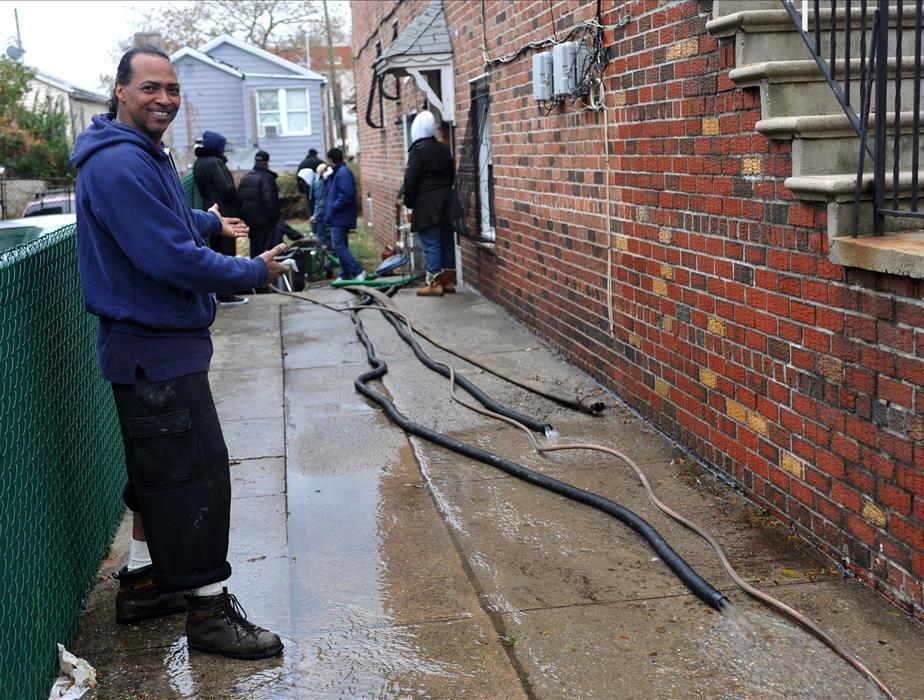 Hire our professional team to drain the basement flood in your Greenville, NC home.
Hire our professional team to drain the basement flood in your Greenville, NC home.
When you have a basement flood, the first thing you need to do is contain the source of the water. Once you don't have any new water coming into your basement, your focus can shift to removing the existing water. Depending on how much water you are dealing with, this process may be relatively simple or a major undertaking.
Draining Your Basement
You can not begin draining your flooded basement until the floodwater around your home has receded. To avoid the risk of electrocution or damage to your home's electrical system, shut off the power to your home.
Obtain the Necessary Equipment
SERVRPRO offers a 24-hour emergency water removal service. You can contact one of our water remediation franchises near Greenville, NC, any time of the day or night. If you plan to drain the basement yourself, you will need to rent or purchase several pieces of equipment:
- Submersible pump
- Garden or sump hose
- Heavy-duty extension cord
- Generator
- Nylon rope
If you have insurance coverage for flood damage, your policy may reimburse you for the cost of these items.
Set Up the Equipment
First, attach the extension cord to the pump cord. Ensure that your electrical cords will not come into contact with the water by looping the cords around a ceiling joist or a heavy object that will keep the cords away from the water. Attach a garden or sump hose to the fitting on the top of the pump. A sump hose will remove water faster than a garden hose because it has a larger diameter, but either will work. Tie a nylon rope to the top of the pump. Place the hose with the open end in an area away from your house and in a spot where the water will drain into a storm sewer or gutter.
Pump Out the Water
The next step to resolve your basement flood is to pump out the water. Use the rope to lower the pump into the basement. When the pump is in place, turn on the generator and plug the extension cord into it. This should start the pump. When the water level gets lower, you may need to reposition the pump at the lowest level of the basement to remove the rest of the water.
Remove and Replace Wet Items
Porous items, such as drywall, paneling, and carpet, that was in contact with the floodwater should be removed and replaced to avoid mold growth. All surfaces need to be dried completely. You can run fans and dehumidifiers to speed up the process. Alternatively, you can utilize a SERVPRO professional to quickly and completely dry out your basement. Mold may begin to grow after 24 to 48 hours. SERVPRO's Faster To Any Size Disaster service can reduce your chances of mold problems. We may also be able to restore the valuable property, such as documents or family photographs, that can be difficult to save without professional restoration.
Because dealing with a basement flood requires specialized equipment that may be difficult to obtain during a widespread flooding event, many homeowners can benefit from using SERVPRO's water restoration services. SERVPRO can make it "Like it never even happened."
How To Repair a Leaking Faucet
9/24/2021 (Permalink)
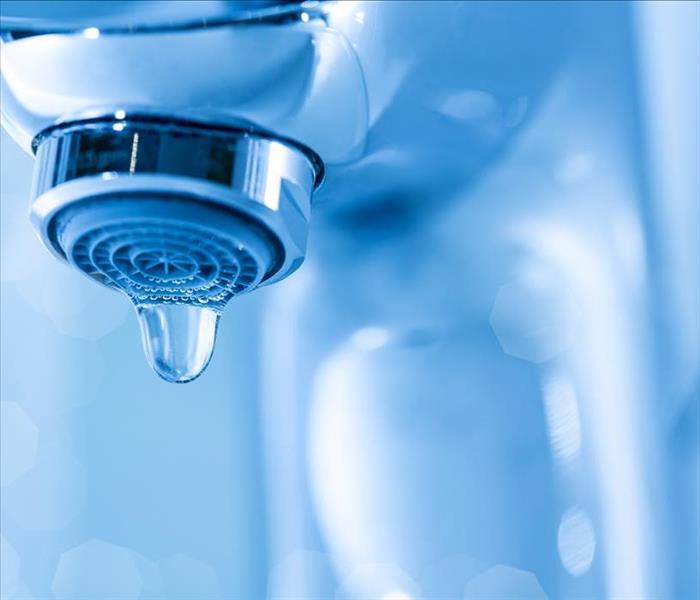 Repair a leaking faucet to avoid water damage in your Greenville, NC home.
Repair a leaking faucet to avoid water damage in your Greenville, NC home.
A leaking faucet is a much larger problem than the annoying drip you hear at night; the consistent loss of water can hit you in the wallet every month. The good news is that fixing that dripping faucet is a pretty straightforward task that you can complete before it's necessary to contact a Greenville, NC, water damage cleanup and repair company.
Four Common Leaking Faucet Repairs
No matter which type of faucets you have in your home, turn the water off before you begin this repair. Check under your sink for a turn-off lever or knob. Turn the knob clockwise and then check the faucet to be sure the water is off. It's also a good idea to close the sink plug, so you don't lose any small hardware in the drain.
1. Ball Faucet: Single Handle That Moves On an Internal Ball
This type of faucet is most common in kitchens and is a bit complicated because it has a lot of parts to remove and replace. Rather than buying the parts separately, check your hardware store for a faucet kit. Begin by removing the handle; it should unscrew fairly easily. Use a pair of pliers to remove the cap, collar, faucet cam, washer, and ball. You'll need a slender tool, such as a pair of needle-nose pliers, to remove the inlet seals and springs from inside the faucet. Before replacing the O-rings, coat them with a plumber's grease. Replace the springs, valve seats, and cam washers with parts from the kit as you reassemble the faucet.
2. Cartridge Faucet: One or Two Handles Next to the Faucet
Look for a screw on the handle or handles and remove it; then remove the handle(s). Use pliers to remove the threaded retaining clip, if it's present. Pull the cartridge up and out of the faucet. Remove the exposed spout and then look for the O-rings. Remember to coat the new rings with the plumber's grease before installing the replacements.
3. Compression Faucet: Two Handles on Either Side of the Faucet
This is the oldest type of faucet. Start by removing the handles on either side of the faucet. Plastic caps may cover screws that need to be loosened. Next, remove the nut, O-ring, and seat washer. Most of the time, this rubber washer is the source of the leak. Regular wear and tear can affect the washer until it is too damaged to be effective. Before installing the new washer, coat it with plumber's grease
If water is seeping from the handles, rather than a leaking faucet, the O-ring is probably the problem. When this is the case, you'll need to take the O-ring to the store, so you can pick the right replacement.
4. Disk Faucet: Single Lever over a Cylindrical Body
This modern faucet doesn't require repairs very often. Begin by unscrewing the handle to expose the escutcheon cap. Remove this, unscrew the disk cylinder, and remove the exposed seals. Clean the cylinders to remove all hard water buildup. Replace the seals with exact replacements and reattach the rest of the handle.
As soon as you notice a leaking faucet in your home, take steps to repair it. A successfully fixed leak can save you a lot of money in wasted water and potential water damage.
Does My Home Have a Mold Infestation?
9/21/2021 (Permalink)
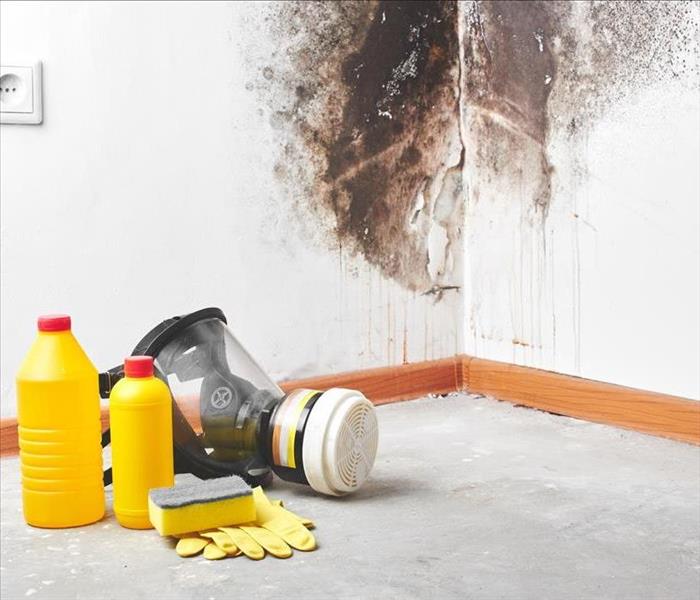 Mold spores spread fast in your Greenville, NC, home.
Mold spores spread fast in your Greenville, NC, home.
Mold is relatively common in residential spaces. Unfortunately, many times it goes unnoticed until it's out of control. It's good at hiding. There are signs of mold that will keep you more aware if you should have a problem. The sooner you can identify mold in your Greenville, NC, home, the better. Black mold is particularly damaging, possessing a mycotoxin. If you discover mold, it's essential to take action immediately, as it can spread out of control extremely quickly.
How Do I Find and Identify Mold in My Home?
1. Your Home Is Humid
Mold is not picky about where it lives. It thrives in conditions that are dark, humid, and reasonably warm. If your home has high humidity, there's a good chance you could have mold growth, particularly in areas with poor circulation. The indoor relative humidity should be no higher than 50%. You can purchase inexpensive humidity monitors at hardware stores. Keep adequate humidity levels in your home by placing dehumidifiers, running fans, and opening windows (if the humidity is lower outdoors than in). Mold is also prone to grow in bathrooms and kitchens due to the excess moisture created. Utilize the ventilation systems in the bathrooms and kitchen whenever you're taking a shower or cooking on the stove.
2. You See It on Walls or Ceilings
Mold is good at hiding, but it also often grows visibly on walls and ceilings. If you see it on walls or ceilings, it could also be growing within and behind them, even under wallpaper. When you see mold growth, you must call mold remediation experts immediately to begin the inspection and restoration process as soon as possible. They have the professional equipment and expertise to find all of the molds and eliminate it safely.
3. You Find It in Inconspicuous Locations
Look in out-of-the-way areas of your home, such as inside bathroom cabinets and behind appliances and furniture. Spaces that are poorly ventilated and go untouched for some time, such as basements and attics, are even more susceptible to mold growing on and behind things. Both places are also more likely to have water damage that goes unnoticed.
4. You Smell a Persistent, Pungent Odor
If you smell a musty odor in your home, there's probably mold growing nearby. This odor is created by mycotoxin, which the mold produces.
5. You Detect Water Damage
If your home has water damage, such as from a leaky pipe or roof, there will almost certainly be mold growth if it goes untreated for more than 48 hours. This is why it's essential to clean, dry, and repair water damage and its source immediately.
6. You Discover a Bug Infestation
Many people don't realize that mold can attract certain bugs, such as booklice. Despite their name, they aren't restricted to books; they thrive in moldy conditions because they eat mold. The only way to get rid of this bug infestation is to eradicate all of the molds.
From the mycotoxin it produces to the structural damage it can cause, mold can create various severe issues if left untreated for even a short time. It's critical to know the signs of mold, where it lurks, and how to identify it.
Faster to your Greenville Water Damage
9/20/2021 (Permalink)
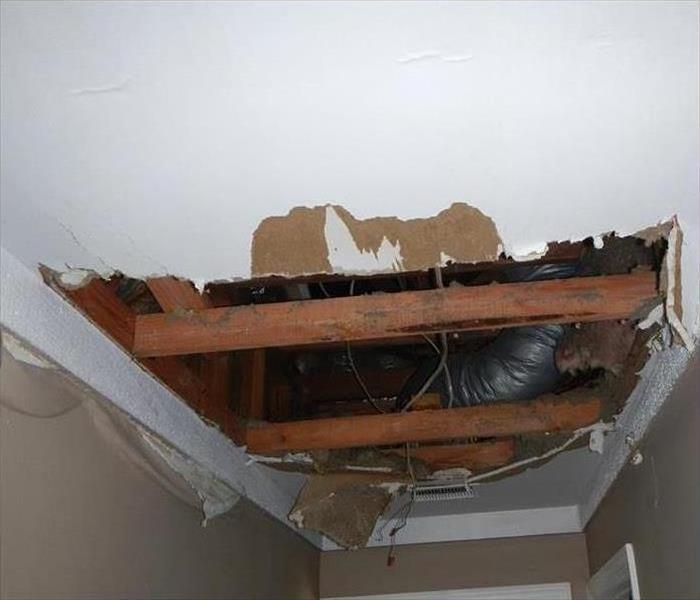 SERVPRO provides 24 Hour fire and water damage restoration service in Greenville, NC.
SERVPRO provides 24 Hour fire and water damage restoration service in Greenville, NC.
Flooding and water emergencies don’t wait for regular business hours and neither do we. SERVPRO of Greenville, NC provides emergency cleaning and restoration services 24 hours a day, 7 days a week—including all holidays.
Faster To Any Size Disaster
Flooding and water damage are very invasive. Water quickly spreads throughout your home and gets absorbed into floors, walls, furniture, and more. SERVPRO arrives quickly and starts the water extraction process almost immediately. This immediate response helps to minimize the damage and the cleaning and restoration costs.
Water Damage Timeline
Within Minutes
- Water quickly spreads throughout your property, saturating everything in its path.
- Water is absorbed into walls, floors, upholstery, and belongings.
- Furniture finishes may bleed, causing permanent staining on carpets.
- Photographs, books, and other paper goods start to swell and warp.
Hours 1 - 24:
- Drywall begins to swell and break down.
- Metal surfaces begin to tarnish.
- Furniture begins to swell and crack.
- Dyes and inks from cloth and paper goods spread and stain.
- A musty odor appears.
48 Hours to 1 Week:
- Mold and mildew may grow and spread.
- Doors, windows, and studs swell and warp.
- Metal begins to rust and corrode.
- Furniture warps and shows signs of mold.
- Paint begins to blister.
- Wood flooring swells and warps.
- Serious biohazard contamination is possible.
More Than 1 Week:
- Restoration time and cost increase dramatically; replacing contaminated materials and structural rebuilding may be extensive.
- Structural safety, mold growth, and biohazard contaminants pose serious risks to occupants.
About SERVPRO of Greenville, NC
SERVPRO specializes in the cleanup and restoration of residential and commercial property after a fire, smoke, or water damage event. Our staff is highly trained in property damage restoration. From initial and ongoing training at SERVPRO’s corporate training facility to regular IICRC-industry certification, rest assured our staff is equipped with the knowledge to restore your property.
Greenville Smoke and Soot Cleanup
9/13/2021 (Permalink)
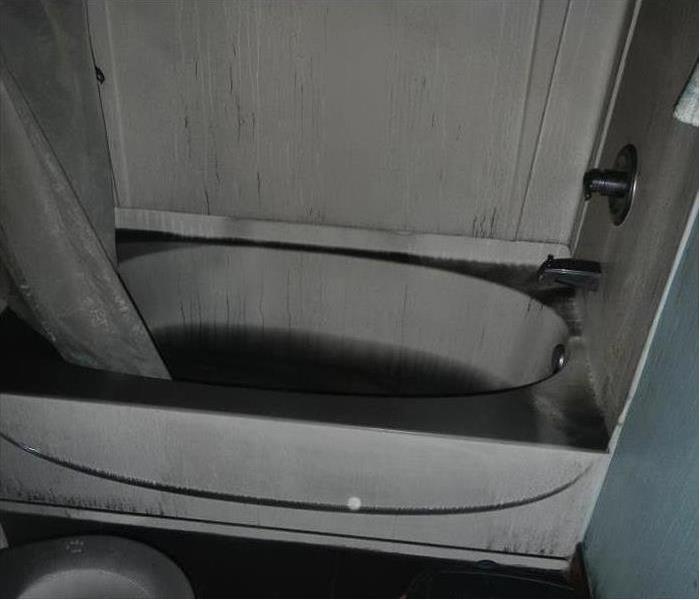 Smoke and Soot Damage Can Cause a Pervasive Odor in Your Greenville Home
Smoke and Soot Damage Can Cause a Pervasive Odor in Your Greenville Home
Smoke and soot are very invasive and can penetrate various cavities within your home, causing hidden damage and odor. Our expertise in smoke damage remediation allows us to inspect and accurately assess the extent of the damage to develop a comprehensive plan of action.
Smoke and soot facts:
- Hot smoke migrates to cooler areas and upper levels of a structure.
- Smoke flows around plumbing systems, seeping through the holes used by pipes to go from floor to floor.
- The type of smoke may greatly affect the restoration process.
Different Types of Smoke
There are two different types of smoke–wet and dry. As a result, there are different types of soot residue after a fire. Before restoration begins, SERVPRO of Greenville, NC, will test the soot to determine which type of smoke damage occurred. The cleaning procedures will then be based on the information identified during pretesting. Here is some additional information:
Wet Smoke – Plastic and Rubber
- Low heat, smoldering, pungent odor, sticky, smeary. Smoke webs are more difficult to clean.
Dry Smoke – Paper and Wood
- Fast burning, high temperatures, heat rises therefore smoke rises.
Protein Fire Residue – Produced by evaporation of material rather than from a fire
- Virtually invisible, discolors paints and varnishes, extreme pungent odor.
Our Fire Damage Restoration Services
Since each smoke and fire damage situation is a little different, each one requires a unique solution tailored for the specific conditions. We have the equipment, expertise, and experience to restore your fire and smoke damage. We will also treat your family with empathy and respect and your property with care.
Moisture in your Greenville, NC home or business
9/13/2021 (Permalink)
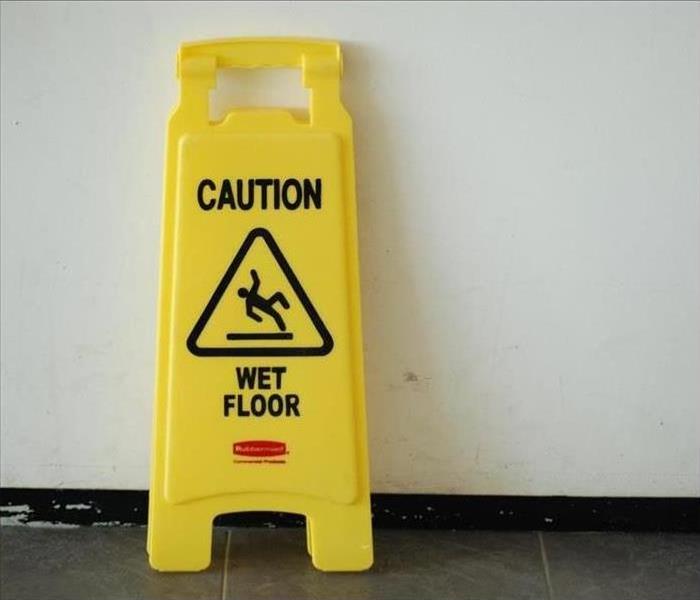 Excess moisture can be dangerous to your home and health.
Excess moisture can be dangerous to your home and health.
Moisture in older homes
Older structures in Greenville, NC homes, are more susceptible to moisture after heavy rain, meaning water can sometimes seep in or leak where it shouldn’t be. In small doses over wide intervals, it may not do any noticeable damage, but if the issue occurs more frequently and is left untreated your home or business may receive permanent water damage. Enlisting experts like your locally owned and operated SERVPRO can help to eliminate this problem and save you considerable time and money in the long run.
Getting you dry
Our professionals can help you immediately by using specialized equipment to extract water and dry the affected area. Our equipment can get underneath the surface of carpets and into the padding, eliminating moisture all the way through. We can also help you in the long run by cleaning the structure and contents with our safe, effective sanitizing treatments. These preventative measures keep unwanted growth away and prevent materials from swelling or corroding.
Verification
To further give peace of mind, we check under your crawlspace (if applicable) to make sure no further damage has occurred. We also check your subflooring and inspect the layers of your carpeting and padding to verify our extraction methods have fully dried out the affected area. Lastly, we will test the humidity to ensure it is in an acceptable range, indicating that moisture levels are low enough to prevent secondary damages. Once completed, we can walk through with you and explain what we did, how we did it and of course answer any other questions you may have.
Keep Your Furnace Happy With Simple Maintenance
8/23/2021 (Permalink)
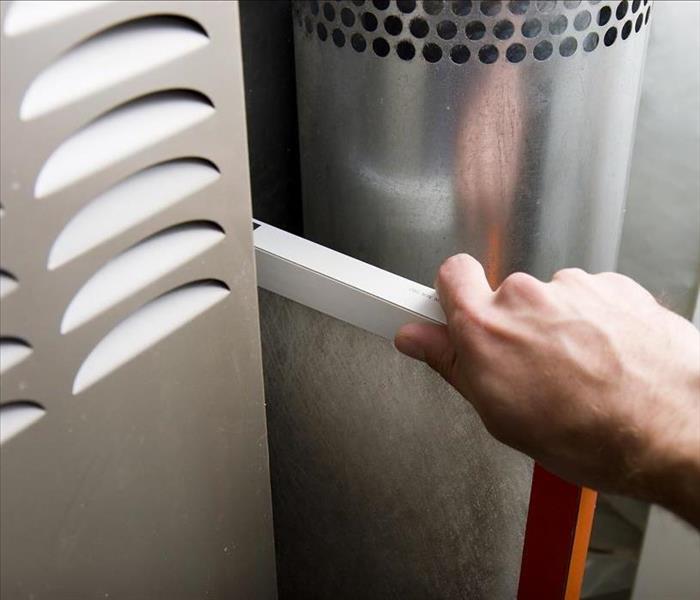 Simple maintenance on the heating system will prevent future problems in your Pitt County, NC, home.
Simple maintenance on the heating system will prevent future problems in your Pitt County, NC, home.
The heating system in your Pitt County, NC, home probably doesn't require a lot of attention to keep you and your family comfortable when the temperatures are low. However, regular furnace maintenance has several benefits:
- Prevents breakdowns
- Increased efficiency
- Lasts longer
- Saves money on utilities
- Improves cleanliness of the air
Many heating and cooling system problems can be traced back to dust or dirt buildup inside the unit. Proper maintenance ensures that your furnace runs efficiently for many years. It also helps you reduce the risk of furnace-related fires and the resulting costs of rebuilding and fire cleaning.
Get Rid of Dust and Dirt
There are many types of furnaces and some of the specifics of upkeep may vary, but there are several maintenance steps that are the same from one model to another. The first step is protecting your furnace from dirt. Prepare for winter weather by replacing or cleaning the filter, the blower, and the motor. When your furnace is in use, you should clean and inspect the filter once a month. If you find that the filter is clogged, replace it immediately. Use a vacuum or a soft duster to remove dirt, dust, and debris from the blower and the motor.
Keep the Vents Clean and Clear
Your running furnace blows warmed air through the vent system of your home. If any vents are blocked by dirt or furniture, the furnace must work harder to keep your rooms warm. Keeping the vents clear is an important part of routine maintenance and a good way to prevent the need for fire cleaning. If you have a gas furnace, it's critically important to keep the exhaust flue clean, clear, and unobstructed.
Pay Attention to Your Ductwork
Cleanup of the vents often begins at the registers, but it shouldn't end there. Make sure that all registers are free of paper, toys, hair, and dust. Once you've done this, remove the register and use your vacuum to clear debris out of the ductwork. If you've done any reconstruction or if your home has been affected by fire damage, for example, it's a good idea to contact professionals with experience in fire and smoke cleaning.
Improve Your Home's Envelope
Reduce the load on your furnace by improving your home's envelope. You can do this by locating areas of your home that allow heat to escape, and seal these leaks or add insulation. When you prevent heat loss, the furnace doesn't have to work as hard to keep your home at a comfortable temperature. If you aren't sure how to find areas where heat leaks out, contact a heating professional with cameras and other equipment.
Keep Routine Maintenance on Your Schedule
It isn't difficult to keep your furnace and heating system running efficiently, and it shouldn't take you much time. The best time to complete routine maintenance is before cold weather settles in, and you'll have the best results if you continue through the months of cold weather. Remember that the effort you put into keeping your furnace clean is also an important way to avoid serious fire damage and professional fire cleaning services.
5 Storm Preparation Tips
8/23/2021 (Permalink)
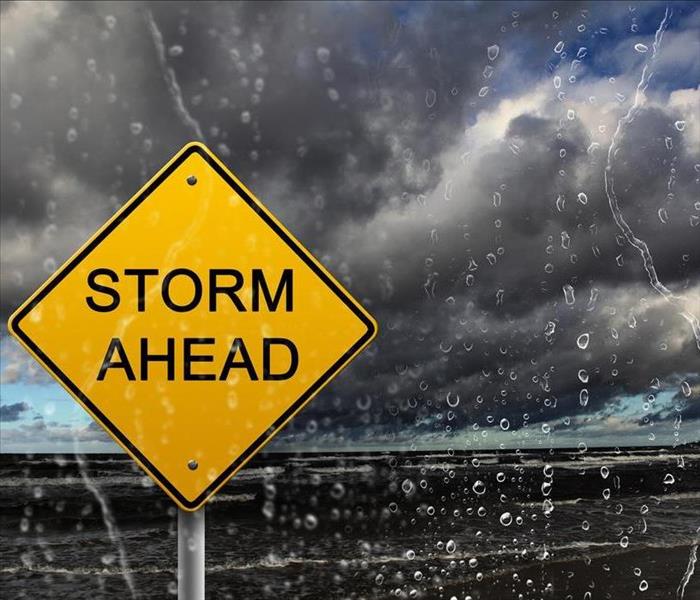 Be prepared for storms to reduce the damage in your Greenville, NC, home.
Be prepared for storms to reduce the damage in your Greenville, NC, home.
Flooding is the most common natural disaster in the United States. Flood water can damage property and be a safety hazard for people. Preparing your home and family before a storm happens is essential for avoiding injuries and reducing property damage.
1. Know Your Risk Level
A flooded building can happen anywhere but is more likely to occur in low-lying areas near sources of water, such as rivers and streams. You can find out what the level of risk in Greenville, NC, is by checking FEMA's flood maps. If you live in a high-risk area, you should be particularly vigilant when it comes to taking flood precautions.
2. Get Flood Insurance
Homeowner's insurance typically covers water damage from sudden and accidental discharges of water, such as a broken pipe or supply line. However, coverage for flooding from outside sources is usually excluded. You can purchase separate flood insurance through the National Flood Insurance Program. Even if your home is in a low-risk area, it may be worthwhile to purchase flood insurance, because flash flooding can lead to extensive water damage that requires restoration services. It usually takes 30 days for a flood policy to go into effect, so don't wait until bad weather is in the forecast to purchase your policy.
3. Create a Flood Plan
Your family needs to know what to do if flood water is imminent. Plan out and practice evacuation routes. Figure out where you can go to seek shelter when a flood occurs. If you have pets, find out if local shelters will accept them. Collect a supply of non-perishable food, cleaning supplies, and drinking water for several days to use in case you must leave your home or your electricity and water service goes out. If anyone in your household has special needs, such as mobility issues, account for them in your plan.
4. Protect Your Property
Place important documents in a waterproof container or store them off-site in a safety deposit box. Move valuable property to the upper floors of your home. Keep your drains and gutters free of debris. Install a sump pump with a battery backup and check valves. Use sandbags or other flood barriers to protect your home from rising waters. However, do not ignore evacuation orders in an attempt to protect your property.
5. Secure Exterior Property
Wind and rising waters can turn your exterior property into projectiles. Trim trees and shrubs that are near your home. Move outside furniture, toys, bikes, and plants inside. Secure outside objects, such as sculptures, that can not be moved with blankets or burlap tied with rope. Close your storm shutters or nail pieces of plywood over window frames, skylights, and doors. Move your vehicles to higher ground or park them inside your garage against the garage doors.
Depending on the cause, you may have days or only minutes to prepare for floodwater when a storm occurs. Having a plan in place can prevent you from having to scramble at the last minute to protect your property and loved ones from harm.
8 Water Conservation Tips for Your Business
8/16/2021 (Permalink)
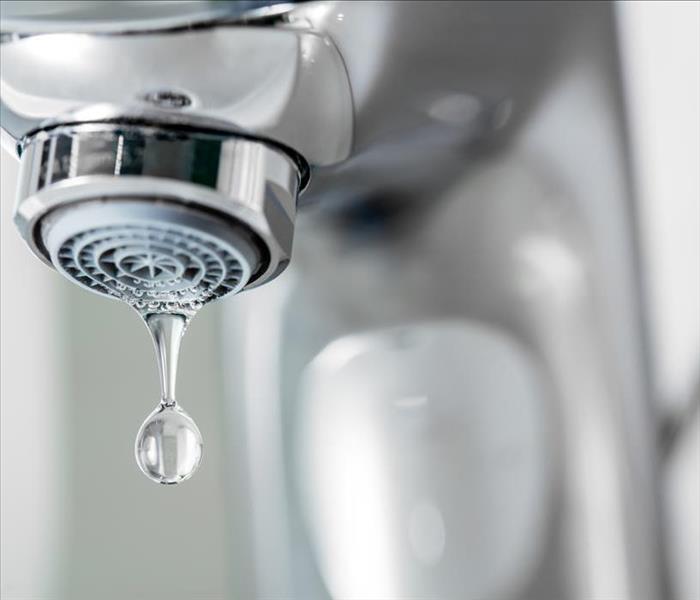 Water is a resource fundamental for our lives. Repair the leaks to conserve the life and your building's septic system in Pitt County, NC.
Water is a resource fundamental for our lives. Repair the leaks to conserve the life and your building's septic system in Pitt County, NC.
Water is an essential resource that's becoming more finite as time passes. Now is the time to begin conserving water if you haven't already started. Conserving water has many benefits, including protecting the environment from various water issues such as pollution. It can also save your business money on your Pitt County, NC, utility bill and by extending the life of your building's septic system.
1. Repair Leaks
Investigate drippy faucets and leaky pipes. These can potentially waste up to thousands of gallons of water each year. Monitor faucets, pipes, toilets, appliances, and other fixtures for leaks and drips and repair them immediately.
2. Educate Employees
When you're trying to conserve water for the environment and your business's water bill, everyone needs to be on board. Make sure to train your employees on water conservation techniques and procedures. In addition, everyone should stay up to date on the latest water-efficient technology to keep at maximum usage efficiency.
3. Keep Extra Drinking Water in the Refrigerator
Instead of leaving the tap water running until it cools off, have a couple of extra reusable water bottles to put tap water in to keep in the refrigerator. It'll be cold and refreshing when you're ready to drink it, and it'll conserve water in the process.
4. Reuse and Recycle the Water
There are several options for reusing and recycling water. These options include purifying processes and harvesting rainwater. Harvesting rainwater requires various research with environmental agencies. You can also reuse gray water if you have the proper recycling methods at your building. Reusing gray water can make a significant difference in your water usage and utility bill.
5. Install Water-Efficient Equipment
Purchasing water-efficient equipment for your building can be an excellent investment. If you already have a water filtration system, make sure you keep all parts and equipment current and working correctly. This will keep your system working efficiently, conserving water and saving money.
6. Upgrade to Smart Metering Technology
These days, there are smart technology options for automated and advanced meter reading. This technology can measure and monitor your building's water usage as it links multiple operating systems in the building management system. This water upgrade can also keep you aware of any water issues that might occur.
7. Don't Use Toilets as Trash Cans
Toilets are only designed to flush human waste and toilet paper. When you use it to flush other trash, such as paper towels or cigarette butts, it can risk stopping up the line and causing an overflow, requiring a visit from a plumber and water damage restoration professionals. Additionally, every time you flush, you use at least two gallons of water, depending on the model of the toilet. Make your employees and customers aware of this, also.
8. Insulate Water Pipes
Insulating your water pipes is easy and helps conserve water. In those colder months, water will heat up much quicker, so you don't have to waste water waiting for it to get hot. Purchase some foam pipe insulation; you can even purchase it pre-slit and ready to slip on the pipes with ease.
Implementing a water conservation plan into your business has several benefits for the environment and your bottom line. As the world faces shortages and other water issues, it's rewarding to do your part to help save water.
What Steps Do I Take After a Burst Pipe?
7/30/2021 (Permalink)
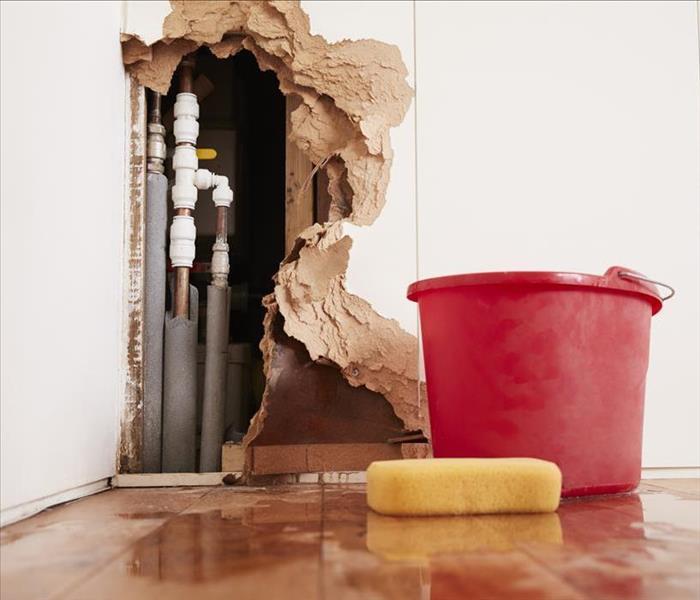 Water damage due to a pipe burst.
Water damage due to a pipe burst.
There are various issues that can cause water damage in your Greenville, NC, home, but bursting pipes could be one of the worst. A broken pipe can cause anything from a small leak to a full-on flood. Either way, if you don't discover them immediately, both scenarios can result in severe damage to your property. So, what steps should you take if your home sustains a pipe burst?
6 Steps to Deal With a Pipe Burst
1. Investigate for the Origin and All Damage
First, it's essential to do a thorough investigation to find the origin of the leak and all the resulting damage. The damage must be mitigated as soon as possible; every minute counts.
2. Stop the Water Flow
When you find the origin, try to stop the water flow immediately. You may need to turn off the water supply at the home's main valve.
3. Call Professionals
Next, you're going to have to call a plumber to replace or fix broken pipe If there is a lot of water from the bursting pipes or the moisture has been lingering for a while, contacting a water damage restoration company is beneficial, if not vital. The experts can do a thorough professional inspection and mitigate the loss.
4. Extract the Water
While you're waiting for the professionals to arrive, you can begin extracting the water. A wet/dry vacuum is ideal for eliminating the standing water and debris. You can also use a mop and towels.
5. Remove Unsalvageable Materials
You can also start removing soaked and unsalvageable materials. The more moisture you eliminate from the area, the faster it will dry.
6. Dry Everything
Finally, you must dry the area and contents as quickly as possible. The experts will utilize industrial-grade drying equipment such as fans and dehumidifiers.
The key to managing bursting pipes is to limit the water damage. Now you know the basic steps for resolving the issue.
Steps of the Storm Damage Mitigation Process
7/29/2021 (Permalink)
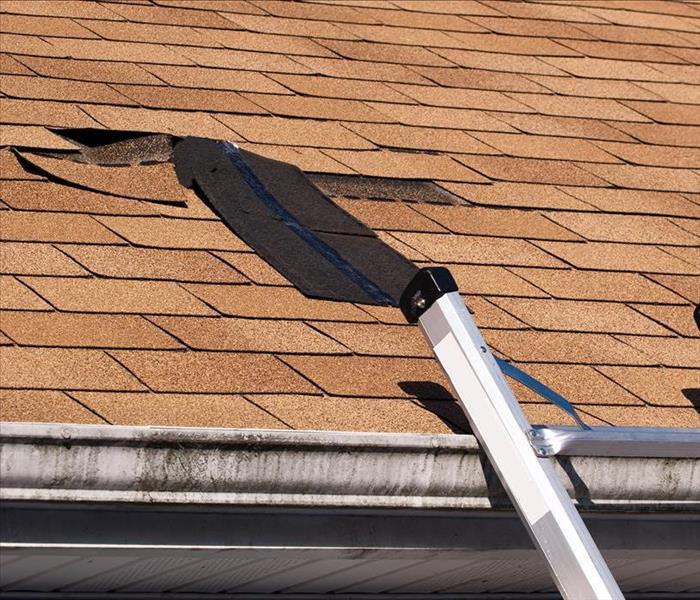 After a storm your home's roof may need repairs to avoid water damage.
After a storm your home's roof may need repairs to avoid water damage.
High winds and hail can cause broken or missing shingles on your roof. To protect your home, you must remedy this problem as soon as you can. Before you look for roof repair in Greenville, NC, however, you need to have the water damage inside your attic or top floor fixed.
4 Steps for Storm Damage Mitigation
1. Board Up Damaged Roof
Roof damage leaves your home vulnerable to a variety of problems:
To prevent these issues, you must block the entry into your home that the storm left behind. Use tarps or boards to cover holes in the roof so that no further rain or wind damage is done to the interior of your home during the mitigation process.
2. Remove Saturated Materials
Before roof repair can commence, all materials damaged by the leak must be torn out. This may include ceilings, walls, insulation and flooring. Water damage restoration specialists assess the area and determine which materials cannot be salvaged. Then, they remove it.
3. Clean and Dry Affected Area
Water from a storm is likely contaminated with various bacteria, so any part of your home it touches must be disinfected. After the whole area has been clean and tested, the technicians make sure that it is also dry so that no secondary damage occurs later.
4. Restore Structure
Once everything is clean and dry, the restoration team can start the rebuilding process. They replace insulation, put up drywall and install new flooring. Then they match the new materials with the existing structure so that it is not obvious where the damage occurred.
If your roof is damaged in a storm, your first instinct is probably to call a trusted roofer. Before you arrange for roof repair, however, make sure that the process won't hide interior damage that needs to be addressed first. Fixing the whole problem is the key to getting your home and your life back to normal.
How To Get Rid of Mold in Your Home
6/28/2021 (Permalink)
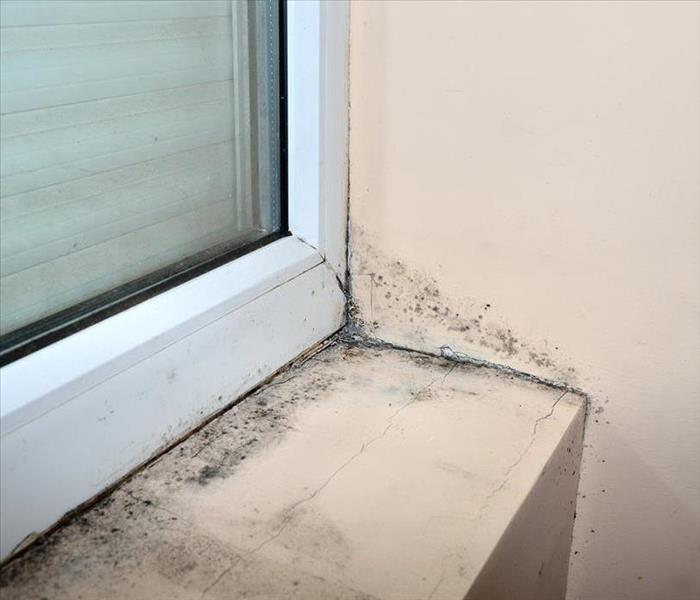 Mold damage in Greenville, NC.
Mold damage in Greenville, NC.
If your home in Greenville, NC, has water damage, that may not be the only thing you have to worry about. Oily patches on your wall or a musty smell can be a sign of a black mold problem. Even if you can't see the fungus growth, that doesn't mean it's not there. To get rid of it, you need certified professionals who can locate and mitigate the damage.
Get Rid of Mold in Your Home
Finding the Mold
It's not possible to get rid of every mold spore in your home. Every time you open a door or window, mold can get inside. This is only a problem, however, if there is excess moisture in places where it can grow undisturbed:
- On drywall
- Under sinks
- In tile grout
- Beneath appliances
Mold remediation experts not only find where the mold is hiding but also test to see what type of mold it is and how concentrated a growth they have to deal with. Once they have this information, they can start the mold cleanup process.
Mold Remediation
Getting rid of black mold growth takes more than just a brush, detergent and some elbow grease. If the material on which it grows is porous, there is a strong chance that the filaments have actually embedded themselves below the surface. After a thorough assessment, the technicians that handle the mitigation know which equipment and technique is most effective for your specific problem. If material is too damaged by the mold, it must be torn out and replaced. Once the cleanup process is complete, a final professional mold test can give you peace of mind that the issue is resolved.
If you suspect there is black mold in your home, you need to call for professional mitigation. Certified technicians can ensure that the problem is thoroughly diagnosed and dealt with so that the mold growth does not return at a later date.
How Restoration Services Help With Disaster Recovery
6/28/2021 (Permalink)
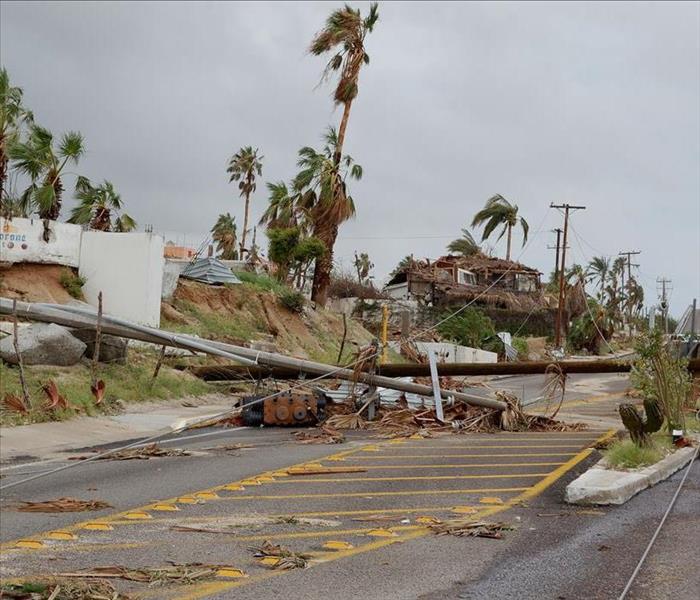 A large storm may cause severe damage.
A large storm may cause severe damage.
Whenever there is a large storm, it takes coordination of efforts from a variety of professionals, including insurance adjusters, restoration companies, building contractors and others to help homeowners recover. Restoration service companies play a valuable role in disaster recovery.
3 Ways Restoration Services Help With Disaster Recovery
1. Temporary Repairs
Because large storms can cause storm damage to many homes and businesses in the Greenville, NC, area at the same time, it may take days or even weeks for contractors to make permanent repairs to damaged homes. Restoration companies offer services, such as tarping, that can help prevent additional damage from occurring while the homeowner waits for permanent repairs. In most cases, insurance policies will cover the cost of temporary repairs that are necessary to prevent additional damage from occurring to the home or its contents.
2. Mold Growth Prevention
One of the most common problems that result from homes affected by large storms is mold growth. The reason for this is that these storms can leave many homes with standing water from floods or rain that enters the home through damaged roofs and windows. Restoration companies can help prevent mold problems by quickly drying out affected properties and cleaning and sanitizing surfaces as part of the disaster recovery effort.
3. Insurance Claims
Restoration companies work closely with insurance companies every day. Systems are already in place to help homeowners get their claims processed quickly. Additionally, many companies have a network of franchise locations that can be mobilized to provide additional storm response for areas affected by a major storm. Utilizing a restoration company can reduce the burden on homeowners and claims adjusters by speeding up the process of getting claims approved and beginning the restoration of their homes.
Hundreds or even thousands of people may be involved in disaster recovery efforts after a major storm event. Restoration companies play a critical role in preventing unnecessary damage and helping homeowners get on the road to restoring their homes to preloss condition.
The Importance for a Water Mitigation Plan
6/22/2021 (Permalink)
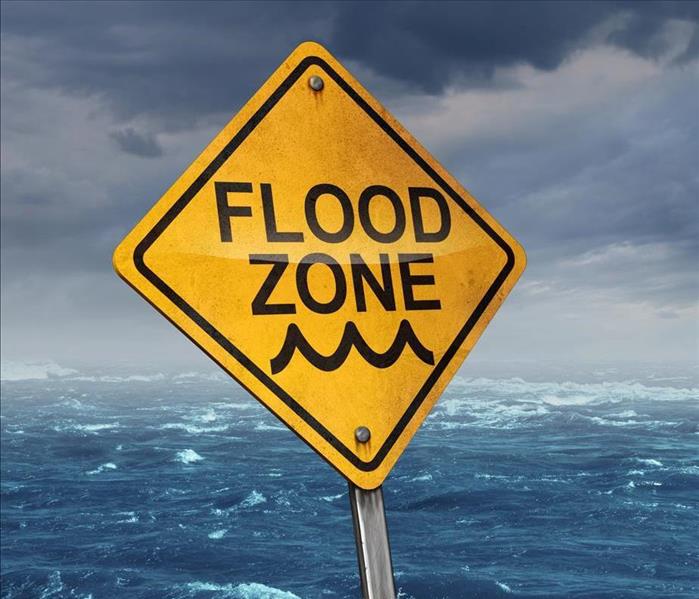 Preparation is key to avoid severe damage during a storm.
Preparation is key to avoid severe damage during a storm.
Business owners have a lot to worry about beyond weather and disaster concerns, meaning it is often easy to neglect preparation in favor of operations. However, when something, like a flood, occurs without a plan in place, it is easy to panic, resulting in more loss than necessary. One of your primary concerns after a flood should be content cleaning.
Content defines all items within your facility, inventory, equipment, office supplies, etc. While some people might focus on a DIY solution, it is best to contact a water mitigation specialist in Greenville, NC, to handle the crisis. They have a three-pronged approach to resolving the disaster.
1. Water Removal
A flood, regardless of the source, might leave behind a tremendous amount of water and damage. The mitigation service you contact will typically want to remove the water as quickly as possible to eliminate any risk of other problematic developments, like mold. The company will use a combination of tools, like shop vacs, pump trucks, and submersible pumps to remove the floodwaters.
2. Dry the Facility
Before the company can get to the content cleaning process, the technicians will need to dry the area thoroughly. Using a combination of fans, air movers, dehumidifiers, and any other necessary tools, the team will get to work drying the building. In some instances, they might need to remove drywall and other building materials — this is often only necessary for severe flooding or when the water has been standing for some time.
3. Clean and Renovate the Facility
Once the grey and black water are safely out of the complex, the mitigation service should begin cleaning and reconstructing your facility. When they are finished, your property will look as it did before the disaster.
It is crucial to have an emergency plan in place for any disaster. Content cleaning should be a priority, but it varies from crisis to crisis. Primarily, you should have a mitigation service and plan on file to prevent avoidable loss.
Water Cleanup Process for Wood Flooring
5/28/2021 (Permalink)
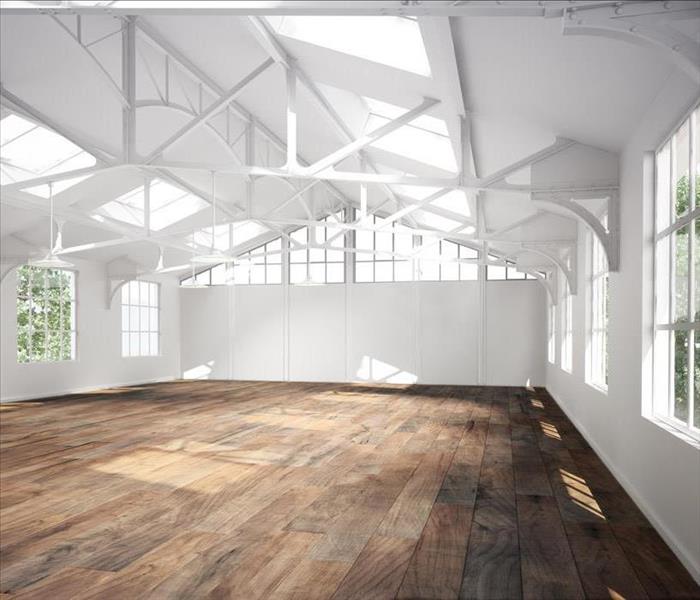 Wood flooring may suffer water damage.
Wood flooring may suffer water damage.
Wood flooring is an easy way to enrich the look of your office space in Greenville, NC. If you take proper care of it, it should last a long time. In an office full of people, however, accidents are bound to occur. Whether the problem is a simple spill or a pipe burst in the wall, fast cleanup is the key to minimizing damage.
3 Steps for Water Cleanup on a Wood Flooring
1. Stop Water Flow
The first thing you want to do when you have a leak or spill is to get water off the wood floor. There are several ways to stop water from seeping into it:
- Turn off water main
- Pump standing water out of the area
- Use newspaper to absorb moisture
- Increase air flow in the space
The method you use first depends on how much water you're dealing with. The faster you can get the space dry, the more likely you are to prevent costly damage.
2. Hire Professionals
Even if the floor looks dry after a pipe burst, it's a good idea to get a professional opinion. Water restoration experts can identify the signs of warping or swelling in the floor and recommend the proper steps to take to fix it. Don't assume there isn't any damage just because you can't see it. This can lead to more problems down the road that will be more expensive to resolve.
3. Get a Final Inspection
After the restoration work is complete, technicians should test the area again for excess moisture. If a wet floor traps water beneath it, you may end up with additional breakdown of the wood fibers or even mold growth. Give yourself the reassurance of a guarantee that the damage is truly gone.
A pipe burst in your commercial building can cause a lot of damage to your wood floors. Preserve their beauty by getting it cleaned quickly by certified professionals who guarantee their work.
Top Things You Should Throw Away After a Fire
5/28/2021 (Permalink)
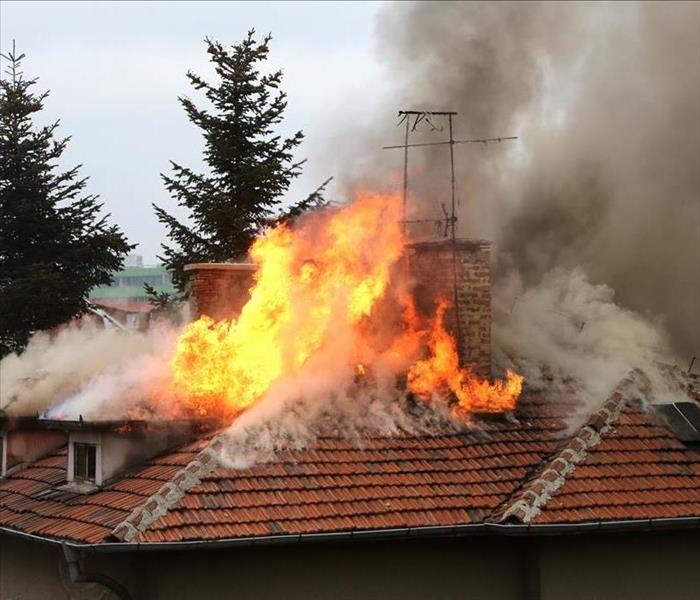 A home fire can be devastating.
A home fire can be devastating.
After a fire, you might want to keep as much of your old life as you can. Although many things can be cleaned, there are a few that you absolutely have to throw away after a fire. Some things are too damaged by heat, while others may spoil or be contaminated from chemicals released during the fire. You need to carefully consider what you should keep and what should be tossed out.
4 Top Things to Throw Away After Suffering Fire Damage
Anything Exposed To Chemicals
When certain materials burn, they release chemicals. This includes items like:
- Plastics
- Nonorganic fibers
- Wiring
You should toss out anything that is in or near plastic that has been exposed to high heat. This means you should get rid of most nonperishable foods, things in plastic containers, and anything containing dangerous chemicals.
Clothing, Rugs and Furniture
If you have a professional fire cleanup company in Greenville, NC, they might be able to save some of these articles. Although many can be cleaned, the smoke smell and fumes do not come out of everything.
Perishable Foods
Although perishable foods may seem like something you can keep, they are something you definitely should throw away. This includes anything that you plan on putting into your body. Not only can these foods be contaminated, but the heat might also make them spoil as well. This is especially true if your refrigerator suffers fire damage.
Medicine, Makeup and Toiletries
Medicine, makeup and toiletries are other things in your home that will spoil when exposed to heat. Medicine may become ineffective at best and become toxic at worst. When dealing with fire damage, it is better to be safe than sorry. Even things like shampoo and conditioner turn bad when they've been heated.
After a fire, it can be difficult to determine exactly what is damaged and what is not. It is always better to play it safe and throw away items that may be a problem.
5 Tips for Driving After Heavy Rain
5/28/2021 (Permalink)
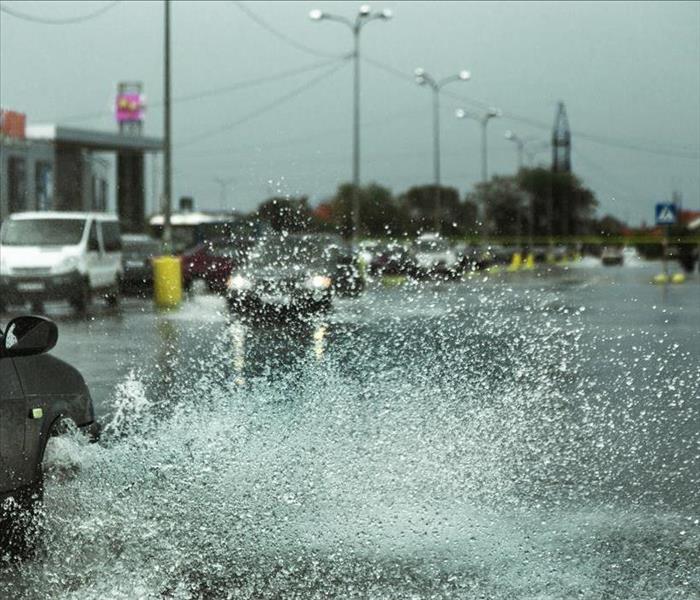 Driving through flooded streets can be dangerous.
Driving through flooded streets can be dangerous.
Heavy rainfall in Greenville, NC, can drop a tremendous amount of water on an area remarkably fast. This deluge can result in flooding. If you're out in it, it can be quite a shock, especially if you've never experienced that much rainfall. While you should never drive on a flooded street, sometimes you may be unable to avoid it; you might already be on the road. In this case, you must navigate it as safely as possible. It's helpful to remember some basic travel tips for traveling flooded roads.
5 Travel Tips After Heavy Rains
1. Avoid Standing Water
As little as half an inch of water can cause loss of control, even driving at a snail's pace; the vehicle can even begin floating. Whether a puddle or the entire roadway, if the water reaches the center of your wheels, it's vital that you avoid crossing it.
2. Advance Slowly
Anytime there's standing water on the road, drive slowly and carefully. Enter the road at one or two mph and drive a maximum of four mph. Otherwise, engine flooding is a risk. Whether you're in a manual or automatic, keep it in low gear the entire time you're driving.
3. Choose the Center of the Road
Water is typically most shallow in the center of a flooded street. Therefore, whenever possible, remain driving in the middle of the street.
4. Form a Single Lane of Cars
The safest way to navigate through standing water is to take turns with other vehicles. This way, everyone can avoid splashing water. Vehicles ahead of you can also help move water out of the way for you as they're advancing.
5. Dry Your Brakes After Exiting the Water
Drying your brakes once you're safely through the water will help you avoid spinning out. The best way to do this is to drive slowly, lightly pressing the brake as you're traveling.
Flood damage experts will advise against getting on a flooded street at all costs. It's not worth sacrificing your safety to reach your destination a little earlier.
What Are the Three Types of Flood Water?
4/30/2021 (Permalink)
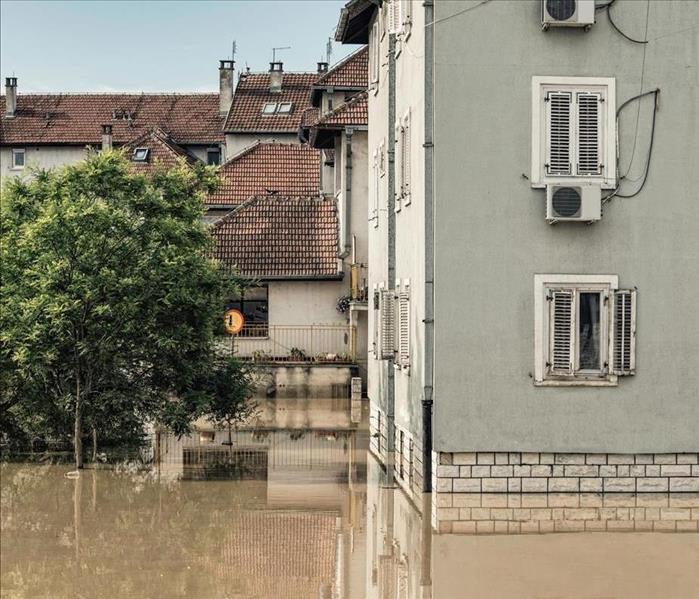 Flooding can cause severe water damage
Flooding can cause severe water damage
When floodwaters enter your Greenville, NC, home, whether from a broken supply line, toilet overflow or flooded river, one thing is for sure: the water will cause damage. The difference is the type of cleanup required based on the incoming water's classification and if it's severely contaminated water or not.
3 Types of Flood Water
There are three classes:
1. Category 1
White water (aka clean water) is safe to handle because it is from a reasonably sanitary source. It could be rainwater, a leak from a clean toilet, or a pipe burst. This water doesn't require protective gear or strict precautions to clean up. However, it needs to be removed and dried as quickly as possible; mold can begin growing within 24 hours.
2. Category 2
Gray water is somewhat contaminated water. You'll need to take some care when cleaning this water, as it contains biological or chemical contaminants that could be harmful but not likely toxic. Water from aquariums, showers or washing machines can contain matter such as bacteria, detergents, urine or blood. Hence, it's essential to wear protective gloves while cleaning and keep children and pets away from the affected area.
3. Category 3
Black water is particularly hazardous because there's a high probability that it contains many harmful biological and/or chemical contaminants. This type of water comes from conditions like raw sewage or natural disasters. You might be surprised to find out that freshwater and ocean water are also classified as category 3. This is due to the countless unknown contaminants. Category 3 water cleanup should only be handled by water damage restoration professionals to ensure proper safety precautions by experts.
Whatever the class of contaminated water in your home, the affected area must be cleaned and dried thoroughly to avoid further damage. The more prolonged dampness is left to linger in your home, the more loss it'll sustain. Taking the necessary cleaning precautions will ensure the well-being of your family, property and home.
Understanding Carpet Restoration
4/30/2021 (Permalink)
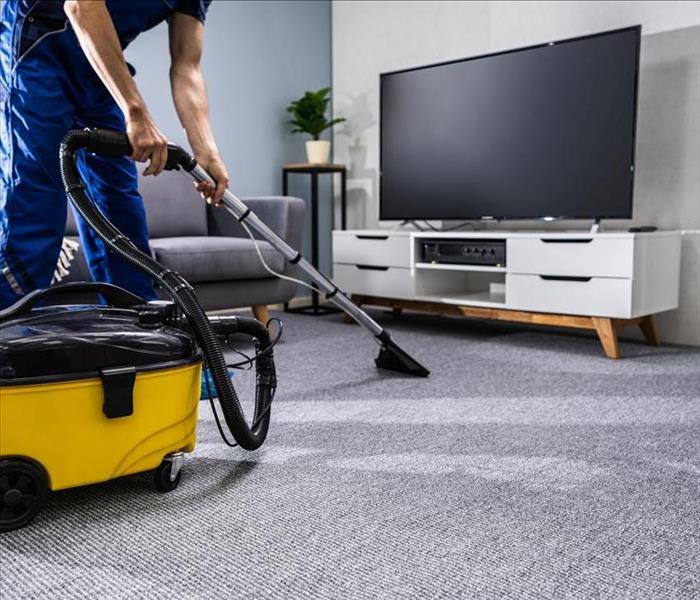 After suffering water damage carpet restoration maybe needed.
After suffering water damage carpet restoration maybe needed.
When a pipe break drenches the carpet in a home in Greenville, NC, it may show up on your client's insurance claim. The goal of the water damage restoration specialists at SERVPRO, however, is to save the items in damaged homes if possible. Answering frequently asked questions about the carpet restoration process can help you understand why many insurance providers choose SERVPRO as a preferred vendor.
The Carpet Restoration Process
Is Carpet Salvageable?
Not all flooring has to be thrown out after a flood. The main factor that affects whether carpet can be salvaged is the contamination level of the floodwater:
- Category 1 - Clean water from pipes or supply lines
- Category 2 - Dirty water from appliances or upper levels
- Category 3 - Contaminated water from the sewer or storm flooding
After a pipe break, the carpet in your client's home can likely be cleaned and saved, even if it is completely drenched. However, even a little contamination can mean the carpet has to be torn out and replaced to ensure that all the bacteria are removed from the home.
What Does Restoration Entail?
One of the benefits of working with SERVPRO is that the same local team handles the whole process from extraction to restoration. The first thing that has to happen is the removal of all excess water. Then the ruined materials such as drywall are torn out. If the carpet cannot be saved, it is removed as well. After the affected space has been dried and disinfected, all discarded materials are replaced. Walls are rebuilt, paint is matched to the remaining wall and new carpet is installed.
How Is the Client Informed?
The Claims Information Center is the place where all the information about each job is stored. Both you and your client have access to the damage assessment, recommended repairs and any updates that need to be made. As changes happen, the estimated cost is updated on the account.
A pipe break in your client's home is likely to flood the floor, but the carpet may be able to be saved. The CIC helps everyone involved stay informed about the costs of restoration.
Tips on Preparing Your Business To Weather a Storm
4/26/2021 (Permalink)
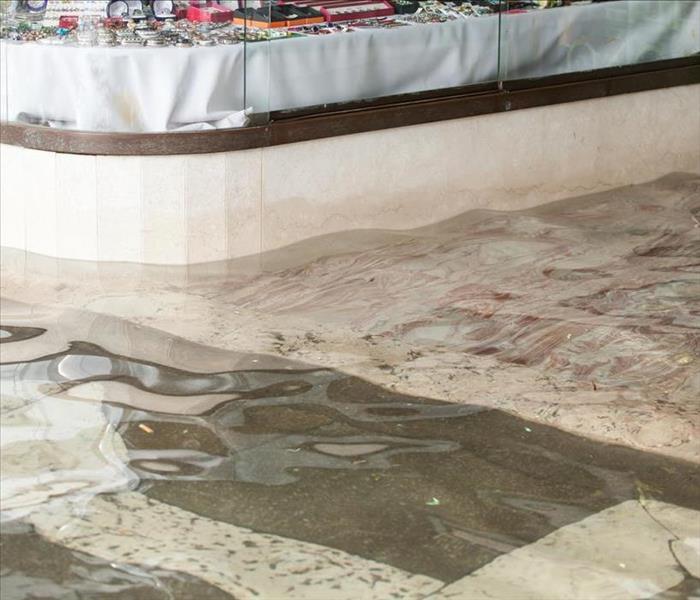 There are a few things you can do to prepare your business for a storm.
There are a few things you can do to prepare your business for a storm.
There are many areas of the country that routinely deal with flood water from high wind rainstorms. The trick to keeping your business safe is to make sure that you are prepared no matter what the weather throws at you. Fortunately, there are a few things that you can do to protect your business in Greenville, NC.
4 Ways to Prepare Your Business To Weather a Storm
1. Make a Plan
You should always have a clear plan on what to do before and after a storm. Some of the things that this plan needs to include are:
- Pre-storm security
- Employee assignments
- Evacuation procedures
- Post-storm procedures
Your plan should have information on what to do in the event of a flooded building, which flood remediation company to call and your insurance information.
2. Secure Your Grounds
Something that you might think about in a business is what is outside on the grounds. Before a storm, you should secure things like picnic tables, signage, branches and materials that can be swept away or damaged as flood water rises.
3. Unplug Everything
Go through your business or office and unplug everything. Go through and note anything that runs off electricity from computers to phones and make sure it is disconnected from any power source. This includes disabling battery backups. Most electronics can survive water damage if there is no power going to them as long as you dry them properly.
4. Have Your Roof Checked
Checking your roof for loose or missing shingles or tiles can save you from flood damage during and after a storm. Replace any roofing that needs it before the storm. Making these repairs can save your inventory, equipment and office from damage, mold and mildew.
Although every business is different, the things that you need to do to mitigate storm damage are the same. Simple steps before and after a storm can save you thousands later on. When flood water threatens, it is important to follow these tips to minimize the damage.
Hurricanes, Pandemics And Environmental Changes - So Long, 2020
12/28/2020 (Permalink)
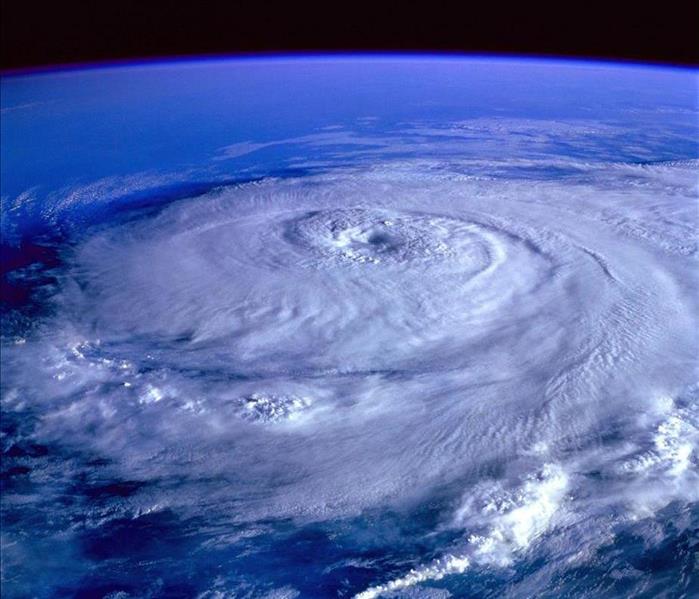 Equal parts beautiful and destructive.
Equal parts beautiful and destructive.
For better or for worse, most of us seem to agree that 2020 was a year for the history books. Not only did we experience a global pandemic bringing fear and uncertainty into everyone’s lives, 2020 also brought us the most active storm season in recorded history. The lead seasonal hurricane forecaster at NOAA’s Climate Prediction Center, Gerry Bell, boldly claimed that we could see up to 25 named storms this season. To put that number in perspective, the 1981-2010 historical averages were less than half of that. By the end of the Hurricane season, we would see an overwhelming 30 named storms.
Of these devastating forces of nature, 12 made landfall in the U.S. With the increased number of storms, the National Hurricane Center had to dive deeper into the Greek alphabet for names than ever before.
Of the 30 named storms we saw:
- 13 hurricanes (6 major)
- 15 tropical storms
- 2 subtropical storms
Why was the weather this year so extreme? This year had abnormally warm waters because of El Niño. Climate conditions and record high ocean temperatures in the Atlantic, Caribbean and Gulf of Mexico combined to create an environment suitable for storms to form, which led to the increased number of reported storms.
In the U.S., 6 of the 12 storms to hit were hurricanes which resulted in severe flooding and water damage, leaving many homes and businesses devastated. Overall storm damage, according to the CDP, is expected to exceed $41 billion.
From small leaks to the devastating effects of storms, the experts at SERVPRO recommend taking immediate action. Through acting fast you will not only minimize immediate damages to your home or business, but you will also help minimize chances of experiencing secondary damage long after the initial cause of damage has passed. Give SERVPRO of Pitt/Greene counties a call to take care of your water damage needs, rain or shine, 24/7/365 at: (252)-329-7205.
Restoring Your Electronics After a Fire
11/9/2020 (Permalink)
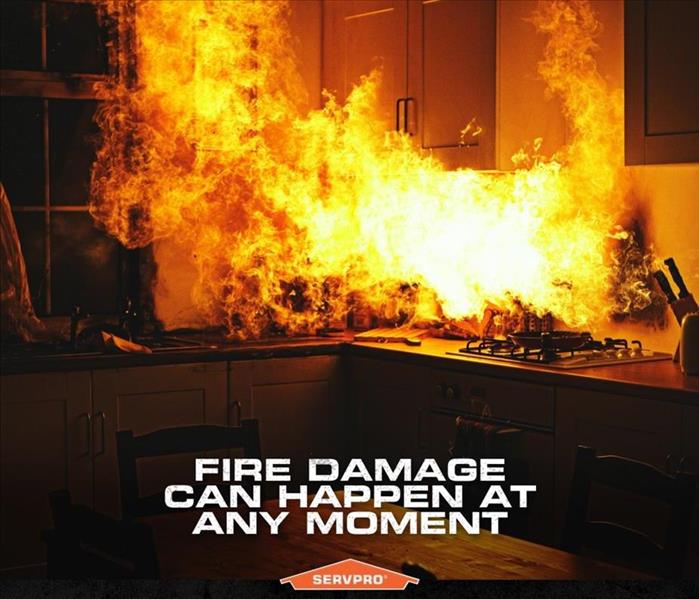 If you have fire related damage, call SERVPRO of Pitt/Greene counties to take care of all your commercial and residential needs.
If you have fire related damage, call SERVPRO of Pitt/Greene counties to take care of all your commercial and residential needs.
Recovering from a commercial fire can leave Greenville, NC residents with a lot to think about. You need to find a trusted fire restoration company that can help you through the fire damage process. Our teams can help with damaged walls and ceilings, furniture, and we can even take care of sensitive electronics. Fires can cause significant amounts of damage through power surges, smoke and soot. Depending on the severity of the damage, sometimes this equipment can be salvaged with a professional touch. With the proper steps, some electronics can be restored to like-new.
Steps to protect your electronics after a fire.
- Avoid Power: While you may be tempted to turn on a computer or other electronic device to see if it works, this can cause more harm than good. Smoke and soot can cling to the metal surfaces in your device, which can lead to corrosion when power is applied; Leave any electrical devices turned off and unplugged.
- Get Them Cleaned: Any residue from the fire will need to be completely removed from the device. For this reason, a computer cleanup can take a while. Professionals will go over every inch of the hardware to ensure the potentially damaging residues are gone.
- Have an Inspection: After the initial cleaning, you may want to have the electronics inspected one last time before adding power. This final inspection can look over the computer for more signs of fire or smoke damage. An electrical fire can cause unexpected smoke residue buildup on internal parts of the computer, so a second inspection is a good idea.
Many businesses rely on computers and other electronics to get business done. Restoration professionals may be able to help you restore computers, television sets, cash registers, security systems and other electronics key to your day-to-day activities.
An electrical fire can do a lot of damage to your commercial building. Restoring your belongings after the disaster can help you get back on your feet. Give us a call at (252)-329-7205
When to Have Water Restoration in Greenville, NC
10/26/2020 (Permalink)
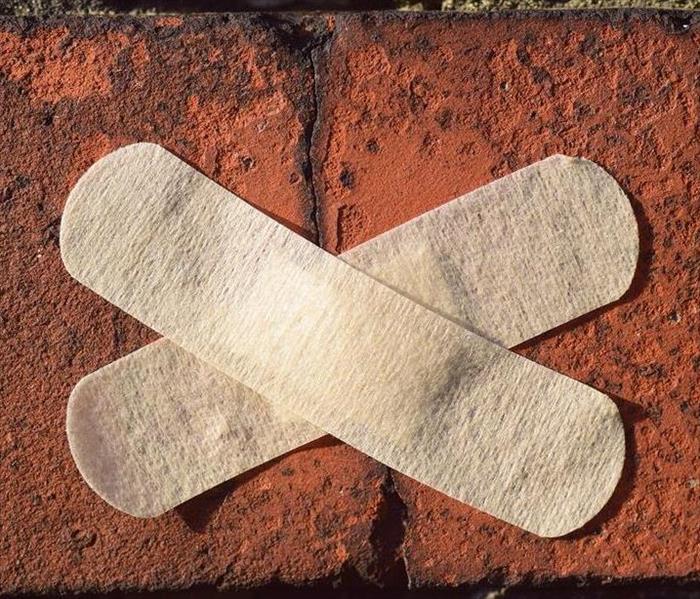 Trust the professionals at SERVPRO to fix your home or business after a water damage.
Trust the professionals at SERVPRO to fix your home or business after a water damage.
Water Damage Repair is More Successful the Quicker it Takes Place – Call SERVPRO to Your Greenville, NC Home As Soon As Possible
A leaking water supply line isn’t always immediately obvious. The longer it takes to notice, the more time it has to damage its surroundings. This often requires professional intervention. If you suspect there may be hidden water damage in your Greenville, NC home, give the IICRC Certified technicians at SERVPRO of Pitt/Greene a call. Waiting only allows water more time to cause secondary damage and potentially allow for mold and mildew to sprout. In other words, if you suspect water, don’t wait! We offer emergency water extraction and repair services seven days a week, 24 hours a day, to give you added peace of mind.
Sometimes water damage is unavoidable, such as flooding from excessive rain. However, some water events can be stopped in their tracks by merely updating your water-run appliances, maintaining your plumbing, and doing scheduled checks.
What to do in an Emergency?
Until the time that our technicians arrive at your property, it helps to have the water supply turned off to any suspected areas where the water could be coming from. This keeps water from further flooding the entire space. If you are unsure of the easiest and safest way to turn off the water to that one location, you can try to shut off the incoming water supply to your home.
You can also help minimize damage until a crew arrives by utilizing a few useful tips, such as:
- Opening up windows to get airflow to the impacted area
- Trying to carefully ventilate the space to keep relative humidity levels low
- If possible, you can cordon off the water incident zone from other rooms in the house. You can do this by shutting doors, putting down a blanket or towel, and keeping family and pets from going in and out.
How Does SERVPRO Take Care of Cleanup?
When you contact us for water damage repair, one of our technicians will assess the situation. Removing any standing water is necessary to move on to drying and dehumidification. In most cases, we will do our best to restore your home instead of simply removing everything that has been affected and replacing it later. This can include cleaning and restoration of your furnishings, personal belongings, and any salvageable structural materials. Our technicians take the necessary time to assess each area within the impact zone so that we never leave any moisture behind. Hidden pockets of moisture hinder the cleanup process and leave the door open for microbial growth. In some situations, controlled demolition is necessary to remove damaged materials to be replaced by all-new materials.
Why Controlled Demolition?
Whenever water saturates building materials, there is always a chance that they can become compromised. Soaked drywall, warping floorboards, and soggy insulation are all areas that can quickly get addressed with our controlled demolition practices. We work fast to ensure your interior is left “Like it never even happened,” so that you and your household can get back to your normal routine as quickly as possible.
How Does Drying Work?
There may be water intrusion incidents where we have to perform pack-out services to store or clean your belongings off-site. This helps us to maneuver during the repair work and to utilize our drying and dehumidification equipment to their fullest potential. We use the latest Advanced Structural Drying (ASD) techniques, ensuring to look for water that may have migrated under flooring, behind walls, and baseboards. Our trucks come loaded with tools and equipment that allow us to achieve our goals fast, such as:
• Centrifugal air movers and industrial fans
• Moisture detection tools such as sensor, meters, and thermal imaging cameras
• Commercial grade dehumidifiers
Once your cleanup and repair project is complete, there are some things that you can do to hopefully avoid such a catastrophe in the future, including:
• Inspections, checks, and maintenance of your water-run appliances and plumbing
• Updating water heaters and other appliances to help avoid breakdowns
• Noting any sudden changes in water pressure or your water bill
• Remaining mindful of any musty odors or discoloration that develops of walls or ceilings
Of course, even with proper preparation and planning, water damage can still strike unexpectedly. If you are ever in need of our professional services, give SERVPRO of Pitt/Greene counties a call at: (252)-329-7205.
What Is Removed After A Water Loss?
10/12/2020 (Permalink)
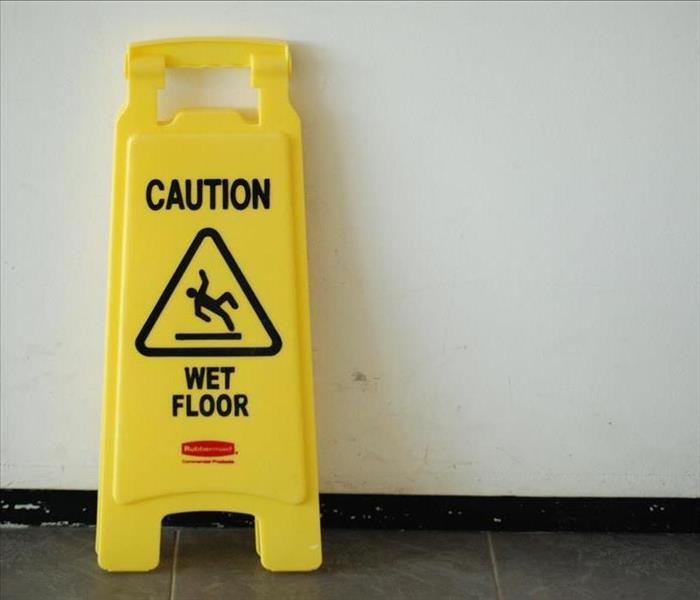 Trust the IICRC Certified professionals at SERVPRO to take care of your water damage remediation needs.
Trust the IICRC Certified professionals at SERVPRO to take care of your water damage remediation needs.
Be it just a leak in a supply line or thousands of gallons rushing through your home or business, having a water loss can be incredibly frustrating. Most water damages are something between these extremes, but regardless of the amount, water can damage most building surfaces with prolonged exposure. Drywall, sub-flooring, particle board, even hardwoods can act like a sponge and absorb large quantities of moisture, causing them to swell and warp. If such deformation occurs, the affected materials don’t return to shape or maintain their original structural strength.
Materials that hold moisture for long periods of time are also much more likely to grow mold. These are a few reasons such materials might need to be removed.
Carpet pad often has a vapor barrier built in to it, and once excess water becomes trapped under such a pad, it must be removed for the subfloor to dry and not become further damaged. When dirty water comes in contact with carpeting and pad, drywall, or wood/engineered wood, the materials are generally removed due to gross contamination and material damage.
The crew at SERVPRO of Pitt/Greene Counties know when materials can be saved and when they must be removed. Allow us to explain the drying process and to assist you every step of the way. Your home will be left dry, decontaminated and ready for repair. Give us a call at 252-329-7205 when water invades your home or business.
Keep Your Greenville, NC Pets Safe From A House Fire
10/6/2020 (Permalink)
 Keep your playful puppies and kittens happy and safe with a fire emergency plan.
Keep your playful puppies and kittens happy and safe with a fire emergency plan.
Having an emergency plan is highly recommended, even for our four-legged friends. Do you know how to help your pets in a time of emergency? As a pet lover and owner in Greenville, NC, planning out what do and how to escape in the event of something like a fire is crucial for your animals’ safety.
Planning:
While discussing emergency plans with your family members, be sure to bring up pet preparations.
A few suggestions would be to:
- Relocate your pet cages and beds so they are near exits
- Denote what and how many pets are in your home on an easily visible window or door so that firefighters are aware they may still be on the premises.
- Provide names, descriptions, favorite hiding spots and other relevant pet information.
Practice:
Make sure to practice emergency procedures and have children attempt to remove the pets. Use caution and be certain to illustrate how important it is that they should never put themselves in harm's way. If they cannot get to the animal in a timely fashion, it's best to vacate and let the professionals look for them.
- Keep leashes, collars and carriers near an exit, if possible.
- Consider how you might be able to help your pets ahead of time; you don’t want to have to figure everything out during a fire.
Think bout potential hazards:
As it turns out, man’s best friend is also a leading cause of house fires. Animals don’t understand safety measures or risk assessment, so we have to do our best to remove any risks from the equation. Chief among these risks are candles. While they add a nice touch to a living space, they are not so nice when knocked over from a pet in pursuit of their favorite toy. Depending on the style of your stove, knob protectors are another great consideration to stop unwanted usage. Removing access from a room is more difficult for certain animals, but getting a pet or child gate can help create safe zones for your pet.
Pets are like loved ones for so many of us. Be sure to include considerations for their safety when discussing emergency fire plans with your family. With just a little forethought, organizing and change, you can create an actionable plan to keep everyone safe. Then, your favorite local fire restoration company can happily work to restore any damages knowing you’re safely cuddling with your four-legged friend.
Tips For Managing Mold In Your Greenville, NC Home Or Business
9/28/2020 (Permalink)
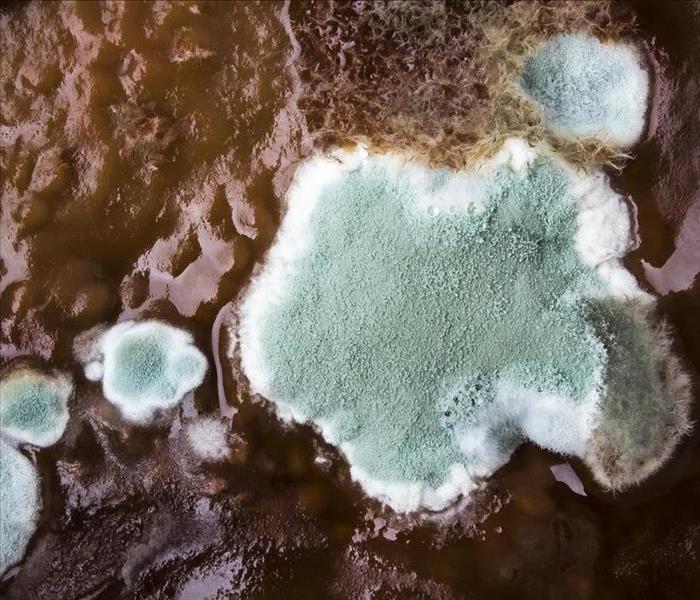 Keep an eye out for mold growth on any damp or wet surfaces.
Keep an eye out for mold growth on any damp or wet surfaces.
Eastern NC has a notoriously humid subtropical climate and the Greenville, Winterville and Snow Hill area is no exception. This near constant moisture and heat means mold excels at growing where you don’t want it. Being national leaders in residential and commercial remediation, the SERVPRO team has a significant amount of experience dealing with mold and we are more than happy to share some of our professional wisdom.
Ten Things You Should Know about Mold
- As many know, mold may cause potential health effects, depending on the type and individual sensitivity.
- There is no practical way to eliminate all mold and mold spores in the indoor environment; instead, prevention of mold spores from growing is key.
- If mold is a problem in your home or business, remediation and eliminating excess sources of moisture are crucial. Leaving it untreated will only allow it to spread.
- Most cases of mold that we are called to help with are from a leak; finding the source of the water problem is absolutely necessary to prevent further mold growth. If you’re unsure where the leak is coming from, contact a plumber who also offers leak detection!
- Reduce indoor humidity, typically between 30-60% to decrease mold growth by:
- Venting bathrooms, dryers and other moisture-generating sources to the outside
- Using air conditioners and de-humidifiers
- Increasing ventilation
- Using exhaust fans whenever cooking, dishwashing and cleaning
- Clean and dry any damp or wet building materials and furnishings within 24-48 hours to prevent mold growth.
- Clean mold off hard surfaces with warm water and detergent, and dry completely. Absorbent materials such as ceiling tiles, if moldy, may need to be replaced.
- Prevent condensation: Reduce the potential for condensation on cold surfaces (i.e., windows, piping, exterior walls, roof, or floors) by adding insulation.
- In areas where there is a perpetual moisture problem, do not install carpeting (i.e., by drinking fountains, by sinks, or on concrete floors with leaks or frequent condensation).
- Molds can be found almost anywhere; they can grow on virtually any substance, providing moisture is present. There are molds that can grow on wood, paper, carpet, and foods and all need to be remediated as soon as you are aware of the issue. Waiting will only cause more damage and in return cost you more money in repairs.
If you have any questions or would like to schedule service, give us a call at: (252)-329-7205.
Generator And Carbon Monoxide Safety
8/28/2020 (Permalink)
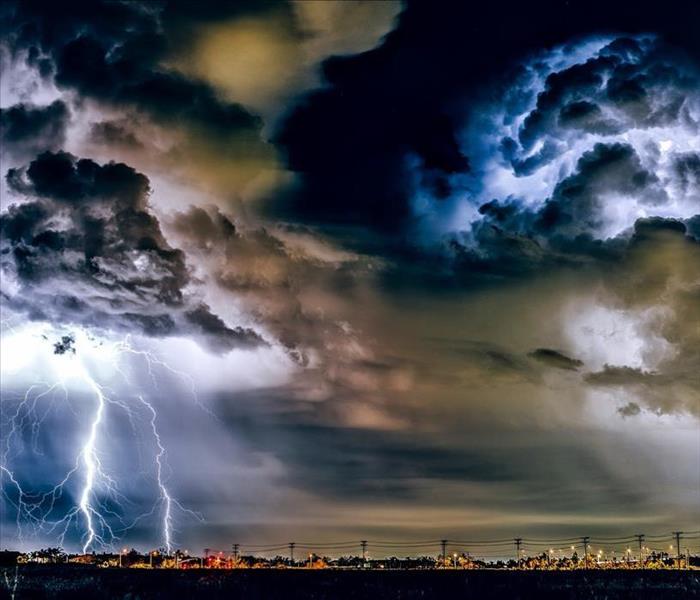 In the even of losing power, it is important to know safe generator operating procedures.
In the even of losing power, it is important to know safe generator operating procedures.
Generator Safety
Eastern NC residents enjoy beautiful summers and relatively mild winters. The flip side to this is our increased risk for severe weather such as tropical storms and hurricanes. Prepping for a big storm comes with the territory and many utilize backup generators to help with potential power loss situations. Using some key safety tips from the American Red Cross can help prevent accidental damages and keep your family safe.
- Never use a generator, grill, camp stove, or other gasoline, propane, natural gas, or charcoal-burning devices inside a home, garage, basement, crawl space, or any partially enclosed area.
- To avoid electric shock, keep generators dry and do not use in rain or wet conditions. Operate them on a dry surface under an open canopy-like structure, such as under a tarp held up on poles. Do not touch generators with wet hands.
- Opening doors and windows or using fans will not prevent carbon monoxide (CO) buildup in the home. Although CO is odorless and cannot be seen, it can rapidly lead to full incapacitation and death. Even if you cannot smell exhaust fumes, you may still be exposed to CO. If you start to feel sick, dizzy, or weak while using a generator, get to fresh air immediately.
- Install CO alarms in central locations on every level of your home or property and outside sleeping areas to provide early warning of accumulating carbon monoxide.
Following these simple recommendations is an easy way to ensure the safety of you and your loved ones. If your home or business suffers from storm damage, SERVPRO of Pitt/Greene Counties is here for you. Give us a call at: (252)-329-7205 for all of your mitigation and cleaning needs.
Preventative Measures for Uncertain Times
8/6/2020 (Permalink)
 SERVPRO will do whatever we can to keep you safe. Hopefully these tips can help!
SERVPRO will do whatever we can to keep you safe. Hopefully these tips can help!
The Centers for Disease Control and Prevention continues to develop new strategies and update preventative guidelines in an effort to keep people safe and informed. To help extend some of this information and keep our Eastern NC brothers and sisters aware of our services, here are some updates.
Symptoms
Illness from COVID-19 is quite diverse, from mild to severe symptoms that can potentially even include death. According to the CDC, symptoms may appear two days to two weeks after exposure:
- Fever or chills
- Cough
- Shortness of breath or difficulty breathing
- Fatigue
- Muscle or body aches
- Headache
- New loss of taste or smell
- Sore throat
- Congestion or runny nose
- Nausea or vomiting
- Diarrhea
Many of these symptoms can be related to other conditions and illnesses, so It is very important to consult your medical provider if you develop any severe or concerning symptoms to determine what they are being caused by.
Expert Level Cleaning Services
The SERVPRO franchise professionals here at SERVPRO of Pitt/Greene are uniquely prepared and equipped during this unprecedented time to clean and disinfect your home or business according to the protocols set forth by the CDC. We have decades of experience in dealing with biological contaminants and other, similar pathogens. Our crews go beyond the scope of work that regular janitorial staff perform on their regular cleaning schedule.
The CDC encourages cleaning of high-touch surfaces such as counters, tabletops, doorknobs, light switches, bathroom fixtures, toilets, phones, keyboards, tablets and tables. Other spaces mentioned in the CDC’s guidance for commercial spaces include:
- Kitchen/Food Areas
- Bathrooms
- Schools/Classrooms
- Offices
- Retail Spaces
- Water Fountains
- Shelving/Racks
- Sales Counters
- Carpets and Rugs
- Stair Handrails
- Elevator Cars
- Playground Equipment
- Fitness Equipment
Specialized Products
The CDC recommends usage of a labeled hospital-grade disinfectant with claims against similar pathogens to the coronavirus. Multiple products in the SERVPRO product line carry the EPA-approved emerging pathogens claims. We follow all guidelines as provided by the CDC and local authorities.
Need Specialized Cleaning Services?
Call Us Today (252)-329-7205
Minimize Your Risk
Tips and Best Practices to Minimize Your Risk
As our cities are beginning to reopen in “phases,” it is imperative to maintain vigilant, proactive and reactive measures to continue protecting yourself and others. Here are some tips to minimize your risks and exposure:
Don’t forget to give us a call
- Clean hands with sanitizer of at least 60% ethanol or 70% isopropanol content and wash your hands frequently
- Avoid touching your face and cover coughs and sneezes
- Disinfect “high touch” surfaces like doorknobs, light switches, tables, doorknobs, and handrails regularly
- Increase ventilation by opening windows or adjusting air conditioning
- Clean your phone regularly
- Wear a cloth or medical mask when around others, for their safety
- Maintain social distancing standards regardless of time and place
- Avoid direct contact when greeting others
Sources:
Keeping Your Greenville, NC Business Clean
6/1/2020 (Permalink)
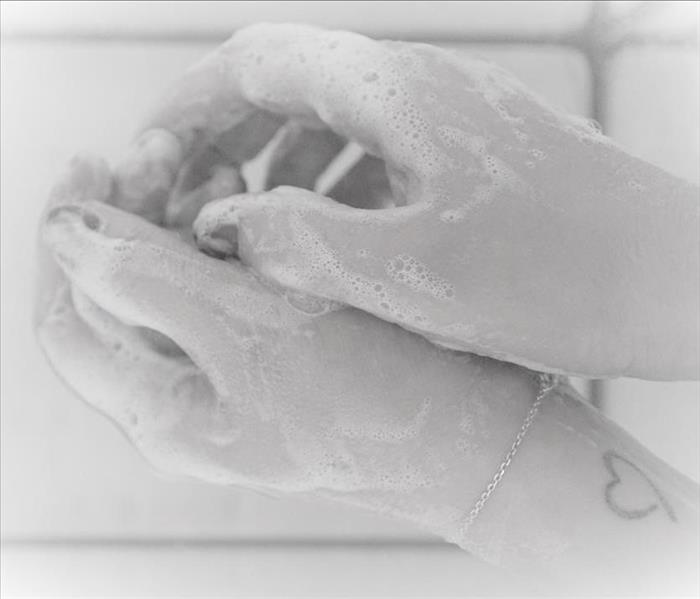 Be sure to wash your hands for at least 20 seconds under water as warm as you can stand.
Be sure to wash your hands for at least 20 seconds under water as warm as you can stand.
The Centers for Disease Control and Prevention continues to develop new strategies and update preventative guidelines in an effort to keep people safe and informed. To help extend some of this information and keep our Eastern NC brothers and sisters aware of our services, here are some updates.
Symptoms
Illness from COVID-19 is quite diverse, from mild to severe symptoms that can potentially even include death. According to the CDC, symptoms may appear two days to two weeks after exposure:
- Fever or chills
- Cough
- Shortness of breath or difficulty breathing
- Fatigue
- Muscle or body aches
- Headache
- New loss of taste or smell
- Sore throat
- Congestion or runny nose
- Nausea or vomiting
- Diarrhea
Many of these symptoms can be related to other conditions and illnesses, so It is very important to consult your medical provider if you develop any severe or concerning symptoms to determine what they are being caused by.
Expert Level Cleaning Services
The SERVPRO franchise professionals here at SERVPRO of Pitt/Greene are uniquely prepared and equipped during this unprecedented time to clean and disinfect your home or business according to the protocols set forth by the CDC. We have decades of experience in dealing with biological contaminants and other, similar pathogens. Our crews go beyond the scope of work that regular janitorial staff perform on their regular cleaning schedule.
The CDC encourages cleaning of high-touch surfaces such as counters, tabletops, doorknobs, light switches, bathroom fixtures, toilets, phones, keyboards, tablets and tables. Other spaces mentioned in the CDC’s guidance for commercial spaces include:
- Kitchen/Food Areas
- Bathrooms
- Schools/Classrooms
- Offices
- Retail Spaces
- Water Fountains
- Shelving/Racks
- Sales Counters
- Carpets and Rugs
- Stair Handrails
- Elevator Cars
- Playground Equipment
- Fitness Equipment
Specialized Products
The CDC recommends usage of a labeled hospital-grade disinfectant with claims against similar pathogens to the coronavirus. Multiple products in the SERVPRO product line carry the EPA-approved emerging pathogens claims. We follow all guidelines as provided by the CDC and local authorities.
Need Specialized Cleaning Services?
Call Us Today: (252)-329-7205
Tips and Best Practices to Minimize Your Risk
As our cities are beginning to reopen in “phases”, it is imperative to maintain vigilant, proactive measures to continue protecting yourself and others. Here are some tips to minimize your risks and exposure:
Practice Good Hygiene
- Clean hands with sanitizer of at least 60% ethanol or 70% isopropanol content and wash your hands frequently
- Avoid touching your face and cover coughs and sneezes
- Disinfect “high touch” surfaces like doorknobs, light switches, tables, doorknobs, and handrails regularly
- Increase ventilation by opening windows or adjusting air conditioning
At The Office
- Don’t shake hands – use other noncontact methods of greeting
- Use videoconferencing for meetings when possible
- When video calls aren’t an option, hold meetings in open, well-ventilated spaces
- Disinfect “high touch” surfaces like desks, keyboards, light switches, doorknobs, and telephones
- Consider adjusting or postponing large meetings or gatherings
- Wear a mask to help protect others
- Maintain social distancing regardless of time and place
Stay Home if...
- You are feeling sick
- You have a sick family member at home
Sources:
Cleaning Greenville, NC First Responder Vehicles
5/18/2020 (Permalink)
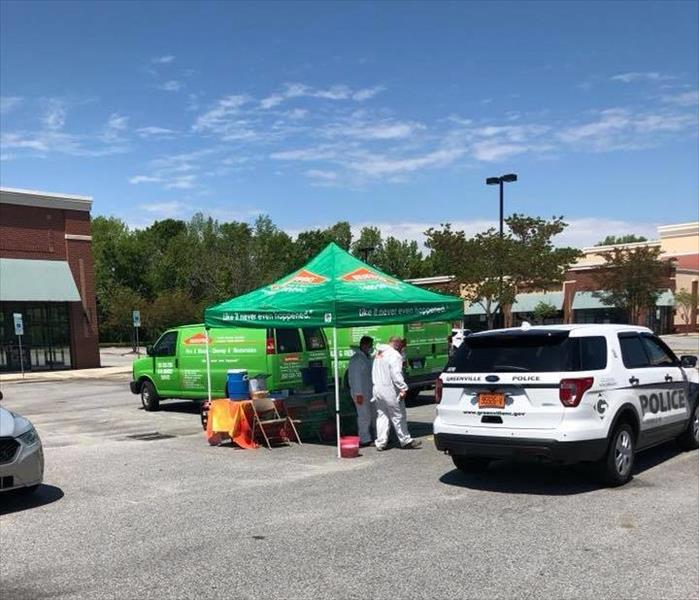 Our crew was happy to be able to help keep our first responders safe!
Our crew was happy to be able to help keep our first responders safe!
As a part of the communities in Pitt and Greene counties, we here at SERVPRO knew we had to do something to help our home towns out in these unprecedented times.
As a national leader in fire and water damage remediation services (and much more!), we work with a wide variety of first responders to address each job appropriately. As such, we thought one of the best ways to show our appreciation was to assist the men and women at our local police and fire departments. They risk their lives and health to keep all of us safe, so we extended an offer to them for a free vehicle cleaning and disinfectant service. The Greenville Police Department was happy to accept our offer and over the course of a couple days, one of our crews were on site and available for every officers’ cleaning needs.
For information about our vehicle, house or business cleaning services, or for all other inquiries, call us today at: (252)-329-7205
Why SERVPRO of Pitt/Greene Counties Can Handle Any Size Job
4/17/2020 (Permalink)
While SERVPRO is comprised of many individually owned and operated franchises, like one massive family, we work together when needed to provide the absolute best service for our customers. This is never more important or as obvious as when a storm hits. Local franchises can handle a lot, but in the event of large-scale disasters such as when hurricanes, floods and cold snaps afflict entire counties, the incredible SERVPRO team comes together. This kind of unification allows SERVPRO to truly take on any sized job.
Just as our franchise stands ready to help our customers every day locally, so too do our heroes in green stand ready to travel for storm and other large damages when another area needs us. So when inclement weather or large-scale disaster looms on the horizon, you can count on SERVPRO to handle all of your fire, water and mold remediation needs.
Give us a call anytime you need us. We are available 24/7/365 at: (252)-329-7205.
How SERVPRO Can Help New Bern Residents With Water Damage
3/30/2020 (Permalink)
Regardless of the size, water damages can impact the structure and air quality of affected homes and buildings over time. Handling every water related issue quickly and seriously can save you from much larger expenditures and frustrations in the long run. The trained IICRC Certified Technicians of SERVPRO of Craven/Pamlico have the knowledge and equipment to find and take care of moisture before more extensive damages occur.
Our crews are on standby 24/7 and will respond to your call with rapid response and the appropriate equipment when needed. Some of the equipment we use can make a tremendous difference, depending on your needs.
Armed with Moisture Sensors, our technicians can detect moisture in carpets, baseboards and walls that have no visible signs of damage.
Moisture Meters are a favorite go-to, used to determine the actual moisture content of various materials to determine if further drying efforts are necessary. The moisture tester provides accurate readings, allowing SERVPRO Professionals to monitor the drying process.
Thermo Hydrometers measure the temperature and relative humidity of targeted areas. This information enables SERVPRO Professionals to calculate and create an environment that is the most efficient for drying. Many types of water losses include contaminated water. This not only requires drying efforts, but typically disinfection and deodorization processes as well.
One of the best ways to achieve this is with our Fogger machines. These mighty little machines can be used to help deodorize as well as disinfect a wide variety of items and places, such as delicate upholstery and clothing to large structures and vehicles where there may be some areas that are difficult to get to otherwise.
For the technology, training and rapid response you can rely on, give us a call at (252)-637-7274 so we can make it "Like it never even happened."®
SERVPRO is Here to Help during this time of need
3/18/2020 (Permalink)
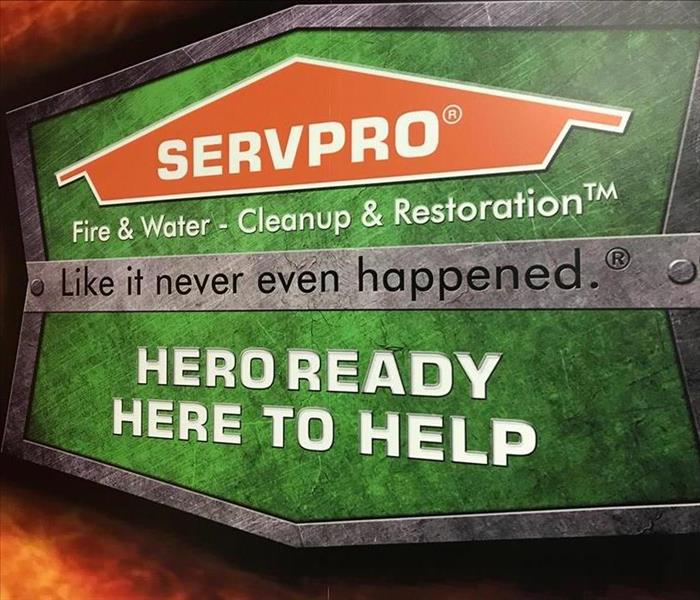 No matter your needs, the professionals at SERVPRO of Pitt/Greene are ready to help.
No matter your needs, the professionals at SERVPRO of Pitt/Greene are ready to help.
During this unprecedented time caused by the global pandemic of coronavirus, this is a reminder to our customers that we are specialists in cleaning services, and we adhere to the highest cleaning and sanitation standards.
Specialized Training
We are prepared to clean and disinfect your home or business, according to protocols set forth by the Centers for Disease Control and Prevention. We have years of experience in dealing with biological contaminants, and we will go beyond the scope of work that regular janitorial staff perform on a daily basis.
The CDC encourages cleaning of high-touch surfaces such as counters, tabletops, doorknobs, light switches, bathroom fixtures, toilets, phones, keyboards, tablets and tables. Other spaces mentioned in the CDC’s guidance for commercial spaces include:
- Kitchen/Food Areas
- Bathrooms
- Schools/Classrooms
- Offices
- Retail Spaces
- Water Fountains
- Shelving/Racks
- Sales Counters
- Carpets and Rugs
- Stair Handrails
- Elevator Cars
- Playground Equipment
- Fitness Equipment
Specialized Products
The CDC recommends usage of a labeled hospital-grade disinfectant with claims against similar pathogens to the coronavirus. Multiple products in the SERVPRO product line carry the EPA-approved emerging pathogens claims. While there is currently no product tested against this particular strain of the coronavirus, we are following all guidelines as provided by the CDC and local authorities.
Call Today for a Proactive Cleaning
If your home or business needs deep cleaning services, call the experts today – SERVPRO of Pitt/Greene, (252)-329-7205
A Professional Cleaning in Greenville, NC Can Remove Stubborn Scents
2/28/2020 (Permalink)
 We love having our our dogs around us; their scent, not so much.
We love having our our dogs around us; their scent, not so much.
Of the many reasons to have a professional cleaning and remediation company assist with your needs, their technological equipment is certainly an excellent benefit. One of the amazing things SERVPRO of Pitt/Greene Counties can bring to the table are our ozone machines. Otherwise known as activated oxygen machines, they cleanse the air in your home or business of stubborn odors that can persist even after their source has been removed and the area cleaned. We often use these machines to eliminate smoke odors after a fire. This process is done by converting the oxygen we breath (with a molecular composition of O2), into ozone (O3).
Other stubborn odors such as those from food and pets are also removed by this process. These machines are small but the impact they can have is huge! If you have an odor that you’ve been trying to get rid of, call SERVPRO of Pitt/Greene Counties to have one of our IICRC Certified Technicians help. (252)-329-7205
Cleaning Greenville, NC Businesses
2/17/2020 (Permalink)
Owners of commercial businesses don’t always have the time to be concerned about things like excess wear areas that can lead to having more dirt and dust in the office. Typically, that's what regular cleaning by maintenance or janitorial staff are for. While their services can go a long way, sometimes odor, moisture and grime can get beyond their limits. Having experts in cleaning and restoration like us here at SERVPRO of Pitt/Greene come in can take care of those stubborn odors and stains and can get your floors looking clean and professional.
SERVPRO of Pitt/Greene Counties understand that time is valuable. Our IICRC Certified technicians will make sure that the job is done expediently and correctly. With over 20 years of experience and over 100 exclusive cleaning products at our disposal, we are prepared and equipped to handle nearly anything your home or business needs. Some of our areas of expertise include:
- Biohazard
- Carpet and Upholstery
- Ceilings, Floors, and Walls
- Drapes and Blinds
- Fire and Water Damage
- Sewage
- Trauma and Crime Scene
- Vandalism
Give us a call at: (252)-329-7205 for more information.
What To Expect After A Water Damage in Greenville, NC
2/7/2020 (Permalink)
 Flooding is just one of the many ways water damage can occur.
Flooding is just one of the many ways water damage can occur.
Understanding how quickly water damage can turn from a problem to a nightmare is imperative to responding appropriately.
The first hour of a water damage can quickly saturate walls, furniture, personal items and anything else that might be in its path. The finish from your furniture can bleed onto carpets, likely permanently damaging them. Even if furniture isn’t nearby, many carpets can bleed their own dye out, running the risk of staining other parts of the material or other objects on or near them. Any paper-based belonging such as photos and books will wick up the moisture, swell and warp.
Within the first 24 hours, serious degradation to items such as metals can occur, leading to rust and tarnish. Drywall tends to absorb water and swell, causing it to breakdown. Wood swells and cracks and musty odors begin to form.
Within the first week, even more robust metals and woods begin to corrode and deteriorate. Doors, windows and structural components such as joists and studs begin to swell. Paint begins to bubble and blister on walls and serious warping can form on hardwood flooring. Mold and mildew begin to show visible signs, especially on upholstered goods. Health risks and major bio-hazard contamination is possible.
After a week of untreated water damage, remediation efforts become significantly more expensive and time consuming. Most everything at this point is contaminated and likely needs replaced. Serious structural rebuilding and mold remediation are probable for safety.
Fire Damage To Your Greenville, NC Business
1/27/2020 (Permalink)
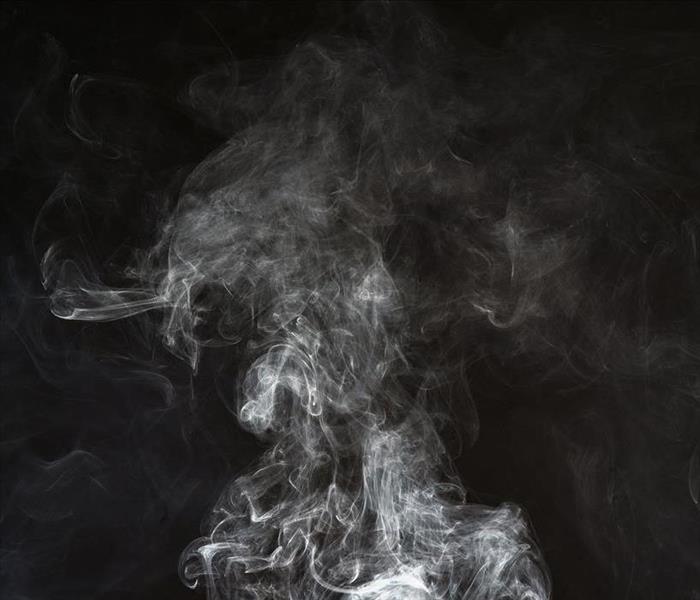 Smoke can be one of the most damaging secondary effects of a fire.
Smoke can be one of the most damaging secondary effects of a fire.
When a fire hits your Greenville, NC business, the often surreal experience can make the reality of the situation hard to digest. Extensive damages, temporarily closing down your business and trying to find outside assistance to get you back on your feet are just a few of the things that will likely cross your mind.
Fire damage remediation is a much more complex task than many realize: Ensuring the rebuild process goes smoothly, making sure insurers are satisfied with all service providers providing reliability as a constant and of course, repairing damages. Serious planning and correct implementation are crucial for a successful fire damage remediation. SERVPRO of Pitt/Greene Counties offers professional restoration services with this in mind to help make the process as smooth and pain-free as possible.
Our expert staff have seen numerous types of fire damages in their decades of collective experience. Even water infiltration that often occurs as secondary damage from fire-fighting measures are considered when we head out to help. This is tremendously helpful as our IICRC certified technicians understand that time is of the essence when dealing with water related damages.
The SERVPRO experience attempts every effort to get your business back up and running as quickly and smoothly as possible. From the start of the job to the finish, we will work diligently to help you through a fire damage.
How Severe Weather Can Impact Your Greenville, NC Home Or Business
12/19/2019 (Permalink)
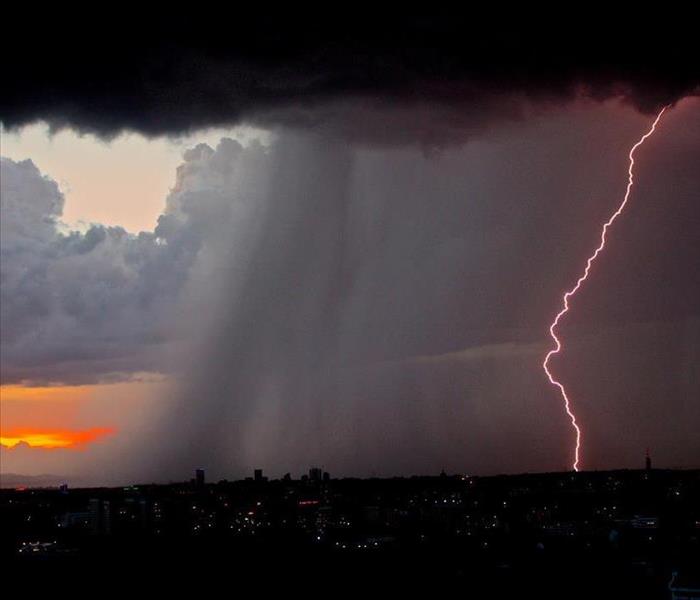 Severe weather can strike hard and unexpectedly in Eastern NC.
Severe weather can strike hard and unexpectedly in Eastern NC.
Eastern NC can see a huge variety of storm types, regardless of the time of year. From heavy rains and flooding to tornadoes and even the occasional hurricane. Any one of these storm types could easily cause damage to your home or business. Every person has their own set of circumstances that affect what happens after an unexpected storm damage. No matter what your scenario, It is important to know the types of damages that can occur.
Wind Damage
Storms with severe winds are fairly common in ENC, typically causing roof damage by ripping off your shingles or loosening your flashing, which can lead to water leaking in. Even a small leak can allow enough moisture to dampen an effected area and facilitate mold growth. If you suspect a leak in your roof, contact a professional at SERVPRO of Pitt/Greene counties to access the potential damage to ensure any mold is under control.
Flood Damage
The Tar River and all its many branches flow throughout the Greenville, NC area. Heavy rainfall can cause flash flooding and sustained storms can raise river water levels enough to potentially encroach many lower areas in Pitt and Greene counties. Such circumstances would likely require experts such as those at SERVPRO of Pitt/Greene to assess the situation and provide resolution. Our teams can help get your life back under control and your home or business cleaned up after a storm.
Lighting Damage
While not as common as wind and water damage, lightning can be another devastating source of damage from a storm. Our homes and businesses are often excellent targets for lightning to strike, with many objects that can attract a lightning bolt which can lead to a fire. Lightning strikes are some of the most powerful events in nature, reaching temperatures over 50,000 degrees Fahrenheit; That’s nearly five-times as hot as the surface of the sun! This incredible heat and the enormous amount of electricity discharged are the cause for around 2% of all fires.
Regardless of how a fire begins, the heat and smoke damage it creates can be difficult to deal with. Let SERVPRO of Pitt/Greene take care of you and your belongings, no matter how large or small the job may be.
What Wireless Emergency Alerts Can Do For Greenville, NC Residents
9/13/2019 (Permalink)
Our smartphones have become an integral part of our daily lives, allowing us a seemingly endless supply of information and entertainment. Now, the providers of the cellular networks that make our phones work nearly anywhere in the U.S. are providing a powerful tool that can alert us of any severe weather nearby.
The wireless industry has made a serious effort to have a Weather-Ready Nation by providing a nationwide emergency text alert system. Known as Wireless Emergency Alerts (WEA), these texts can keep you up to date and alert you to inclement weather.
What are WEA messages?
Wireless Emergency Alerts (WEA) are emergency messages sent by authorized government alerting authorities through your mobile carrier. This can include local and state public safety agencies, FEMA, the FCC, the Department of Homeland Security, and the National Weather Service. Since these are forwarded through your cellular service, there is no signup or app to deal with! The alerts are sent automatically to WEA-capable phones during an emergency.
How does this help?
Storms and other severe weather conditions can appear unexpectedly, especially when we get caught up in the routine of our often-busy lives. WEA messages can alert you via your mobile device if you may be in an affected area. This can be especially helpful if you are out of town or traveling and haven’t had the opportunity to check the weather beforehand.
What do the alerts cover?
- Extreme Weather and Hydrologic Warnings
- Local emergencies requiring evacuation or immediate action
- AMBER Alerts
- Presidential Alerts during a national emergency
Helpful Natural Gas Tips for your Greenville, NC Home
7/10/2019 (Permalink)
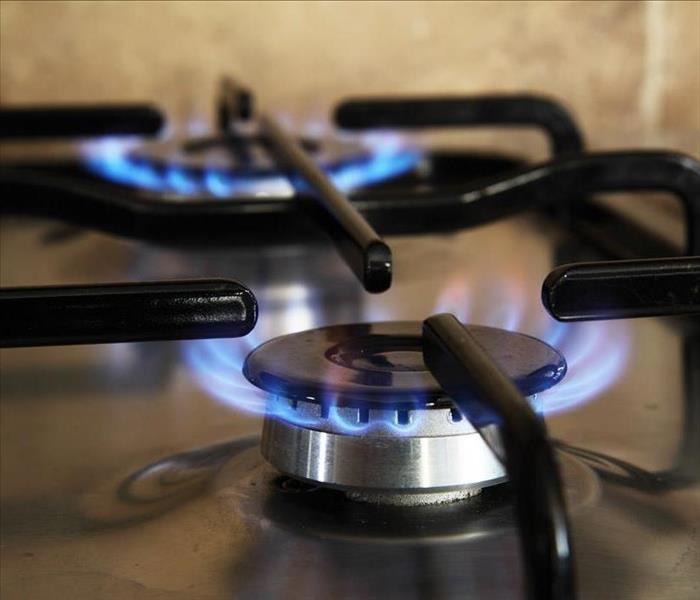 Unlit gas stoves are a common source of the scent of gas.
Unlit gas stoves are a common source of the scent of gas.
The scent of natural gas can be alarming—rightfully so—here are some safety tips you can use to figure out what to do:
- If you have a gas stove, make sure it is off
- Help ventilate quickly by opening any doors and windows you can
- Minimize usage of electricity as much as possible; use battery operated lights
- Exit the premises and contact your local fire department
- If you know how and it is safe to do so, shut off your gas meter
Typically, most homes have a gas meter located somewhere outside that runs in to the house. This allows you to shut off all gas to your home in case of such an emergency, giving professionals the opportunity to investigate and determine where the gas may be coming from without as much of a risk for fire or explosion.
In most cases, all that is needed is a wrench. Preemptively seeking out your gas meter and understanding how to safely shut it off ahead of time can be crucial.
Prepare contacts in case of an emergency
If your home is affected by fire or you believe there may be a gas leak and you can’t quickly find its source, evacuate and call 911.
Most fire departments can shut gas off at the source if you haven’t had the opportunity to find it yourself. If there is a fire, hopefully your first-responders can extinguish it before any major damages—but worry not, SERVPRO of Pitt/Greene counties can help bring you back to preloss conditions no matter the size of job.
Protect Your Greenville, NC Home From Water Damage
6/3/2019 (Permalink)
Water damage can seem like an unlikely consideration to those outside of flood planes or in areas with low annual rainfall amounts. Yet, even in drier, arid environments, flood damages are still common. Unlikely as it may initially seem, there is an explanation that relates to homes across the United States—our water supply lines.
These supply lines are thin hoses typically connecting our dishwashers, toilets, washing machines, refrigerators, water heaters and more. Just as the quality of these products vary, so too does the quality of the supply lines. Many suppliers opt for cheaper lines which may in turn be less reliable for the end user. These lines should be checked regularly for damage or any indication of a leak. Even if there are no apparent damages or signs of a leak, these lines can still burst from aging. So regardless of apparent condition, replacing the lines on a regular schedule could save you considerable time and frustration over the long run.
If you have never replaced your supply lines or it has slipped off of your regular maintenance schedule, strongly consider doing so soon. When you do replace your lines, be sure to look for a high quality line to give you some peace of mind.
Of course, even with thorough preparation and maintenance, water damage is still possible. If your property has had water damage of any kind, the expert technicians at SERVPRO of Pitt/Greene can help you get back to preloss conditions.
For additional information about our services, give us a call today at: (252)-329-7205
Let SERVPRO take care of you, Greenville, NC
4/29/2019 (Permalink)
We’ve all been there—your pet has an accident or tracks dirt in on a rainy day, the kids accidentally drop their juice, you spill some coffee during a Monday morning dash to work—life has a tendency to make a mess of things from time to time. Despite best efforts and regular maintenance of your home, sometimes it can be a bit much to take care of it all by yourself. That’s where we come in; no matter the size or situation, you can rely on your local SERVPRO of Pitt/Greene Counties to take care of your cleaning and restoration needs. Our highly trained technicians will help you manage and restore your home, giving you some peace of mind.
Some of the many services we provide are:
- Air Ducts & HVAC
- Carpet & Upholstery
- Drapes & Blinds
- Contents Disposal
- Deep Cleaning
- Debris Removal
- Ceilings, Walls & Hard Floor Removal
- Deodorization
- Mold & Mildew Remediation
- Biohazard Cleanup
- Crawlspace Services
Many know SERVPRO as a worldwide leader in Fire and Water Cleanup and Restoration, but our professionals can make much more "Like it never even happened." Call us today at (252) 329-7205 to schedule an appointment.
Cleaning Greenville, NC Residential Ducts
4/15/2019 (Permalink)
While many commercial settings have regular cleanings as part of a maintenance schedule, air ducts are often one of the more overlooked aspects. With regular cleaning, your HVAC system efficiency will improve, as well as extend the individual components lifespan. Aside from providing cleaner air to breath, clean ducts also conserve energy, saving you money in the long run.
Some choose to clean air ducts as often as once a year, while others prefer to have them cleaned when it becomes apparent they are dirty. According to the National Air Duct Cleaners Association (NADCA), “If your air ducts look dirty, they probably are.” Unfortunately, air ducts are typically out of sight, out of mind, since they are not easily visible in most business and don’t cause any immediately obvious problems when dirty.
If you haven’t cleaned your ducts in a while or are looking to plan a regular cleaning schedule, let our expert crews at SERVPRO of Pitt/Greene counties get the job done the right way. We will work with you and schedule our professionals to take care of all your cleaning needs.
Helping Greenville, NC Residents Recover From an Emergency
3/6/2019 (Permalink)
At SERVPRO of Pitt/Greene Counties, we strive to make our customers happy. This is something true of most respectable companies, but few succeed after their customer has just seen their house on fire, tried to stop a broken water line from flooding their home, or found a large patch of mold in their business.
These sorts of unexpected emergencies can dramatically impact people’s lives and leave them emotionally distraught. That’s why our crews treat you with humility and compassion. The recovery process after severe damage takes time, meaning our people can sometimes spend weeks or even months getting to know our clients and their families. It is our job and mission to take care of your precious belongings and restore your home or business—to make you happy.
We are people that care about you and want to see you smile. We are the professionals that you can count on 24/7 in case of an emergency. If you have any questions, give us a call at: (252) 329 7205
Carpet and Duct Cleaning for your Greenville, NC Home or Business
2/13/2019 (Permalink)
While many people know and trust SERVPRO of Pitt / Greene Counties for our professional fire and water damage remediation, there are many other areas our expertise can benefit your Greenville, NC home and business. For example, fire and smoke/soot damage in a commercial building typically requires professional HVAC and air duct cleaning which our crews are experienced with and prepared to help, no matter the size of job.
We are also equipped and certified to handle a wide variety of other situations such as biohazard cleanup, sewage, trauma & crime scenes, vandalism & graffiti, and more! If you have questions about the services we offer, give us a call at: (252) 329-7205 or visit our services page. Our crews will be happy to help you with whatever you need, from carpet cleaning to fire, water or mold remediation.
Greenville, NC Residents, Let us Take Care of your Flooded Business or Home
2/6/2019 (Permalink)
Dishwashers are a convenient and quick way of handling a dirty task. As much as they may be appreciated, they can cause some unexpected problems such as a leak in the middle of the night. This could leave your Greenville, NC business or house in dire need of water extraction and clean up that may be beyond your means of handling. The water damage remediation experts at your locally owned and operated SERVPRO® are more than equipped to handle such a situation.
Our experts know that the longer water remains on an effected area, the more damage it can cause. This knowledge is critical and motivates our crews to get your home or business taken care of as quickly as possible. Our crews are prepared to respond to an emergency water damage situation 24/7, giving you peace of mind that whenever you might need us, we are #HereToHelp.
Our crews are also equipped with advanced tools to determine where moisture is present and then remove it. One of these tools—an extractor—can simultaneously remove water while also applying heat to help dry the space it is extracting water from. We also have pumps if there is larger pools of water, and of course, the materials we need to cleanse and sanitize any affected areas.
Give us a call whenever you need us at: (252)329-7205 and we will be more than happy to make your damage "Like it never even happened."®
Smoke Detector Tips for Your Greenville, NC Home
1/30/2019 (Permalink)
How Many Fire Alarms Do I Need in My Home?
The number of detectors needed can vary greatly depending on the layout of your home. The National Fire Protective Association, however, recommends fire alarm placement:
- In every bedroom
- Outside the sleeping areas on all bedroom levels
- On all levels of the home including the basement
- At the bottom of stairways, including the basement stairs
What Type of Smoke Alarm Do I Need?
Ionization smoke alarms are the best at detecting hot, fast-moving fires, whereas photoelectric smoke alarms are best at detecting slow-burning smoky fires. If a fire alarm equipped with both technologies is available, strongly consider opting for it. If not, using a mixture of the two throughout your Greenville, NC home should work nearly as well.
Make sure your detectors are connected.
In the event that you have a house fire, having connected fire detectors can give you an even faster alert of trouble. This is especially important in loud environments or larger homes, as you may not be able to hear the alarm in the affected area until significant fire and smoke damage has occurred.
Be sure your detectors haven’t expired.
Smoke alarm manufacturers place the build date on the back of the detector. You should replace your detectors after 10 years from that date has passed, unless the manufacturer recommends a different replacement time.
Keep your batteries fresh and ready to go.
Many people replace their batteries on a set schedule, such as a specific day to remind themselves. Others wait until their detector begins a low-battery beep. If you prefer waiting until the alarm, be sure to replace all batteries at the same time.
Fire alarms are a must-have safety device in any home. They are very low maintenance, provide years of service, and can give you and your family peace of mind.
Of course, there is always a chance that even with the best preparation, unforeseen circumstances can happen. Just remember, if you or someone you know is in need of professional cleanup or restoration services, our 24/7 emergency crews here at SERVPRO® of Pitt/Greene Counties are #HereToHelp. For questions or information, give us a call at: (252) 329-7205, or visit our website.
Cooking Safety Tips for Greenville, NC Residents
1/25/2019 (Permalink)
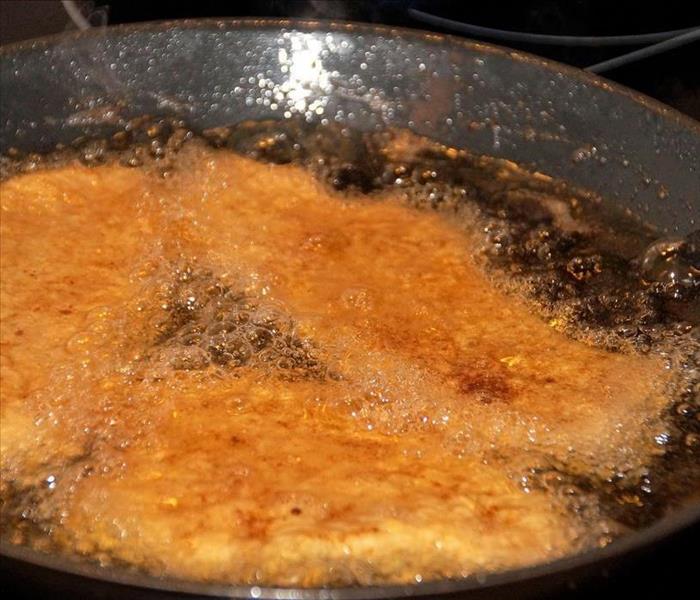 Frying is one of the most frequent causes of home cooking fires.
Frying is one of the most frequent causes of home cooking fires.
With cooler temperatures outside, many of us choose to stay inside and cook something new and exciting to pass the time. While generally a great idea, be mindful that cooking fires are the number one cause of home fires in the united states. To stay on the safe side, let’s take a moment to learn some more about this kind of danger and how you can prevent it.
To start, let’s take a look at the numbers: According to the National Fire Protection Association (NFPA), cooking accounts for about 47% of home fires, 20% of fire-related deaths and 45% of the fire-related injuries reported across the country each year.
Scary though these figures may be, there are many steps you can take to prevent these kinds of fires. As simple as it sounds, monitoring what you cook can be tremendously helpful: the NFPA states that nearly one-third of kitchen fires happen when the person cooking leaves the equipment they’re using unattended. If you’re using the oven, just be sure to check in on it regularly!
Also, be sure to keep oven mitts, plastic/rubber utensils, towels, paper products and other flammables away from heat—they can start a fire just as easily as burnt food!
Lastly, be sure to:
- Always stay in the kitchen when frying.
- If you see smoke coming off the food you’re frying, turn off the burner or safely remove the pan from the burner. Smoke is a sign the oil is too hot.
- Slowly heat the oil to the temperature you need.
- Add food to oil gently, laying it away from you so that it does not splatter.
- Always keep a lid beside your pan. If the pan does catch fire, cover it with the lid and turn off the banner. Let the oil cool before removing the lid again.
- NEVER put water on a grease fire. If a fire starts to spread, leave the house immediately and call 911.
Of course, there is always a chance that even with the best preparation, unforeseen circumstances can happen. Just remember, if you or someone you know is in need of professional cleanup or restoration services, our 24/7 emergency crews here at SERVPRO® of Pitt/Greene Counties are #HereToHelp. For questions or information, give us a call at: (252) 329-7205, or visit our website.
Greenville, NC Residents, is Your Business Prepared for an Emergency?
1/9/2019 (Permalink)
Many businesses aren’t prepared for emergency damages that can cripple productivity and longevity. That’s why the professionals at SERVPRO® offer a business ready plan app called the SERVPRO® Emergency READY Profile—or ERP—at no-charge so you can prepare for Water Damage, Fire Damage, Smoke Damage, Mold, or a Bio-Hazard contamination. This plan could save you hundreds or even thousands of dollars and give you peace of mind that in an emergency, you have a plan.
Typically, the faster the response time to an emergency, the better the chances of minimizing primary and secondary damage. We here at SERVPRO are known to be “Faster to Any Size Disaster”, and are available 24 hours a day, 7 days a week—meaning you can rest assured that we are here for you any time, any day.
Of course, there is always a chance that even with the best preparation, unforeseen circumstances can happen. Just remember, if you or someone you know is in need of professional cleanup or restoration services, our 24/7 emergency crews here at SERVPRO® of Pitt/Greene Counties are #HereToHelp. For questions or information, give us a call at: (252) 329-7205, or visit our website.
Space Heater Safety Tips for Greenville, NC Residents
1/7/2019 (Permalink)
As the temperature outside continues to drop, we respond with heating our homes more frequently, or even by introducing new heat sources such as a space heater. As warm and cozy as this might make you feel, there are some important considerations you may want to review.
Heating equipment fires accounted for 15% of all reported home fires in 2011-2015—or over 25,000 residential fires related to space heaters. The following guidelines can help you choose the right heater to keep you and your family safe.
- Second-hand goods are a great way to be frugal, but purchasing a newer model heater branded with the Underwriter's Laboratory (UL) label should ensure that all of the current safety features are present.
- Heater size can make a big impact on your energy bill. Typically, manufacturers will have a guide on the box to help you choose the optimal sized heater for your needs, so be sure to pick the right size.
- If available, choose a thermostatically controlled heater to further reduce energy costs.
- Place the heater you choose on a stable, level surface where pets and children cannot accidentally harm themselves. Also, be sure not to place your heater anywhere near materials that can combust.
Of course, there is always a chance that even with the best preparation, unforeseen circumstances can happen. Just remember, if you or someone you know is in need of professional cleanup or restoration services, our 24/7 emergency crews here at SERVPRO® of Pitt/Greene Counties are #HereToHelp. For questions or information, give us a call at: (252) 329-7205, or visit our website.
How we help Greenville, NC residents after a fire
1/2/2019 (Permalink)
What to do
If you find yourself wondering what to do after a fire occurs, getting in contact with the available 24/7 experts here at SERVPRO (252-329-7205) can help you quickly get on the path of restoring your home. Time can be of the essence in such situations, as often times the heat from a fire can damage your home’s structure, leading to further damage from exposure to outside elements. Firefighting methods can also cause water damage—thankfully we here at SERVPRO are more than ready and equipped to help.
What we can do to help
Depending on the level of damage, there are several steps we take to get you back in your home. The first thing we do is come and evaluate what areas need what services. Typically, firefighting methods can leave extensive water damage, which we are also well equipped to handle. Once a plan has been made, we can begin removing any materials which have been damaged beyond repair. This can be walls, ceilings, flooring, personal goods and more—we do it all! Finally, we can begin cleaning your home and items to remove stubborn soot stains and the persistent scent of smoke.
Here to help
The professional restoration services available at your locally owned SERVPRO® of Pitt/Green & Craven/Pamlico counties are available 24 hours a day, seven days a week if you or someone you know is in need of expert Fire & Water – Cleanup & Restoration™ services. Give us a call at: (252) 329-7205. #LikeItNeverEvenHappened
Getting and Keeping Greenville NC Residents Dry
12/28/2018 (Permalink)
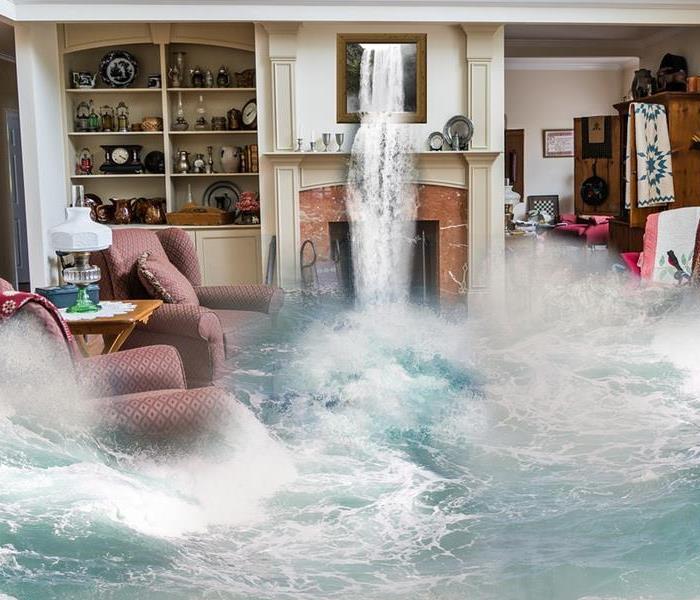 Even If you find yourself up to your knees in water, we here at SERVPRO are ready to help
Even If you find yourself up to your knees in water, we here at SERVPRO are ready to help
From a leaking roof to a dishwasher gone awry, water damage can occur in nearly any home, at any time. While we can try our best to prepare for these potential hazards, sometimes damage is inevitable. Unfortunately, depending on the source of the water, this can often lead to our most precious items—the things that make our house a home—becoming damaged. That's where we here at SERVPRO come in. We are well-equipped and ready to help in any situation, including getting those sentimental items back in the best possible shape.
If you or someone you know finds themselves needing professional cleanup & restoration services, the compassionate experts you can trust at SERVPRO® of Pitt/Greene counties are Here To Help® 24/7 at 252-329-7205. #LikeItNeverEvenHappened #HereToHelp
Fire Preparedness for Greenville, NC Residents
12/12/2018 (Permalink)
Greenville, NC residents, do you have a fire escape plan in case of an emergency? Being prepared and having a plan of action could make all the difference in case of an emergency. Here are some tips to help.
Protective Equipment
Having properly operational smoke detectors in your home can give you crucial time to respond to a fire. Be sure to change their batteries on a frequent basis.
If you keep a fire extinguisher in your home, it is important to periodically check its pressure levels to ensure functionality. Keeping the right type of extinguisher nearby can be another important factor; for a list of the different types of extinguishers and how best to use them, click here.
Have an Escape Plan
Planning out what to do in an emergency with your family every few months helps to keep everyone ready and aware. Going through your home looking at exits together and discussing where to meet if you get separated is a great way to stay prepared.
Emergency Contacts
Keeping a list of family doctors, medicines and medical information such as allergies can help responders provide you with the best possible care. Having family members in your emergency contacts can also enable you or others to quickly get in touch with those you love.
What to do After a Fire
Even if a fire doesn’t directly damage a large portion of your home, the smoke and soot as well as any water dispersed by the fire department may leave you needing professional restoration services. Of course, we here at your locally owned SERVPRO® of Pitt/Green & Craven/Pamlico counties are available 24 hours a day if you or someone you know is in need of expert Fire & Water – Cleanup & Restoration™ services.
Cold weather tips for Greenville NC residents to keep you warm and safe for the holidays
12/3/2018 (Permalink)
With winter nearly upon us, the temperature is starting to drop to some uncomfortably low levels. Make sure you and your loved ones stay safe and comfortable with these helpful tips.
For Outside
Cooler temperatures mean even quick trips to the store can be enough to give us the chills. While making us look cool, what we choose to wear when we go outside can also make a huge difference in how well we regulate our temperature and maintain our comfort level.
- Being one of the more well-known methods for a reason, dressing in layers is an effective way to keep your body insulated and warm. Just be sure not to bundle up too much if you’re going to be active—if you start to sweat, it can siphon the heat away from you when you stop to rest.
- Aside from headgear, such as hats and beanies, another common piece of winter attire many of us wear is gloves—but did you know that mittens are actually more effective at keeping your hands warm? If you are prone to getting cold and staying outside for more than a quick walk, mittens might be a great way of keeping those digits delightfully cozy.
- Along with the cold temperatures comes dry air which accelerates dehydration. Be sure to drink plenty of liquids, especially warm ones if possible. This will help you regulate your body temperature as well so maybe it’s time to consider that hot cocoa! In fact, staying warm takes a lot of energy from our bodies, so a little extra sugar in your beverage of choice might seem a little less concerning. Just enjoy in moderation.
For Your Pets
Animals get cold in the winter time too—try and keep them indoors as much as possible to keep them happy, healthy, and ready to put a smile on your face with their unique charm.
- If it proves impossible to bring an animal inside or if a pet will be exposed to cold conditions for a prolonged period of time, be sure to provide a dry, windproof shelter that is capable of keeping them out of the elements.
- When bringing a pet back inside during wet conditions, be sure to dry them thoroughly so they can warm back up and look their best for all your holiday photos.
- Just like you, pets can become dehydrated quickly in winter conditions. Be sure your pets have a fresh, clean and unfrozen water source to keep them going strong.
For Your Home
Preparing your home for cold weather is an easily (and often) overlooked consideration that can quickly escalate into some serious problems. Try some of the following tips to keep your home and family protected.
- One of the most common heating sources for houses and apartments is gas-powered furnaces. While effective at their job and generally reliable and safe, like any mechanical device, there is a chance for different kinds of failures. To avoid the risk of carbon monoxide building up, be sure to put new batteries in existing carbon monoxide detectors or install new ones if your home is not yet equipped.
- Make sure to shut off outdoor faucets and insulate them with foam, as they are more directly exposed to temperature drops. Don’t forget to drain and disconnect any hoses to keep them in good condition for when you need them.
- Cold temperatures can also put your pipes in danger of freezing and consequently bursting from the pressure. Pipes in your outside walls, crawlspace, and attic are especially prone to this, so be sure your pipes are adequately insulated. This could potentially save you and your home from an unexpected repair.
Of course, there is always a chance that even with the best preparation, unforeseen circumstances can happen. Just remember, if you or someone you know is in need of professional cleanup or restoration services, our 24/7 emergency crews here at SERVPRO® of Pitt/Greene & Craven/Pamlico are #HereToHelp.
Keep it Cool Greenville When Things Start to Heat Up
4/19/2018 (Permalink)
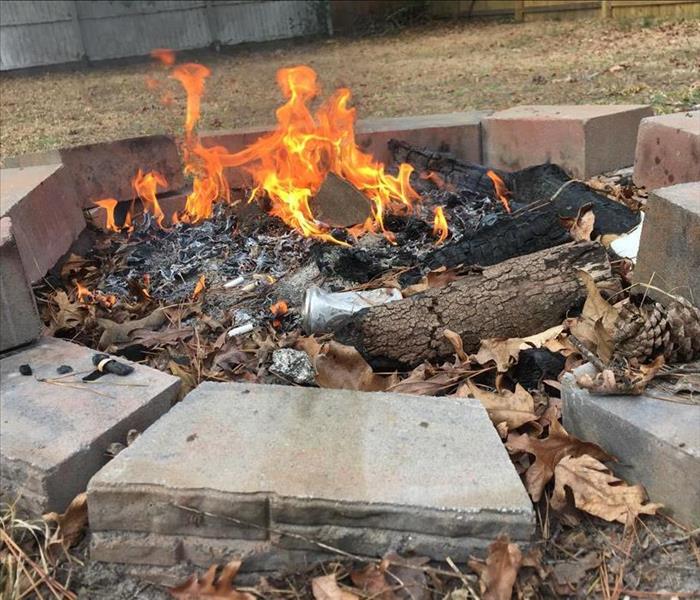 Fires can get out of control easily so be prepared!
Fires can get out of control easily so be prepared!
Fire Safety for Warm Weather
With the weather warming up, it's good to know some tips regarding how fires can start. Below is a list of ideas to prevent outside fires.
Grilling & Campfires
- Only grill outside; at least 10 feet from siding/railing and out from under eaves and overhanging branches.
- Clean your grill after every use. Grease buildup can cause spontaneous fire growth.
- Keep matches, lighters, and starter fluid out of the reach of children in a locked drawer or cabinet.
- Establish a 3-foot caution radius around grills and campfires. (a “kid-free” zone around grills)
- Try to use long-handled grilling tools in order to prevent overexposure to heat.
- When grilling, wear short sleeves or roll them up.
- When using a gas grill, always open the lid and allow excess propane to dissipate before lighting burners.
- For campfires and charcoal grills, keep a water bucket or hose and a shovel within reach (a fire extinguisher is preferable for gas grills due to possible grease buildup on grill surfaces)
- Tents should be set up up-wind of any fire source and at least 15 feet away.
- Never leave a grill, fire-pit, or patio torch unattended. Make sure it is fully extinguished!
- Place coals in a metal can with a lid once they have cooled.
- Stay informed on local laws and fire regulations.
- Read any warning labels and instructions when using charcoal, lighter fluid, or any equipment involving the use of fire.
Wildfires & House-fire Preparedness
- Know to STOP, DROP, and ROLL if an article of clothing catches on fire.
- Check fire alarms, extinguishers, and sprinklers at the beginning of every month to make sure they are up to code.
- Know how to use a fire extinguisher! Pull the pin, direct nozzle toward the base of flames, and spray in a sweeping motion.
- Assemble an Emergency Kit with three days' worth of food, water, and medical supplies in case of wildfire.
- Sit down with your family to decide an escape-route plan and meeting location in the event of a house fire. Write down the plan and keep it in the emergency kit.
- Create a Safety Zone of 30 to 100 feet around your home. Clear away dry vegetation and brush to prevent fire from spreading.
- Make sure your home and address are clearly visible to help firefighters locate you in the event of an emergency.
Practice these precautions instead of just talking about them! It’s the best way to make sure everyone remembers what to do in an emergency. If you would like to know more, call us today at (252) 329-7205.
Freshen Your Ride!
4/9/2018 (Permalink)
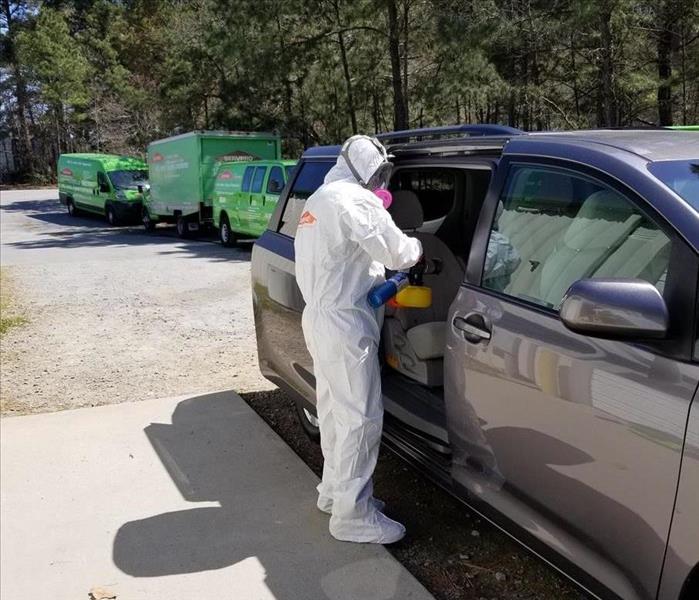 One of our technicians using a fogger to eliminate odors in a vehicle.
One of our technicians using a fogger to eliminate odors in a vehicle.
Picture this. It’s 80 degrees outside, you’re getting in your car and ready to head to work or the grocery store or the pool when suddenly it hits you. A whole winter’s worth of stale crumbs, pet dander, and random clutter. Colder weather prevents the growth of odors, but when cars start to heat up it seems like the smells begin to ferment and build up. You suddenly regret all the times you had your dog in the car or scarfed down some fast food while you were in a hurry to pick up a friend or make it to an appointment. Experts say that odor elimination is made easier and more effective by frequent and preemptive carpet and upholstery treatments. That’s where we come in! SERVPRO of Pitt/Greene Counties offers premium deodorization services.
Everyone loves a fresh-smelling car, but sprays and air fresheners can only do so much to mask odor. SERVPRO, however, has the training and equipment to permanently eliminate offensive odors. We are capable of complete odor elimination or even scented deodorizers ranging from “lemon fresh” to “tropical delight” to “cinnamon. With state-of-the-art equipment such as ULB foggers, Ozone Generators, Vapor Sharks, and Air Scrubbers, we’ll fulfill our company motto and make it seem “like it never even happened”. Our services also consist of eliminating the source of the problem, i.e., in-depth cleaning of all surfaces and materials of your vehicle and removal of any kind of unwanted foreign material.
Call Us Today at (252) 329-7205
Are you Deep-Frying your Turkey this Thanksgiving?
11/3/2017 (Permalink)
With the popularity of turkey frying increasing every year, people are at risk for fryer-related fires and injuries. U.S. fire departments are responding to more than 1,000 deep fire related incidents each year. According to the National Fire Protection Association deep fryer fires result in more than $15 million in property damage each year. Here are some rules to follow when deep frying a turkey.
Don’t Deep Fry a Frozen Turkey Frozen turkeys are full of moisture. Make sure your turkey is completely thawed out because water and hot oil don’t mix well.
Don’t Let Oil Get Too Hot If you see your oil smoking, it is too hot. When oil gets around 400-425-degrees it can catch on fire by itself. So, when deep frying a turkey most oils should stay around 350-degrees.
Don’t Use Too Much Oil When deep-frying a turkey a common mistake people make is putting too much cooking oil in their pot. Overfilling your pot can result in the oil spilling over into the flame on the burner. If you need to figure out how much oil you need try putting your turkey in an empty pot, fill the pot with enough water to cover the turkey. Once you remove the turkey mark the water line.
Don’t Deep Fry Indoors You should never deep-fry a turkey in your house, garage or on a deck. You should always deep fry a turkey in a yard away from anything that’s flammable.
Hopefully, this Thanksgiving will go smoothly. However, if a fire does occur and your Greenville home suffers fire damage, it can be especially devastating. In addition to the fire and smoke damage, your property may have substantial water damage from firefighting efforts. SERVPRO of Pitt / Greene Counties has the specialized fire and water damage equipment and expertise to help you through this tough time. Call Us Today – (252) 329-7205
Why you should Clean Your Gutters!
10/24/2017 (Permalink)
Fall is here and leaves are beginning to fill your gutters. The main purpose of gutters is to collect rainwater and direct it away from the house. So, when your gutter is clogged with leaves, twigs, and other debris they are no longer functional. If your gutter becomes clogged it can lead to the water finding a different way to drain from your roof. Water taking a different course can cause:
Leaking Basements. If gutters are clogged the extra water will collect around the basement and eventually leak in. A leaking basement can be extremely dangerous because it can cause gas leaks and other pollutants inside of your home.
Cracked Foundation. Foundation cracks occurs when water is absorbed into the home. A cracked foundation isn’t easy to spot and can lead to damage in between walls and eventually cause mold.
Wood rot. Sometimes the foundation of home can be made out of wood. A clogged gutter can cause water to accumulate and overtime the wood will rot.
Staining. Water can overflow from a clogged gutter and cause exterior damage to the home.
It is recommended that you clean your gutters twice a year, once in the spring and a second time in the fall. Taking time to focus on cleaning out your gutters may help keep water out and prevent damage to your home. If your Greenville property has been damaged by water caused by flooding or water leaks, we have the experience, expertise, and equipment to restore your property properly. Our water removal and cleanup process also provides validation and documentation that your property is dry. Call Us Today – (252) 329-7205
How to Prevent and Fight Grease Fires!
10/3/2017 (Permalink)
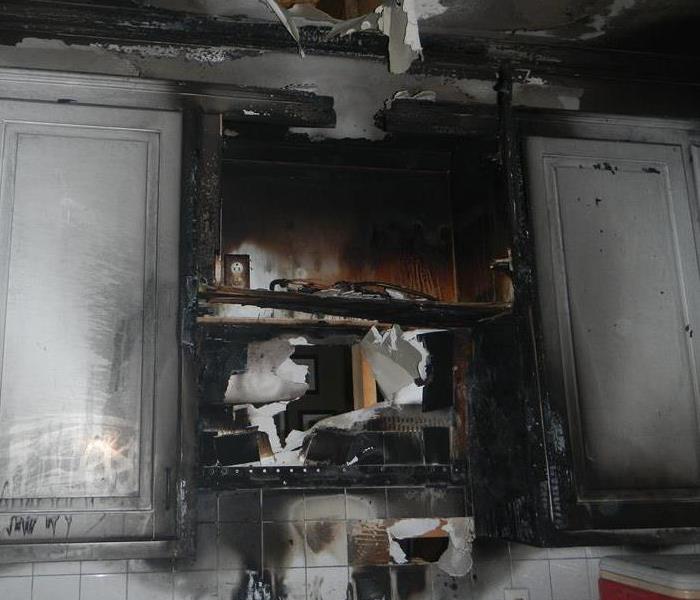 Kitchen Fire
Kitchen Fire
Did you know that Thanksgiving, Christmas Eve, and Christmas are the 3 biggest days of the year for grease fires? Grease fires occur when cooking oil becomes too hot. First the cooking oil starts to boil, then it starts to smoke followed by a fire. A grease fire is different from a regular fire, so the way you handle it is very important.
How can you prevent grease fires?
- Keep an eye on the food you are cooking regularly. Do not leave it unsupervised for extended periods of time.
- When frying, grilling, boiling, or broiling food, stay in the room.
- Do not leave anything that may catch fire near the stove top.
- Be extremely careful when placing food into hot grease.
- DO NOT ADD WATER TO GREASE.
If your oil does catch fire, complete the following:
- Turn the Heat Off
- Cover the Pot with a Metal Lid - Fire cannot exist in the absence of oxygen. With the lid on (and the heat off), the fire should quickly consume all the oxygen and put itself out. Use a metal lid since glass will shatter.
- Use Baking Soda - When heated, baking soda releases carbon dioxide with smothers out the flames oxygen.
- Spray the Pot with a Class B Dry Chemical Fire Extinguisher – For more information about fire extinguisher types, click here.
- Get Out and Call 911 - If the fire does break out of control, don't try to be a hero. Get out and find a phone to call 911.
With any luck, you'll never have to deal with a grease fire. However, if you do find your Greenville home or business suffering from grease fire damage, it can be especially devastating. SERVPRO of Pitt / Greene Counties has the specialized fire and water damage equipment and expertise to help you.
Have Questions about Fire, Smoke, or Soot Damage? Call Us Today – (252) 329-7205
SERVPRO Pitt/Greene helps in Texas!
9/15/2017 (Permalink)
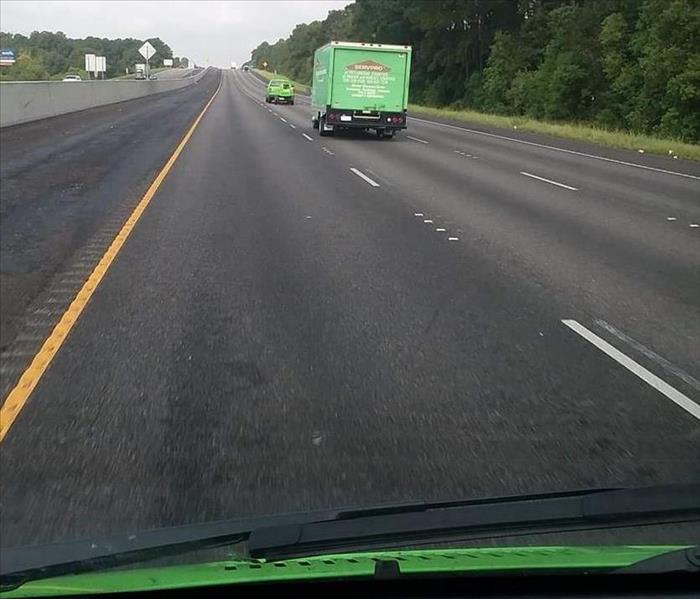 SERVPRO Pitt/Greene Crew headed to Texas!
SERVPRO Pitt/Greene Crew headed to Texas!
On September 5th, five of our crew members traveled from Greenville, NC to Corpus Christi, Texas to help with the damages after Hurricane Harvey. Hurricane Harvey was a category four storm that became the first major hurricane to make landfall in the United States since Hurricane Wilma in 2005. Hurricane Harvey made landfall in the US on August 24 in Rockport, Texas. The damage done in Rockport and the surrounding areas was catastrophic and had a huge impact on the locals. Record rainfall flooded largely populated areas and forced more than 30,000 people from their homes. Since Hurricane Harvey impacted massive amounts of people SERVPRO Pitt/Greene Counties will be in Corpus Christi, Texas for a couple more weeks helping to repair damaged homes and businesses. SERVPRO restoration services include: Water Damage Restoration, Fire Damage Restoration, Mold Remediation and Storm Damage Cleanup. SERVPRO Pitt/Greene Counties took the initiative to travel to Texas to help but there are several ways that you can help contribute as well!
Donate money. The best way to help Texans affected by disasters is to donate money to charitable agencies that are experienced in disaster relief. Before giving money to an organization, do your research!
Donate blood. Blood banks have been urging people to donate since demand for blood is rising. Find your local Red Cross and donate!
Open your home. You can offer to provide free accommodations to hurricane evacuees through Airbnb. The service is waiving all fees until Sept. 25.
Adopt a pet. If you’re thinking about adopting a dog or a cat, this could be a great time. Animal welfare organizations in Texas, Florida and around the country are likely to take in pets that have lost their owners. Check with your local animal shelter and adopt!
If you know anyone in Texas who has storm or flood damage Call Us Today at (252) 329-7205 or (252) 637-7274
Vacant homes can be a breeding ground for mold
8/31/2017 (Permalink)
Vacant homes can be breeding grounds for mold growth. Quite often we are called to a vacant home that is up for sale or the renter has moved out. The realtor/rental agent has come to show the home and finds mold growing on the walls. Mold can be seen growing most often in the upper wall locations, though it is not unusual to see growth at the lower wall levels as well. Closets that have been closed will quite often have the worst mold growth, partly because they are dark and mold loves the dark.
What could cause this? No broken water lines are found, the water is usually turned off to the home. Sometimes the HVAC system is off and that is the source of the problem. Having the heating and air turned off creates a high humidity level in the home. When the HVAC system is off there is no airflow circulating in the home therefore the air becomes stagnant. This is the perfect scenario for mold development.
Here are some tips on preventing mold issues in vacant homes:
- Always keep some heat and air running in the home. Set temperature so heat or air runs periodically during the day.
- Open closet doors to allow for airflow and light to enter.
- A ceiling fan left on low can help circulate the air in the home.
- Open window treatments/blinds at least ¼ open to allow in extra light. Remember, mold loves the dark.
- Visit the home occasionally. Just opening the doors and entering the structure allows for the exchange of fresh air and extra airflow. It’s also a great way to catch any issues before they become serious problems
If your home or business has a mold problem, we can inspect and assess your property and use our specialized training, equipment, and expertise to remediate your mold infestation.
If You See Signs of Mold, Call SERVPRO of Pitt/Greene Counties Today – 252-329-7205
Hurricane season is heating up!
8/17/2017 (Permalink)
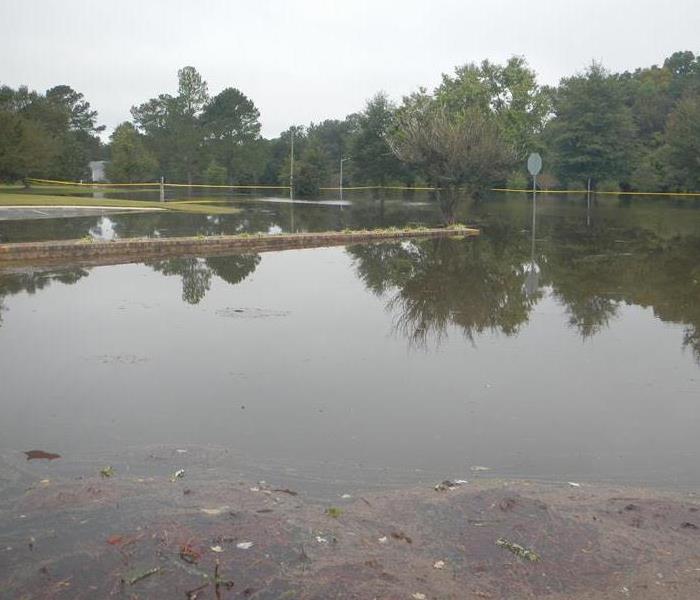 Flooding from Hurricane Matthew in 2016 caused serious damage in Eastern North Carolina.
Flooding from Hurricane Matthew in 2016 caused serious damage in Eastern North Carolina.
Hurricane season is heating up! August and September are the prime months for Tropical Storm and Hurricane development. Keep a close eye on tropical weather forecasts and potential impacts to your area. Forecasts give ample warnings to allow storm preparations to be completed. Please listen to the experts and take all needed preparations before storm arrival. If evacuation is ordered, you should follow that advice.
While it is important to protect your home and property, don’t forget to prepare for you and your family’s needs both during and after a storm’s impact. Below is a list of items that are good to have on hand in the event of a storm.
Don’t forget to plan for your pets as well. Extra pet food and a pet carrier or indoor kennel may be needed as outdoor pets will need to be brought inside during the storm or taken with you if evacuation is ordered.
SERVPRO of Pitt/Greene Counties specializes in storm and flood damage restoration. Our crews are highly trained and we use specialized equipment to restore your property to its pre-storm condition.
Faster Response
Since we are locally owned and operated, we are able to respond quicker with the right resources, which is extremely important. A fast response lessens the damage, limits further damage, and reduces the restoration cost.
We also have equipment and teams ready to go at SERVPRO of Pitt/Greene Counties in case you have an emergency.
Resources to Handle Floods and Storms
When storms hit Pitt and Greene counties, we can scale our resources to handle a large storm or flooding disaster. We can access equipment and personnel from a network of 1,650 Franchises across the country and elite Disaster Recovery Teams that are strategically located throughout the United States.
Be Prepared
Before the storm hits make sure you have a basic disaster kit ready. Having these supplies ahead of time will save you the frustration of going to the store right before the storm hits. Below are some recommended supplies for your kit:
- Water
- Battery-operated lanterns
- Battery-operated radio
- Extra batteries
- Flashlight
- Matches
- Can Opener (non-electric)
- Duct Tape
- Extra blankets
- Clean Clothes
- First Aid Kit
- Food (3 day supply)
- Garbage bags
- Dust Mask
- Every homeowner can do things around your home now to save you time when you need it.
- Move furniture away from windows
- Remove outdoor items
- Anchor / secure non-moveable outdoor items (tables, swing sets, trampolines, etc.)
- Fill gas tanks of vehicles
- Fill propane tanks (may need for cooking if power is out)
- Board up windows
- Get extra cash
- Trim dead branches from trees
- Store important documents in waterproof containers
- Have Storm or Flood Damage? Call Us Today at (252) 329-7205 or (252) 637-7274
Pitt and Greene County Residents: Follow These Mold Safety Tips If You Suspect Mold
3/13/2017 (Permalink)
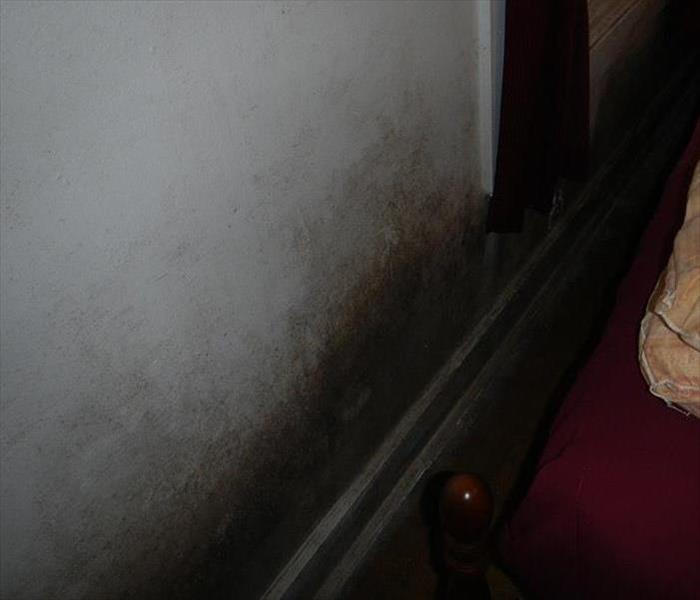 Be careful! Without proper training, you could be spreading mold throughout your home.
Be careful! Without proper training, you could be spreading mold throughout your home.
If you see visible mold, do not disturb it. You can inadvertently spread the mold infestation throughout your home. When mold is disturbed, the mold can release microscopic mold spores which become airborne and can circulate inside your home.
What to Do:
- Stay out of affected areas.
- Turn off the HVAC system and fans.
- Contact SERVPRO of Pitt/Greene Counties for mold remediation services.
What Not to Do:
- Don’t touch or disturb the mold.
- Don’t blow air across any surfaces with visible or suspected mold growth.
- Don’t attempt to dry the area yourself.
- Don’t spray bleach or other disinfectants on the mold.
About Our Mold Remediation Services
SERVPRO of Pitt/Greene Counties specializes in mold cleanup and restoration, in fact, it’s a cornerstone of our business. Our crews are highly trained restoration professionals that use specialized equipment and techniques to properly remediate your mold problem quickly and safely.
If You See Signs of Mold, Call Us Today – (252) 329-7205
 Fire damage in Greenville, NC can be devastating. Call the professionals at SERVPRO of Greenville to help!
Fire damage in Greenville, NC can be devastating. Call the professionals at SERVPRO of Greenville to help!




 24/7 Emergency Service
24/7 Emergency Service









































































